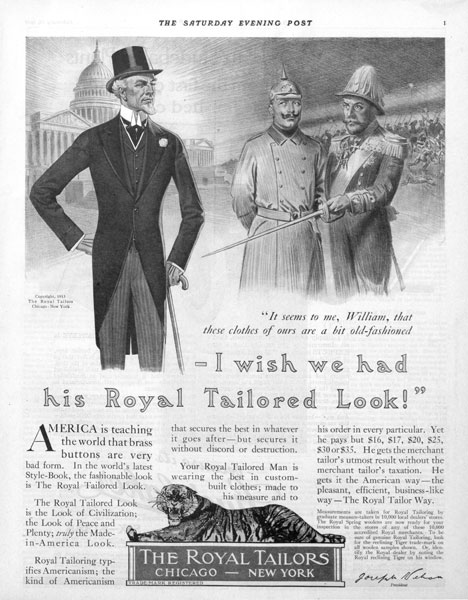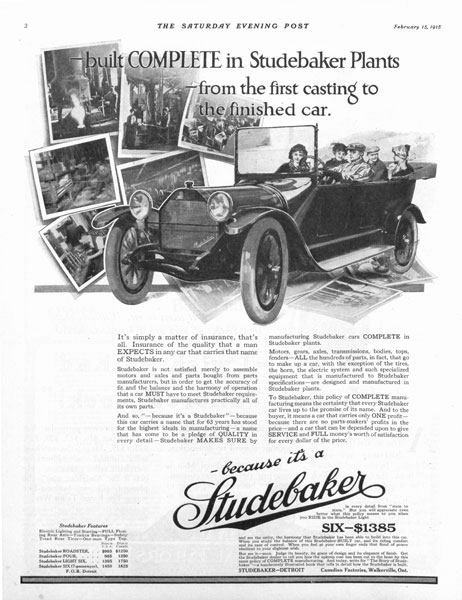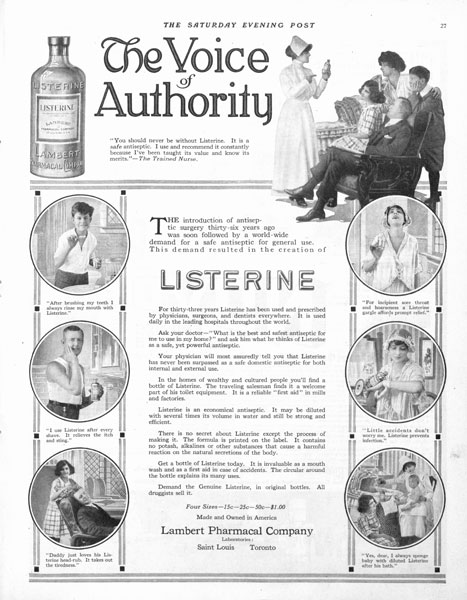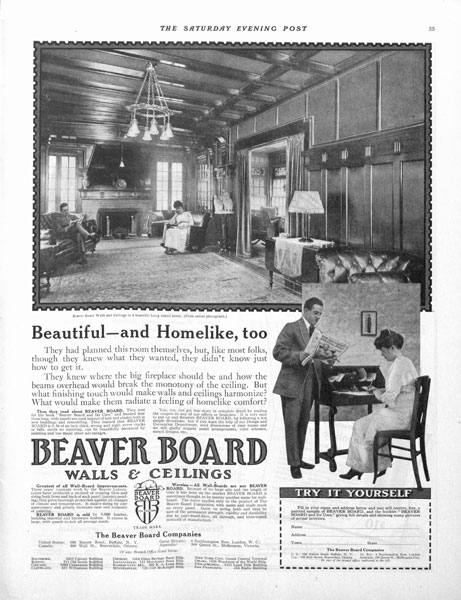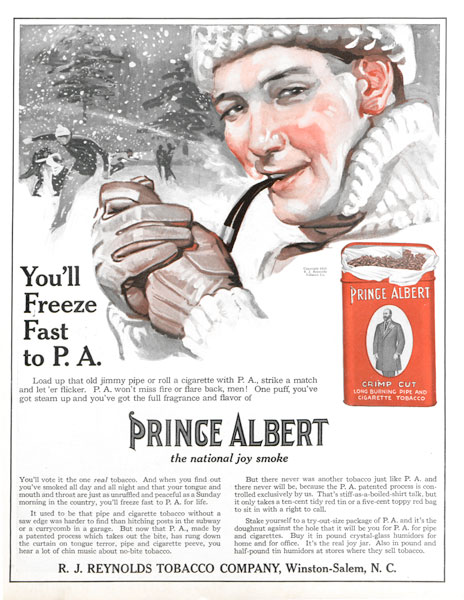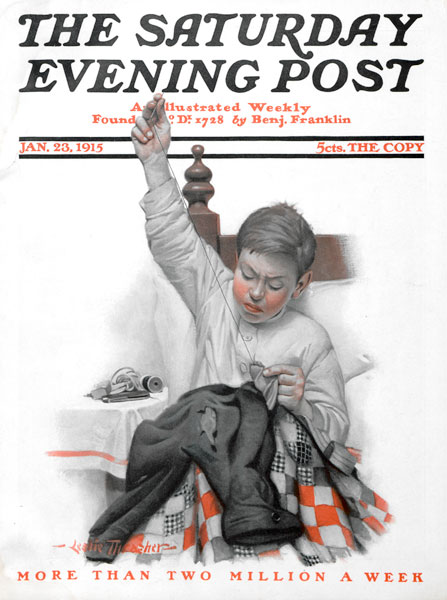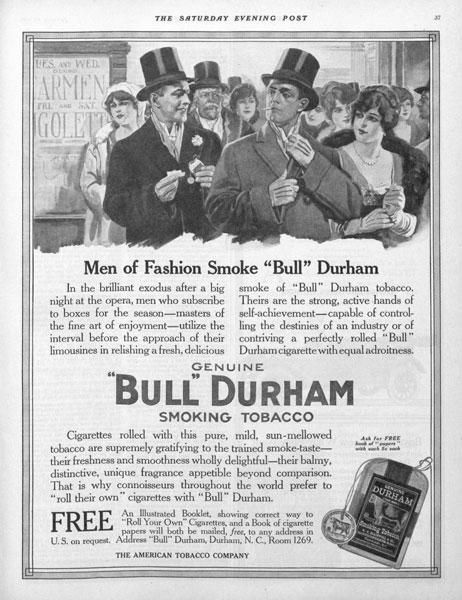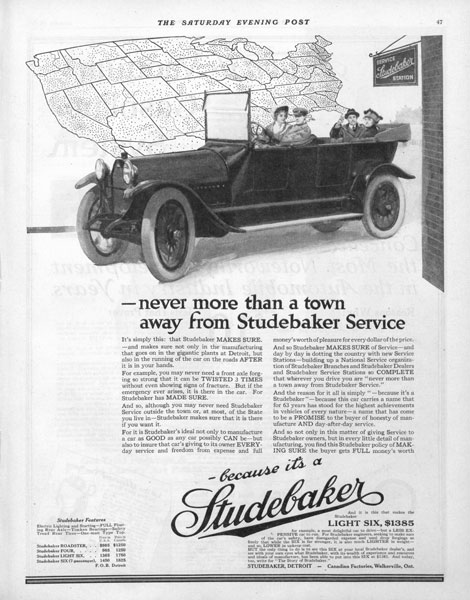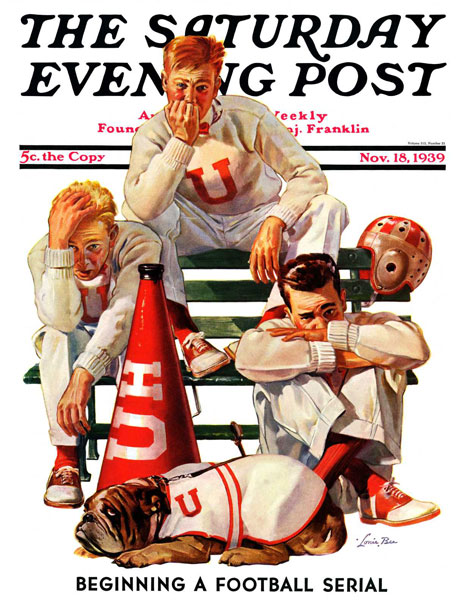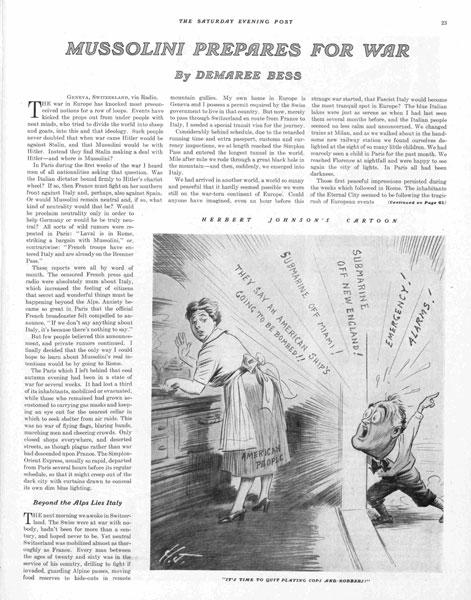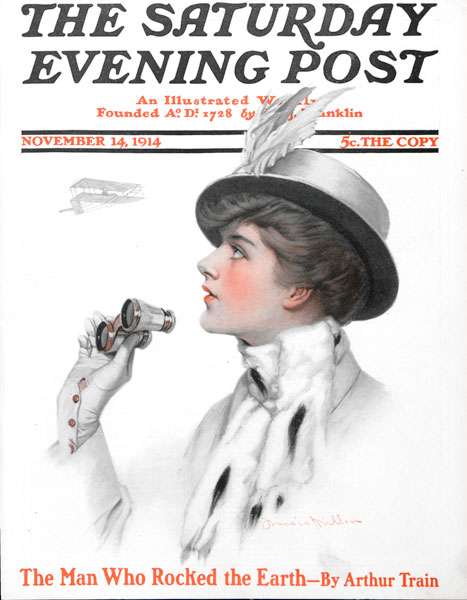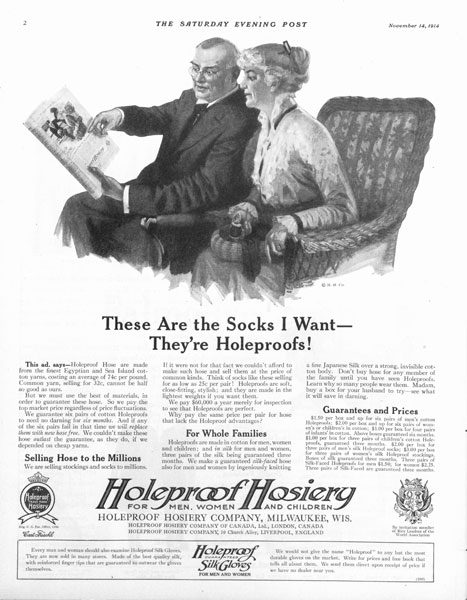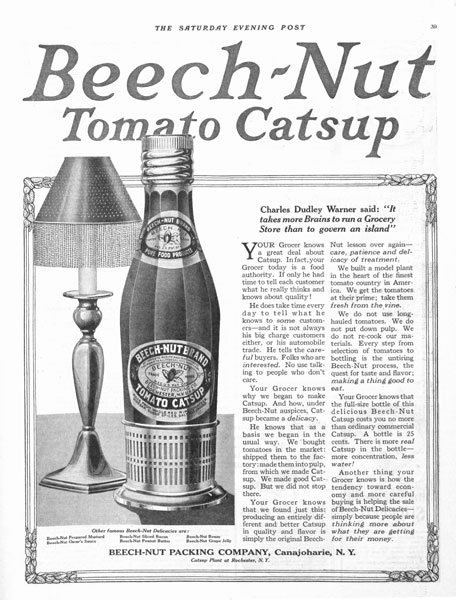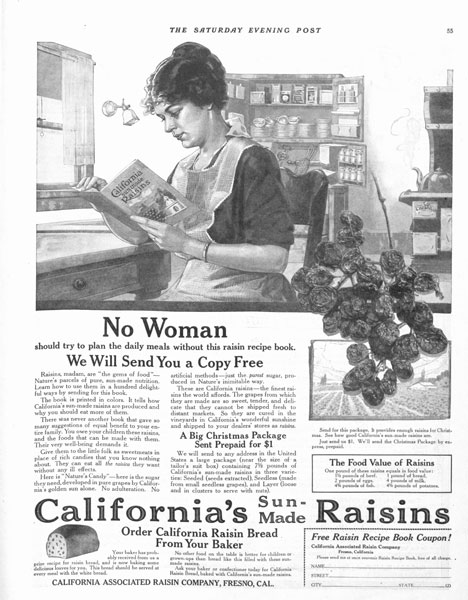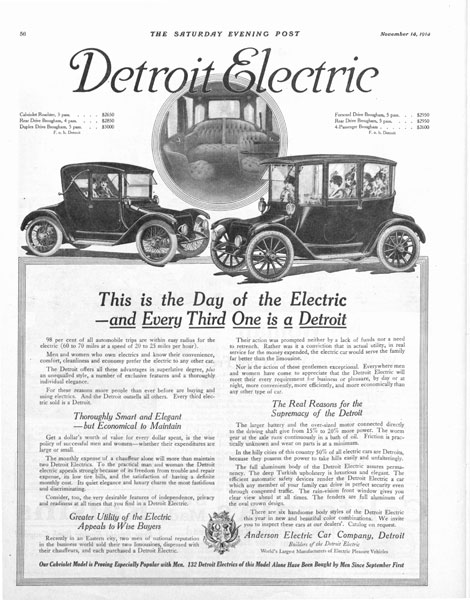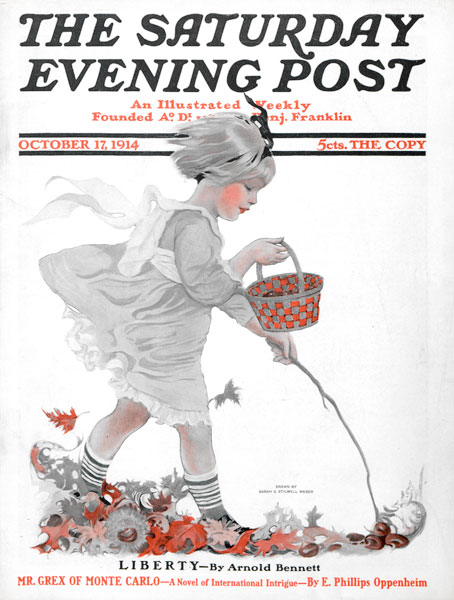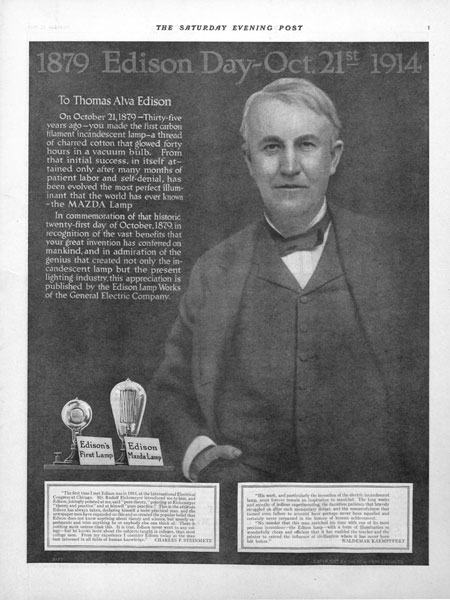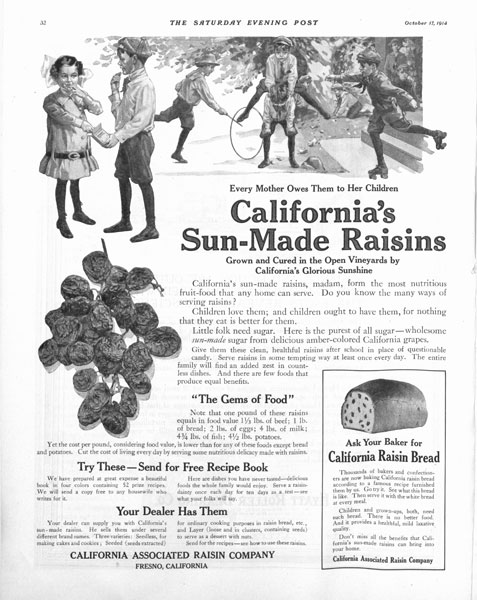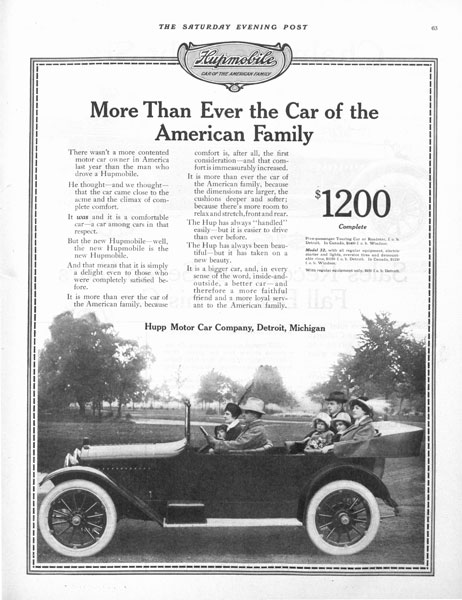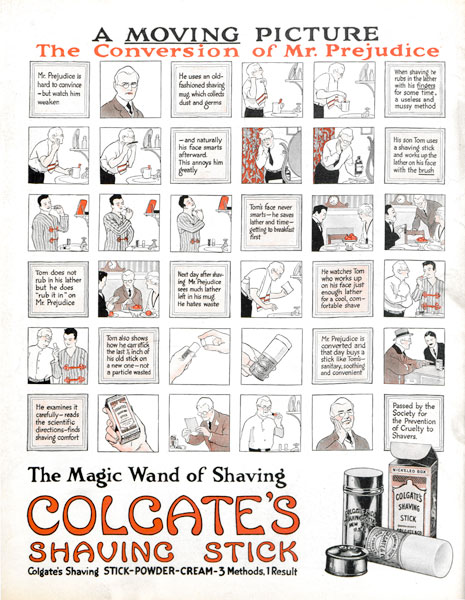The True Story of Kelly’s Heroes
When Kelly’s Heroes hit theatres 50 years ago this week, it came amid a run of incredible success for its star, Clint Eastwood. While the film was not his biggest that year (that would be Two Mules for Sister Sara), it earned mostly positive reviews, recouped its budget, produced a Top 40 hit with the song “Burning Bridges,” and went on enjoy cult status and a place on many lists of the best war films. Most of the negative reviews focused on the uneasy balance between violence and comedy, but Arthur D. Murphy’s dismissal of the film as “preposterous” in Variety is ironic in hindsight. It certainly might seem that the idea of American soldiers in World War II teaming up with German locals to steal gold behind enemy lines is a flight of fancy; the shocking thing is that part is absolutely true.
The trailer for Kelly’s Heroes. (Uploaded to YouTube by Movieclips Classic Trailers)
Kelly’s Heroes drew attention from the outset for the obvious reasons, like its cast. Eastwood’s star had been rising steadily for years, coming off of the Sergio Leone “Man with No Name” trilogy, WWII drama Where Eagles Dare, and other Westerns, while the following year would bring him The Beguiled, Play Misty for Me, and his most famous character in Dirty Harry. Kelly’s Heroes co-stars Telly Savalas and Donald Sutherland had both been standouts in The Dirty Dozen; Sutherland had also made a war picture mark in M*A*S*H earlier in the year. Don Rickles was, well, Don Rickles, and Carroll O’Connor was a tireless and familiar character actor one year out from his iconic turn as Archie Bunker.
The plot of the film follows Private Kelly (Eastwood) who discovers the existence of a cache of German gold after capturing a Wehrmacht intelligence officer. He assembles a misfit crew (including Sutherland’s tank squad), and the group makes a sustained effort to find and capture the gold. After fighting their way through a German tank blockade, the soldiers end up making a deal with the last German tank crew to share the gold. The characters split nearly $900,000 apiece and go their separate ways before they’re caught. And yes, something very similar to that actually happened.
The movies theme, Burning Bridges by The Mike Curb Congregation, went Top 40. (Uploaded to YouTube by The Mike Curb Congregation – Topic / Universal Music Group)
Writer Troy Kennedy Martin based the screenplay on an incident that he learned about from, of all places, The Guinness Book of World Records. “The Greatest Robbery on Record,” first listed in 1956 (and holding the spot until 2000), “was of the German National Gold Reserves in Bavaria by a combination of U.S. military personnel and German civilians in 1945.” MGM was so excited by the prospect that their head of production, Elliot Morgan, wrote Guinness for more information. Guinness’s understanding was that more details than that weren’t really available, possibly due to pieces of the story being classified. Martin used the entry as a starting point and wrote the screenplay.
However, the moviemakers weren’t the only intrigued parties. Ian Sayer is a British journalist, entrepreneur, and historian who has led an extremely colorful life. He founded a delivery service that helped pioneer overnight door-to-door delivery on the European continent. His work debunked fake Hitler diaries. And beginning in 1975, he started work on a book that would uncover the true story behind the gold heist.
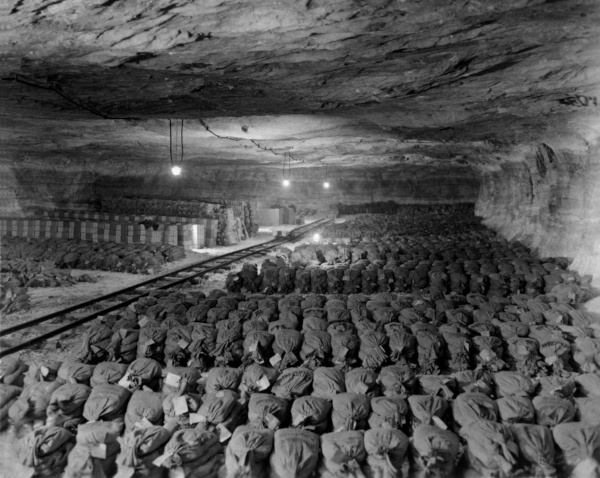
Sayer’s book with Douglas Botting, Nazi Gold: The Story of the World’s Greatest Robbery – And Its Aftermath finally saw publication in 1984 (a second version, Nazi Gold: The Sensational Story of the World’s Greatest Robbery – And the Greatest Criminal Cover-Up, was published in 2012). The books detail that the U.S. Government covered up the theft of millions in Nazi gold from the German National Gold Reserve in Bavaria. The heist was executed by members of the U.S. military cooperating with former German officers, including one-time members of the Wehrmacht and SS. When Sayer sent his information to the U.S. State Department in 1978, it set the wheels turning for an investigation that began in the early 1980s. Eventually, the U.S. recovered two of the gold bars, identified by Nazi-stamped markings, and announced the finding in a press release in 1997. The two bars were valued at over $1 million and eventually found their way to the Tripartite Commission for the Restitution of Monetary Gold, the body that recovers and redistributes the gold that was seized by the Nazis during the war.
There’s one final twist. In 1984, Sayer spoke to Members of Parliament in an effort to get information about Nazi gold held by the Bank of England. Jeff Rooker, an MP who he had spoken to on the matter, asked Sayer in 1988 to check out an aid fund to ensure that the money was getting to the veterans it was supposed to serve. It turned out that that the citizen who had asked Rooker about the aid fund had been a survivor of the Wormhoudt massacre, when 90 unarmed British troops were killed by the SS in 1940. The officer responsible for the slaughter was SS General Wilhelm Mohnke, who had also guarded Hitler’s bunker and disappeared after World War II. Amazingly, Sayer realized that he’d met Mohnke while researching Nazi Gold without realizing the man’s identity; Sayer informed the authorities, leading to investigations into Mohnke from multiple countries. He was never charged due to insufficient evidence, and lived until 2000.
Today, Kelly’s Heroes is regarded as a classic war film, noted for its ensemble, its humor, and its willingness to show the dark moments of war even among a more lighthearted story. But the story of the film rests atop a much more complex true story, elements of which still remain hidden from view. It’s a good reminder that even as much as we think we know about history, there are always some secrets, and maybe some gold, hidden somewhere.
Featured image: Shutterstock
“Come of Age” by B.J. Chute
Writing young adult fiction in Boy’s Life, Child Life, and Boy Scout Magazine, B.J. Chute’s work ranges from fantastical romance to silly farce. In 1944’s “Come of Age,” her short story about a young boy coping with the unimaginable, Chute depicts the innocence of World War II-era America alongside devastating grief in the eyes of a child. As a product of its time, the story gives a snapshot of idyllic family life interrupted by the horror of war.
Published on September 30, 1944
Content Warning: A racial slur
Timothy crossed the road at the exact place where the tar ended and the dirt began, paused on the sidewalk, squinted up at the sun and gave a heave of satisfaction. He was too warm with his sweater on. He had known he was going to be too warm, and he had made a firm announcement to this effect to his mother before he left the house in the morning. Thousands of layers of woolly stuff, he had pointed out darkly, intimating that a person might easily suffocate.
Having barely survived this fate so far, he now decided to make a test case out of it. If an automobile passed him on the road before he had counted up to ten, that meant it was really spring and too warm for sweaters. His own internal workings were positive on the subject, but he was amiably willing to put the whole thing on a sporting basis.
“One,” said Timothy. After a while he added, “Two.” He then suspended his counting while he made a neat pile of his schoolbooks and lunch box, putting them carefully on a bare patch of ground, away from the few greenly white sprigs of grass that were struggling up into the sunlight. If the car came by, he would have to put the books on the ground anyhow, in order to take off his sweater, so it seemed wiser to do it ahead of time.
“Three,” said Timothy, looking up the road. There was nothing in sight, so he closed his eyes, waited, said “Four” and opened them again. This time it worked. There was a car coming. Timothy put his hands to his sweater and stood pantingly prepared to jerk it over his head.
The car swished by with a friendly toot.
“Five-six-seven-eight-nine-ten,” said Timothy rapidly, just to be perfectly fair about the whole thing, vanished momentarily into the sweater and reappeared with his hair standing on end and the expression of one who had been saved from total collapse in the nick of time.
He turned the sweater virtuously right side to again, with his mother in mind, and tied its arms around his waist, allowing the rest of it to fall comfortably to the rear, where it could flap without giving him any sense of responsibility. Then he tucked his schoolbooks under one arm, picked up the lunchbox and peered hopefully inside it. There were three cake crumbs and some orange peel. He licked his finger, collected the crumbs on the end of it and disposed of them tidily, then extracted a piece of the peel and took a thoughtful nibble.
It tasted vaguely like a Christmas tree, but rather leathery, so he put it back, felt a momentary dejection based on a sudden desperate need for a great deal of food, recovered rapidly, took another look at the sun and gave a pleased snort.
It was certainly spring, and for once it was starting on a Friday afternoon, which meant he would have the whole weekend to get used to it in. Also, by some great and good accident, his sixth-grade English teacher had forgotten to assign the weekly composition. This was almost incredibly gratifying, especially since the rumor had got around that she had been going to give them the dismal topic of What My Country Means to Me.
Timothy sighed with satisfaction over the narrow escape of the sixth-grade English class, knowing quite well the same topic would turn up again next week, but that next week was years away. Besides, she might change her mind and assign something else. One week she had told them to write what she referred to as a word portrait, called A Member of My Family. Timothy had enjoyed that richly. He had written, inevitably, about his brother Bricky, and it was the longest composition he had ever achieved in his life. He felt a great pity for his classmates, who didn’t have Bricky to write about, since Bricky was not only the most remarkable person in the world but he was at that moment engaged in being a hero in the South Pacific. He was a pilot with silver wings and a bomber, and Timothy basked luxuriously in the warmth of his glory.
“Yoicks,” said Timothy, addressing the spring and life in general. “Yoicks” was Bricky’s favorite expression.
“Yoicks,” he said again.
He was, at the moment, five blocks from home. The first block he used up in not stepping on the cracks in the sidewalk, which was not the mindless process it appeared to be. He was actually conducting an elaborate reconnaissance program, and the cracks were vital supply lines. By the second block, however, his attitude on supplies had taken a more personal turn, and he spent the distance reflecting that this was the day his mother baked cookies. His imagination carried him willingly up the back steps, through the unlatched screen door and to the cooky jar, but there it gave up for lack of specific information on the type of cookies involved.
Besides, he was now at the third block, and the third block was important, consisting largely of a vacant lot with a run-down little shack lurching sideways in a corner of it. The old brown grass of last autumn and the matted tangle of vines and weeds were showing a faint stirring of greenness like a pale web.
At the edge of the lot, Timothy paused and his whole manner changed. He became alert and his eyes narrowed, shifting from left to right. He was listening intently. The only sound was the peevish chirp of a sparrow; but Timothy was a world away from it. What he was listening for was the warning roar of revved-up motors.
In a moment now, from behind that shack, from beyond those tangled vines, Japanese planes would swarm upward viciously, in squadron attack.
Timothy put down the books and the lunch box, then he stepped back, holding himself steady. His hand moved, fingers curved knowingly, to control and throttle, and from his parted lips there suddenly burst a chattering roar.
The Liberator surged forward gallantly to meet the attackers. Timothy’s face became tense, and he interrupted the engine’s explosive revolutions for a moment to warn himself grimly, “This is it. Watch yourselves, men.” He then nodded soberly. It was a grave responsibility for the pilot, knowing the crew trusted him to see them through.
The pilot, of course, was Bricky. It was Bricky who was holding the plane steady on its course, nerving himself for the final instant of action. The deadly swarm of Zeros swept forward, but the pilot’s face remained impassive.
Z-z-z-zoom, they spread across the sky, their evil advance punctuated by the hail of machine-gun fire. The Liberator climbed, settling back on her tail in instant response to the pilot’s sure hand. As she scaled the clouds, the bright silver of her name, painted along the side, shone defiantly — The Hornet. Bricky had at one time piloted a plane called The Hornet. It was the best name that Timothy knew.
After that, it was short and sharp. A Jap fighter detached itself from the humming swarm. The Hornet rolled and the tail gunner squeezed the triggers. The plane exploded in midair, disintegrated and streamered to earth in flaming wreckage.
“Right on the nose,” said the gunner with satisfaction.
The Hornet had their range now. Zero after Zero fluttered helplessly down out of the sky, dissolving into the earth. The others turned and skittered for their home base, terrified before the invincibility of American man and machine.
A faint smile flickered across the face of The Hornet’s pilot, and he permitted himself a nod of satisfaction. “Good show,” he said.
Timothy sat down on the ground and drew a deep breath. Then he said “Gosh!” and scrambled back to his feet. At home, even now, there might be a letter waiting from Bricky, full of breathless and wonderful details that could be relayed to the fellows at school. A few of them, of course, had brothers of their own in the Air Force, but none of them had Bricky, and that made all the difference. He was quite sorry for them, but most willing to share and to expound.
Gosh, he missed Bricky, but, gosh, it was worth it.
A dream crept across his mind. Maybe the war would last for years. Maybe some one of these days, a new pilot would stand before his commanding officer somewhere in Pacific territory and make a firm salute. “Lieutenant Baker reporting for duty, sir.”
His commanding officer would look up quickly from his notes. “Timothy!” Bricky would say, holding it all back. They would shake hands.
For the entire next block toward home, Timothy shook hands with his brother, but on the last block spring got into his heels and he raced the distance like a lunatic, yelling his jubilee. The porch steps he took in two leaps, crashed happily into the front hall and smacked his books and his lunchbox down on the hall table. He then opened his mouth to shout for his mother, not because he wanted her for anything specific, but because he simply needed to know her exact location.
His mouth, opened to “Hey, mom!” closed suddenly in surprise. His father’s hat was lying on the hall table. There was nothing to prepare him for his father’s hat on the hall table at three-thirty in the afternoon. His father’s hat kept regular hours. An unaccountable sense of formality descended on Timothy. He looked anxiously into the hall mirror and made a gesture toward flattening the top lock of his hair. It sprang up again under his hand, and he compromised on untying the sleeves of his sweater from around his waist and putting it firmly down on top of his books. None of this had anything to do with his father, who maintained strict neutrality on the subject of his son’s appearance. It was entirely a matter between Timothy, the time of day, and that unexpected gray felt hat on the hall table.
There were a dozen reasons for dad’s having come home early. There was nothing to get excited about. Timothy turned his back on the hall table and the hat, opened the door and went through into the living room. There was no one there, but he could hear his father’s voice in the kitchen, and, because the kitchen was a reassuring place, he felt better. He went on into the kitchen, shoving the door only part open and easing himself through it.
His mother was sitting on the kitchen chair beside the kitchen table. She was just sitting there, not doing anything. She never sat anywhere like that, doing nothing.
The formal, pressed-down feeling returned to Timothy and stuck in his throat.
He looked toward his father appealingly, but his father was leaning against the sink, with his hands behind him pressed against it, and staring down at the floor.
“Mom — ” said Timothy.
They both looked at him then, but it was his father who answered. He answered right away, as if it had to be said fast. “You’ll have to know, Tim,” he said, almost roughly. “It’s Bricky. He’s missing in action.” Missing in action. He had met the phrase so many times that it wasn’t frightening. There was no possible connection in his mind between “missing in action” and Bricky …
Missing in action. It was a picture on a movie screen, nothing more. Bricky, the invincible, would have bailed out, perhaps somewhere in the jungle. Or he would have nursed his damaged crate down to earth in a fantastically cool exhibition of flying skill, his men trusting him to see them through.
A hot, fierce pride surged up in Timothy. He wanted to tell his mother and father not to look that way; that Bricky, wherever he was, was safe. He wanted to reassure them, so that they would be smiling at him again and all the old cozy confidence would return to the kitchen.
His father was dragging words out, one by one. “The plane didn’t come back,” he said. “They were on a bombing mission, and they didn’t come back. We just got the telegram.”
An awful thing happened then. Timothy’s mother began to cry. He had never in his life seen her cry. It had never occurred to him that she was capable of it, and a monstrous chasm of insecurity yawned suddenly at his feet.
His father went over to her and got down on his knees on the kitchen linoleum, and he stayed there with his arm around her shoulders, murmuring, with his cheek against her hair, “Don’t, Ellen. Don’t, dearest.”
Timothy stood there in the middle of the floor with his hands jammed stiffly into his pockets and his eyes turned away from his father and mother. He was much more frightened by their sudden unfamiliarity than by what his father had told him. “Missing in action” was just words. His mother crying was a sheer impossibility, made visible before him.
He realized that he had to get out of the kitchen right away, because it was the place he had always been safest, and now that made it unendurable. He couldn’t do anything, anyway. Later, when his mother wasn’t — when his mother felt better, he could explain to her about Bricky being safe. He slid out of the room like a ghost, and, linked in their fear, neither of them even looked up.
In the front hall, he stopped for a moment. The spring sun outside was shining, bright and warm, on the street, and he knew exactly how the heat of it would feel slanting across his shoulders. But his mother had thought he ought to wear his sweater today. He wanted very badly to do something to make her feel better. He frowned and pulled the sweater on over his head, jamming his arms into the sleeves and resisting the temptation to push up the cuffs. It stretched them, his mother said.
He went slowly down the front steps, worrying about his mother. The words “missing in action” still meant exactly nothing to him. They were only another installment in the exciting war serial that was Bricky’s Pacific adventures, and there was not the slightest shadow of doubt in his mind about Bricky’s safe return, though he was eager for details. He guessed none of the other fellows at school had members of their family gallantly missing in action.
No, it wasn’t Bricky that made him feel funny in the pit of his stomach. The thing was he hadn’t known that grownups cried, and the discovery took a good deal of stability out of his world.
His mother might go on being frightened for days ahead, until they heard that Bricky was all right, and he would be tiptoeing around her in his mind all the time to make things better for her, and what he would really be wanting would be for things to be again the way they had been before.
He didn’t want to feel all unsettled inside. The way he felt now was the way he had felt the time they had been waiting to hear from his sister in California when the baby came. He had known quite well that Margaret would be fine and everything, but just the same, the baby’s coming had got into the house and filled it with uncertainties. Now it was the War Department. He was suddenly quite angry with the War Department. Bricky wasn’t going to like it, either, when he got back. He wouldn’t like mom worrying. Timothy wished now he had stayed a little longer in the kitchen and asked a few questions. He would have liked to know what that War Department had said, and, as he went down the street without any particular aim or direction, he turned it over and over in his mind.
He had walked back, without meaning to, to the vacant lot with the old shack on it, and it occurred to him that, while he had been shooting down those Jap planes in Bricky’s Hornet, his mother and father had been there in the kitchen. Looking like that.
He left the sidewalk and walked into the grassy tangle, scuffing his shoes through last autumn’s leaves. He would have liked some company, and he toyed for a moment with going over to Davy Peters’ house and telling him that the War Department had sent them a telegram about Bricky, but decided against it.
He sat down on the grass with his back against the wall of the shack. He could feel the rough coolness of the brown boards even through his sweater, and the sun spilled warmth down his front. It was unthinkable that the shack should ever be more comforting than the kitchen at home, but this time it was.
He wished he knew just what the telegram had said. There was something, he thought, that they always put in. Something about “We regret to inform you,” but maybe that was just for soldiers’ families when the soldier had got killed. He had seen a movie that had that in it once, and it had made quite an impression, because in the movie it was all tied up with not talking about the things you knew, and for days Timothy had gone around with a tightly shut mouth and the look of one who is giving no aid and comfort to the enemy. He had even torn the corners off all Bricky’s letters and burned them up with a fine secret feeling of citizenship, and then he had regretted it afterward, when he remembered it was only the United States APO address and no good to anyone. It was too bad, in a way, because they would have made a good collection. On the other hand, he already had eighteen separate and distinct collections, and the shelf in his room, the corner of the second drawer down in the living room desk, and the excellent location behind the laundry tub in the basement were all getting seriously overcrowded.
He wondered if maybe later he could have the telegram. He could start a good collection with the telegram, he thought. He would print on a piece of paper, “Things Relating to My Brother Bricky,” and paste it onto a box. He even knew the box he would use. It held his father’s golf shoes, but some kind of arrangement could be worked out for putting the shoes somewhere else. His father was very good about that sort of thing, once he understood boxes were really needed, and, later on, this one could hold all the souvenirs and medals and things Bricky would bring home.
The telegram, which maybe began “We regret to inform you,” would fit neatly into the box without having to be folded. It would go on with something about “your son, Lieutenant Ronald Baker,” and then there would be something more, not quite clear in his mind, about “He is reported missing in action over the South Pacific, having failed to return from an important bombing mission.”
Timothy scowled at a sparrow. There was another part that went with the “missing in action” part. Missing, believed — Missing, believed killed.
That was when it hit him. That was the moment when he suddenly realized what had happened — when the thing that the telegram stood for took shape clearly before him, not as something that had frightened his mother and made his father hold her very tight, but as something real about Bricky.
Bricky, his brother. Bricky, with whom he had sat a hundred times in this exact place and talked and talked, Bricky who went fishing with him, who showed him how to tie a sheepshank, who was going to help him build a radio when he came back.
“When he comes back,” said Timothy aloud, licking his lips because they had unaccountably gone dry. But suppose now that Bricky didn’t come back? Suppose that telegram was the end of everything?
It was the vacant lot and the shack that weren’t safe anymore. In the kitchen, he had known, without questioning it, that Bricky was all right. It was here, out in the open, that fear had come crawling. Bricky was dead. He knew Bricky was dead, and he was dead thousands of miles from anywhere, and they wouldn’t see him again ever.
Timothy sat there, and the pain in his stomach wasn’t anything like the pain you got from eating too much or being hungry. He rocked back and forth, not very much, but enough to cradle the sharpness of it, being careful not to breathe, because if he breathed it went down too far inside and hurt too much. If he could just sit there, maybe, not breathing
He couldn’t. There came a time when his lungs took a deep gulp of air without his having anything to do with it, and when that time came there was no way of holding out any longer.
Bricky was dead. He gave a great strangled sob and rolled over on his face, sprawling across the ground, and everything that was good and safe and beautiful quit the earth and left him with nothing to hold on to. He clung to the grass, shaking desperately with fear and pain and loss, and the immensity and the loneliness and the danger of being a human rolled over and over him in drowning waves.
Behind him, the shack, which only a little while ago had been a shelter for the sneak attack of Zero planes, was immobile and solid in the sunshine. It was only a shack in a vacant lot. The tumbled weeds and vines above which The Hornet had swooped and soared were weeds and vines, not a battleground for airborne knights.
It wasn’t that way. It wasn’t that way at all. It had nothing to do with a gallant plane, outnumbered but triumphant. It had nothing to do with the Bricky who had flown in his brother’s dreams, as safe and invincible as Saint George.
A plane was a thing that could be shot down out of the safe sky by murderous gunfire. Bricky was a man whose body could be thrown from the cockpit and spin senselessly down into cold water. It was a cheat. The whole thing was a cheat.
The war — this vague big thing that moved in shadowy headlines, in a glorious pageantry of medals and flags and brave men shaking hands — wasn’t that at all. He had thought it was something like the Holy Grail and King Arthur, that it shone with beauty and was very high and proud.
And it wasn’t. It was fear and this hollowed panic inside him, and it was not seeing Bricky again. Not seeing him again ever. That was why his mother had cried.
That was why his father’s voice had been so rough and quick. And it wasn’t to be endured. He breathed in shivering gasps, there with his face buried in cool-smelling grass and earth and the sun friendly and gentle on his shoulders that didn’t feel it anymore. It would go on like this, day after day and week after week. Bricky was dead, and the place where Bricky had been would never be filled in.
That was what war was, and he knew about it now, and the knowledge was too awful and too immense to be borne. He wanted his mother. He wanted to run to her and to hold to her tightly and to cry his heart out with her arms around his shoulders and her reassuring voice in his ears.
But his mother felt like this, too, and his father. There was no safety anywhere. No one could help him, except himself, and he was eleven years old. He didn’t want to know about all these things. He didn’t want to know what war really was. He wanted it to be a picture on a movie screen again, with excitement and glory and men being brave. Not this immense, unendurable fear and emptiness. He couldn’t even cry.
He was eleven years old, and he lay there face down in the grass, and he couldn’t cry. He groped for anything to ease him, and he thought perhaps Bricky’s plane hadn’t been alone when it crashed to the flat blue water. He thought that other planes might have been blotted out with it — planes with big red suns painted on them.
But even that didn’t do any good. There were men in those planes with the suns on them. Not men like men he knew, not Americans, but real people just the same. No one had told him that he would one day know that the enemy were real people, no one had warned him against finding it out.
He pressed closer against the ground, trying to draw comfort up from it, but he kept shaking. “Now I lay me down to sleep,” said Timothy into the grass. “Now I lay me down to sleep. Now I lay me — ”
It was a long, long time before the shaking stopped. He was surprised, at the end of it, to find that he was still there on the ground. He pushed away from it and sat up, his head swimming. The sun was much lower now, and a little wind had sprung up to move the vines around him so they swayed against the shack. The sweater felt good around his shoulders, and it was the sweater that made him realize suddenly that he couldn’t go on lying there waiting for the world to stop and end the pain.
The world wasn’t going to stop. It was going right on, and Timothy Baker was still in it. He would go on being in it, and the thing inside him would go on being the thing inside him. He would have, somehow, to live with that too. He would have to go back to the house, to the kitchen, to his mother and father, to school, to coming home and knowing that Bricky wouldn’t be there.
Timothy looked around. He felt weak and dizzy, the way he’d felt once after a fever. The shack was there, with no Jap Zeros behind it. The place where he had stood when he was being Bricky and The Hornet was just a piece of ground. His mouth drew in, with his teeth clipping his lower lip, while he stared. There wasn’t any escape. He would have to go back — along the sidewalk, up the path, through the front door, into the hallway, into the living room, into the kitchen. There wasn’t any escape from his mother’s eyes or his father’s voice. He knew all about it now, and he was stiff and sore from knowing about it.
He saw what he had to do. He had to go home and face that telegram. He got to his feet. He brushed off the dry bits of grass that had clung to the blurred wool of his sweater, and he pulled the cuffs around straight, so they wouldn’t be stretched wrong. Then he walked across the grass, out of the lot and onto the sidewalk, holding himself very carefully against the pain.
He held himself that way all the distance back, and when he got to his own front yard he was able to walk quite directly and quickly up the path and up the steps. He turned the doorknob and he went into the front hall. It was getting darker outdoors already, and the hall was dim. It was a moment before he realized that his father was standing in the hallway, waiting for him.
He stopped where he was, getting the pieces of himself together. He wasn’t even shaking now, and some vague kind of pride stirred deep down inside him.
He said, “Dad” dragging the monosyllable out.
“Yes, Timmy.”
“May I see the telegram, please?”
His father reached into his pocket and took out the brown leather wallet that he carried papers around in. The telegram was on top of some letters and bills, and it was strange to see it already so much a part of their living that it was jostled by business things.
Timothy took the yellow envelope and opened it carefully. There it was. “Lieutenant Ronald Baker, missing in action.” The stiff formality of the printed words made it seem so final that he felt the coldness and the fear spreading through him again, the way it had been at the shack. His mind wanted to drag away from the piece of paper, and he had to force it to think instead.
With careful stubbornness, he read the telegram again. It wasn’t really very much that the War Department said — just that the plane had not returned and that the family would be advised of any further news. He read the last part once more. Any further news. That meant the War Department wasn’t sure what had happened. Bricky might have bailed out somewhere. There had been stories in the newspaper about fliers who bailed out and were picked up later. That was a hope. Timothy weighed it carefully in his mind, not letting himself clutch at it, and it was still a hope. It was a perfectly fair one that they were entitled to, he and his father and mother.
He held his thoughts steady on that for a moment, and then he made them go on logically and precisely. Another thing that could have happened was that Bricky had gone down somewhere over land that was held by the Japanese. If that was it, Bricky might be a prisoner of war. Prisoners of war came back. That was another hope, and it was a perfectly fair one too.
He had two hopes, then. They were reasonable hopes, and he had a right to hang on to them very tightly. The telegram didn’t say “believed killed.” Frowning, he went through it in his head again, adding up as if it were an arithmetic problem. There were three things that the telegram could mean. Two of them were on the side of Bricky’s safety, and one was against it. Two chances to one was almost a promise.
Timothy drew a deep breath and handed the telegram back to his father. His father took it without saying anything, then he put his hand against the back of Timothy’s neck and rubbed his fingers up through the stubbly hair. For just a moment, Timothy turned his head, pressing close against the buttons of his father’s coat, then he pulled away.
“Can I go outdoors for a little while?” he said.
“Sure. I guess supper will be the usual time.”
They nodded to each other, then Timothy turned and went out of the house. He went down the steps, his hands jammed in his pockets, and began to walk along the sidewalk, feeling still a little hollow, but perfectly steady.
His heart fitted him again. It had stopped pounding against the cage of his ribs, and it didn’t hurt anymore. The old feeling of safety and comfort was beginning to come back, but now it wasn’t a part of his home or of the day. It was inside himself and solid, so that he couldn’t mislay it again ever. He pushed his hair away from his forehead, letting the wind get at it. The air was cooler now and felt good, and he had a vague moment of being hungry.
Then he looked around him. He was back at the vacant shack, and the shack had been waiting there for him to come. He eyed it gravely. Behind the shack were the Jap Zeros. They had been waiting for him too. He knew they were there and that their force was overwhelming. Timothy’s fingers reached automatically for the controls of his plane. His jaw tightened and his eyes narrowed, and he opened his mouth to let out the roar of motors.
And, suddenly, he stopped. His hand dropped down to his side and his mouth shut. He stood there quite quietly for a moment, as if he had lost something and were trying to remember what it was. Then he gave a sigh of relinquishment.
His fingers curled firmly around air again and closed, but this time they didn’t close on the controls of a machine. They closed on dangling reins.
“Come on, Silver, old boy,” said Timothy softly to the evening. “They’ve got the jump on us, but we can catch them yet.”
He touched his spurs to his gallant pinto pony, and, wheeling, he loped away across the sunlit plain.
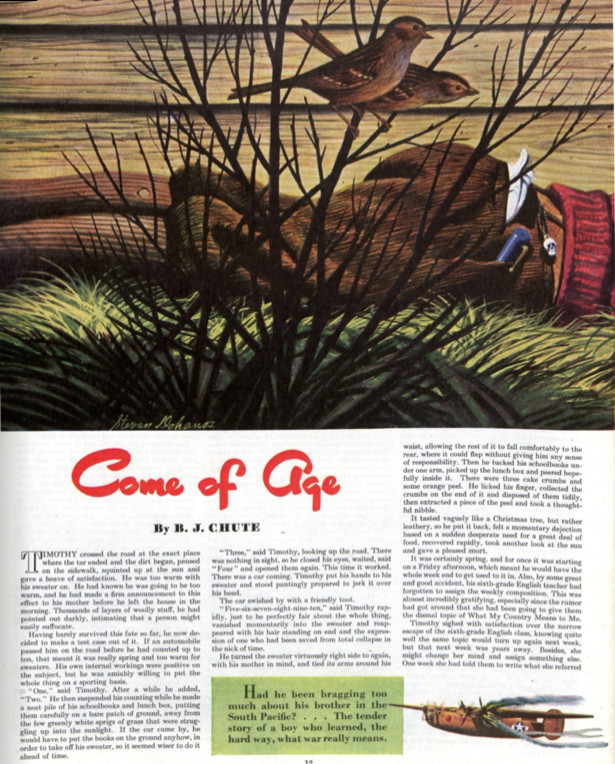
Featured image: Illustration by Stevan Dohanos (© SEPS)
Considering History: Post-9/11 Lessons from America’s Forgotten War in the Philippines
This series by American studies professor Ben Railton explores the connections between America’s past and present.
The effects of the September 11, 2001, terrorist attacks have defined much of American society over the subsequent two decades. From the creation of new government agencies like the TSA and the Department of Homeland Security (and within it the increasingly visible ICE) to the rise of a ubiquitous surveillance state to countless pop culture texts, 9/11’s influences have been both broad and deep. One of the most significant such effects was also one of the first: the war in Afghanistan, which began on October 7, 2001 as a focused mission to find those responsible for the attacks but evolved into America’s longest war, passing Vietnam for that title in 2010.
Yet while the conflicts in Afghanistan and Vietnam are indeed two of America’s longest foreign wars, there’s another, far less well-remembered contender for that title: the late 19th and early 20th century war of occupation in the Philippines. That controversial war deserves far more of a presence in our collective memories, for its own sake but also for the lessons it can impart about post-9/11 America.
The Philippine-American War emerged directly out of the 1898-99 Spanish-American War, a somewhat more familiar conflict that would likewise be importantly reframed by the war that followed it. After all, the U.S. victory in the Philippines in the Spanish-American War depended on Filipino anti-Spanish revolutionaries, a longstanding group of independence fighters led by the charismatic exile Emilio Aguinaldo y Famy. Much like the CIA worked with the mujahideen (direct predecessors to Al Qaeda and the Taliban) in Afghanistan against the Soviets, the U.S. capitalized on these anti-imperial forces in their opposition to the Spanish in the Philippines.
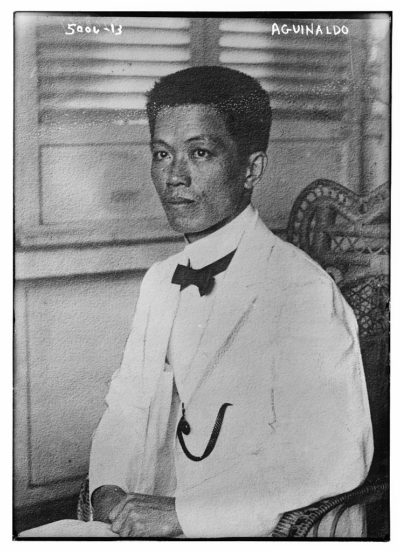
But Aguinaldo and his fellow revolutionaries had their own goals for their country, ones that preceded U.S. involvement, and they began pursuing them even while the Spanish-American War was still unfolding. After Aguinaldo and his forces defeated the Spanish at the May 1898 Battle of Alapan, he raised for the first time a Filipino flag (sewn in Hong Kong during Aguinaldo’s time in exile there). A few weeks later, Aguinaldo issued a Declaration of Philippine Independence and named himself the first President of the Philippine Republic. The U.S. government refused to acknowledge either those actions or that independent nation, however, setting up an extended conflict once their wartime need for Aguinaldo and his forces ended.
In January 1899, as the Spanish-American War neared its conclusion, President McKinley created a commission (known both as the First Philippine Commission and the Schurman Commission) to investigate conditions in the Philippines and make a recommendation about both the nation’s future and the U.S. role there. But given that the five-member commission featured both Admiral George Dewey (one of the war’s military leaders) and Elwell Otis (the U.S. Military Governor of the Philippines), its conclusions seemed preordained. And indeed, the Schurman Commission came to the conclusion that Filipinos were not ready for independence or self-governance and needed further U.S. presence in the islands to pursue those ends, a perspective that echoes closely the “bringing democracy to the world” narrative that fueled the post-9/11 wars in both Afghanistan and Iraq.
This evolving narrative of the U.S. presence in the islands meant that when the Spanish-American War’s official purpose (liberating the Philippines from Spanish rule) had been achieved, a second, far more extended and bloody war between local forces and occupying U.S. troops commenced. That second conflict began even before the Treaty of Paris between the U.S. and Spain took effect, with the first shots fired between Filipino insurgents and U.S. forces on February 4, 1899 (in what came to be known as the First Battle of Manila), two days before that peace treaty was signed. Many of those Filipino insurgents, like their leader Aguinaldo, had been U.S. allies throughout the war. But just as was the case in Afghanistan and Iraq, as the U.S. forces’ purpose evolved from liberation to occupation, these rebels became obstacles to that ongoing mission.
Thus as was the case in Afghanistan and Iraq, and in Vietnam before them, this became a war of occupation and insurgency, a conflict in which every Filipino was potentially an adversary or at least involved in aiding the revolutionaries fighting against the U.S. forces. That fraught fact meant that every encounter between U.S. troops and Filipino citizens was shadowed by this ongoing conflict, and it concurrently led the U.S. occupying forces to treat all Filipinos as hostile, with destructive effects on both the collective level (such as the destruction of villages) and the individual one (such as the use of torture on perceived enemy combatants, including waterboarding). All of which only pushed more and more Filipinos toward the insurgent cause and reinforced the U.S. as an occupying force in the islands (rather than a liberating presence or a force for democracy).
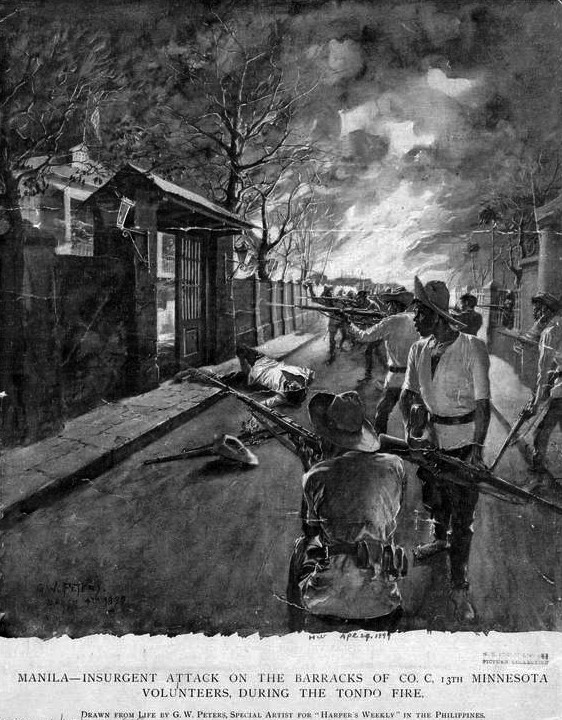
All those factors contributed to a long, violent conflict between U.S. forces and insurgents. The Philippine-American War officially ended in 1902, but that was just because Aguinaldo had been captured in March 1901 and his allies gradually surrendered over the subsequent months; more than 4,000 U.S. soldiers and more than 20,000 Filipino combatants (and hundreds of thousands of Filipino civilians) died in these first three years of conflict. Filipino insurgents continued fighting U.S. forces in what came to be known as the Moro Rebellion for another decade, only surrendering in 1913. This 15-year war offers vital lessons about what it means to be an occupying force, how a history of realpolitik relationships with revolutionaries can lead to future entanglements, and how a seemingly straightforward military objective can shift through a combination of idealistic and imperialistic factors into a brutal war of occupation and insurgency.
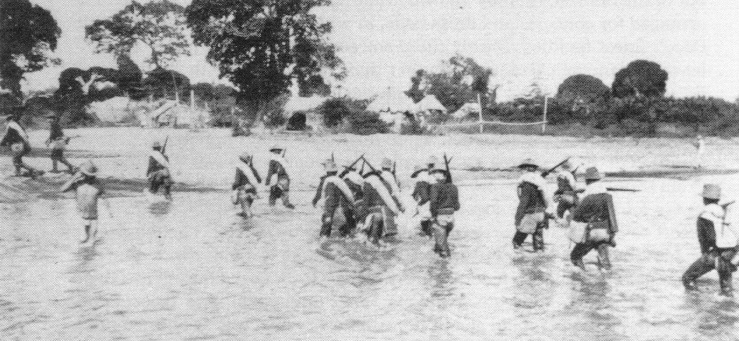
But there are additional lessons from this forgotten long war that are perhaps even more salient for 2019 America. Because of the U.S. occupation, many Filipinos immigrated to America, building on what was already the nation’s oldest Asian-American community but greatly amplifying it in the first decades of the 20th century. These Filipino Americans became hugely significant to every aspect of American society: contributing to the military, like the first Filipino West Point graduate and World War I and World War II hero General Vicente Lim; to civic life, like Agripino Jaucian and the Filipino American Association of Philadelphia, which offered vital medical treatment during the 1918 influenza epidemic; and to activist efforts, like Pablo Manlapit and the ground-breaking Filipino Labor Union in Hawaii.
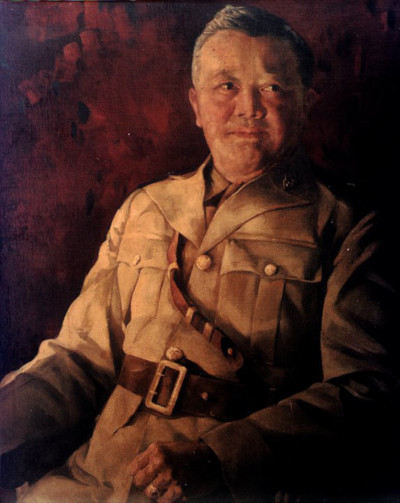
But this expanding early 20th century Filipino-American community also faced white supremacist xenophobia and prejudice. They were the target of hate crimes and racial terrorism, such as the Watsonville, California “riots” of 1930 in which an entire Filipino-American neighborhood was destroyed. And they were the subject of multiple national exclusionary laws: first redefined as legal “aliens” by the 1934 Tydings-McDuffie Act despite the U.S. occupation of their nation (ironically, the law granted the Philippines eventual independence in order to make that redefinition possible); and then subject to an overt campaign to forcibly remove all 120,000 Filipino Americans back to the Philippines with the 1935 Filipino Repatriation Act.
In 2019, we see many of those same histories playing out when it comes to Arab and Muslim Americans: hate crimes are once more on the rise (as they were in the years after 9/11) against these longstanding American communities; and legal attempts to restrict Muslim immigration are taking place, including ones targeting wartime allies like Afghan and Iraqi military interpreters. These recent events provide one more reason to better remember the histories and legacies of the forgotten Philippine-American War, and to heed the lessons it offers for post-9/11 America.
Featured image: Philippine insurgent soldiers, 1899 (U.S. Army Signal Corps via Wikimedia Commons)
The Heroism of Women in the Boer War
When news came that the Boer women of South Africa were fighting alongside men in their war against the British, the Post applauded.
In war’s long, dreary hours of waiting, the quality of character that can endure quietly represents the very highest bravery that human nature is capable of, and in this greater heroism woman has almost a monopoly.
In their heroism, women are always better than men.
And it’s not only in great things that woman shows her nerve. The other day in Naples, two Boston ladies were leaving a shop. A man seized the purse of one of them, whereupon she took him by the throat, gave him a good shaking, slammed him upon the ground, recovered her property, and then in her cool New England way told him to move on. We can scarcely pick up any newspaper without finding a story of a woman capturing a burglar, stopping a runaway, or doing something of the instant sort that is the very essence of nerve; and we should not forget in this category the Connecticut widow who, although dreadfully afraid of mice, upon finding a lion from Mr. Barnum’s show in one of the stalls of her stable, deliberately whipped the beast away and sent him cowering down the road.
– “The Heroism of Women,” editorial by Lynn Roby Meekins, April 21, 1900.
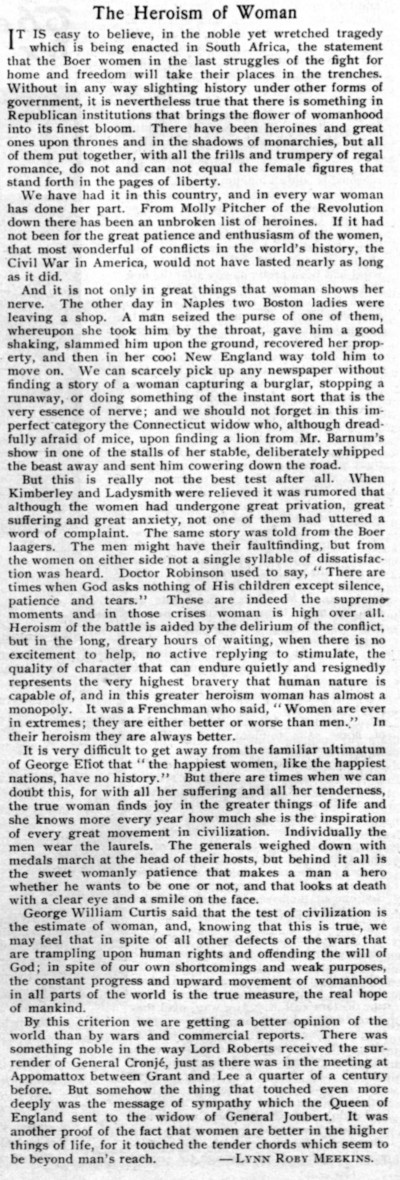
Featured image: SEPS.
“The Old People” by Ida Alexis Ross Wylie
I.A.R. Wylie spent her childhood on long solo trips bicycling around the English countryside and cruising in Norwegian fjords. The “keen suffragist” published fiction furiously in England and the U.S., and many of her works, like Keeper of the Flame, were adapted into major films. Her 1926 story “The Old People,” set in 19th-century Bavaria, imparts the personal and political aspects of war, as an elderly couple who has lost everything struggles for a meager legacy against a brutal Italian officer.
Published on April 17, 1926
Trumpets. Even Andreas Hofner, who was very deaf, heard them. It was less a sound than a sudden burst of sunlight in the gray winter stillness. The trumpets were blown vigorously but rather unevenly, as though the trumpeters were running, and the faint unsteadiness gave the long blast a thrilling passionate quality, like the break in a human voice. Old Andreas heard it quite distinctly. He looked up from the wooden shield he was carving, absently dusting away some of the delicate shavings that had gathered under his hand, and took off his spectacles as though to listen better.
“Soldiers,” he said aloud.
He stood motionless. In the kitchen next his workshop, Maria, his wife, was clattering busily. He could not hear her, but he knew she was there and he knew that she would be clattering, because it was nearly time for the midday meal. And in the old days, when his hearing had been keen as a hunter’s, he had often smiled to himself, listening to her and thinking how she loved the crisp, clean clatter of her shining copper.
“Maria!” he called in his deep grumbling voice.
But she paid no attention, and he went slowly, with the heaviness of a great strength that has begun to fail, to the inner door. He opened it and the pleasant fragrance that greeted him was like a sound too. It made the fading blue eyes under the thick white brows twinkle. For a moment he forgot what he had wanted to say to her.
“Alterchen, there is something here that smells good.”
“You may well say so,” his wife shouted back cheerfully. “Leberwurst and Spezzel — that’s what it is.”
“Is it a feast day then?” Andreas asked doubtfully.
“Maybe it is. There are so many people on the streets you would think so. Look at them now.”
She pointed a twisted energetic old finger at the window under the smoke-blackened beams, and sure enough the townspeople were moving past in a slow stream. They did not look in as they usually did when they had time to spare. Their faces were grave and anxious, and when Maria Hofner tapped at the panes even Johann Kirsch, who was the Bürgermeister and Andreas’ oldest friend, only nodded hastily and hurried on.
“Perhaps someone has died,” Maria reflected. “But I don’t know who it could be. It is true that Gottfried Baum has had the fever for this last week
“If it had been Gottfried Baum,” Andreas interrupted severely, “I should have been the first to know. The relatives would have sent for me at once. Who else should make his coffin for him? Didn’t he always say, ‘There is no one who can handle wood like Andreas’?”
“It is true, of course,” Maria murmured soothingly. He could not hear her, but he had learned to read her lips.
“It was Gottfried who spoke up for me in the council. He said, ‘No one has a greater claim than Andreas. Andreas lost five sons. And he is the greatest craftsman in Windstättl. He will carve us the finest memorial in the whole of the empire.’”
“They say there isn’t an empire anymore,” Maria broke in. “I don’t understand what they mean, but they say there is no emperor.”
“People chatter a lot of nonsense,” Andreas retorted sternly. “What do the people here know about politics? They hear rumors and they make up fairy tales. If they worked harder they would have more sense.”
He stood watching her, his hand twisted in the short curly white beard that made him look like one of the shepherds that he had carved into the altarpiece for the parish church. These fits of dreaming had grown more frequent of late. While he worked at the memorial he had dreamed — so vividly that once or twice he had looked up and called a name; each time it had been Fritzchen because Fritzchen had been his favorite — and had waited with a thickly beating heart for a door to open. And it took time for him to remember that he was an old man and that Fritzchen and Albert and Kurt and Hans, and even baby Andreas, were all dead.
Maria bustled about. She was the very opposite of her husband. When she had been a girl she had been called the fairy of Windstättl because of her slender figure and tiny hands and feet, and at their marriage the town wits had made jokes about her and Andreas, who could have crushed her with one hand. As a matter of fact, he was very gentle and had never hurt anyone in his life. But all that had changed. The five sons had come and the war had taken them away, and pretty Maria Hofner had become an old misshapen woman, with a bent back and twisted feet that had lost their spring, and a shriveled, hard-bitten little face. But she had plenty of life left. All her movements were quick. She was like a little old sparrow hopping about the dim kitchen.
“Listen!” Andreas commanded.
Maria stopped with the lid of a saucepan in her hand. Yes, there it was again. She had heard it the first time — trumpets. Only this time they sounded nearer and had a harsh, exultant note that hurt the ears.
“Soldiers!”
“There are no soldiers,” Maria protested. “All the soldiers have gone away. Perhaps it is the Schültzenverein making an outing. What day of the year is it, Andreas?”
Andreas Hofner looked at the gaudy calendar that hung by the door. He tore off the forgotten leaves with his thick, strong fingers.
“Saint Hubert’s Day,” he told her.
Maria clucked her satisfaction.
“There then! Of course it’s the Schültzenverein. He’s their patron saint. But why they should make such a noise about it or why anybody should bother about them, goodness knows.”
Andreas went back to his work. Very soon the winter’s light would begin to fail and there was still the lettering to be finished. He had three days left, but his hand had lost something of its steadiness and he had to go slowly. One slip and the work of months might he spoiled. Andreas took the edges of the shield in his hands and bent over it, brooding on each strong, delicate line that for him represented a thought. He had never been outside Windstättl, but he knew in his heart that this was a noble thing that he had made — finer than the altarpiece, finer even than the Christ that from the top of the pass watched over the little town. In a small space Andreas had carved the majesty of the mountains, and at their feet slept a dead Austrian soldier. His face was lifted to the sun that rose just behind the topmost peak of the Königsberg, and even in miniature the peace of its expression was a thing for wonder and pity. Anyone who had known Fritz Hofner would have recognized him.
Fritz and Albert and Kurt and Hans and baby Andreas lay in the crowded military cemetery under the shadow of Königsberg, on whose bitter heights they had fought and died. The place was forlorn and neglected, because the people were too poor even to bring wreaths; and it was Andreas who had cut the simple white crosses and carved in the names and the regimental numbers of the dead heroes. But this was to be their true memorial. On Sunday he would nail it with his own hands to the Rathaus amidst the solemn prayers of the people. So long as the Rathaus stood, Fritz and Albert and Kurt and Hans and baby Andreas would never be forgotten.
Maria came in and stood beside him. A quietness settled about them both, so that they no longer heard the trumpets or the rush of feet. They were alone together. Maria pointed her stiff old finger.
“Für’s Vaterland,” she read aloud. “Ei, that’s got a grand sound to it, Alterchen, and only one more letter left to do.”
He nodded gravely. “It will be finished. I have worked night and day that it should be finished.”
“Ei, but everyone will be pleased when they see it. There isn’t another town in Austria that’ll have such a memorial. It’ll put heart into everyone. When they go past it people will lift their heads again.”
“No one has lost so much,” Andreas said. He said it proudly. Pride had been the only thing that had upheld him. When Fritzchen went — he was the last, swept away with a hundred comrades in an avalanche — the emperor himself had telegraphed. Everyone in Windstättl had seen the telegram. Such a thing had never before happened, and from then onward Andreas and Maria, with their five dead sons, had been set apart.
“There is to be a band,” Maria went on, “and the fire brigade from Eulensee is sending a deputation in uniform, and the bishop is to give the benediction from the Rathaus window. Oh, if they could only see it — the five Buberle — they would be proud too!”
Someone was rattling desperately at the door. Whoever it was was so frightened that they didn’t realize the door wasn’t locked. Maria opened it impatiently. A storm of noise seemed to rush past. There was Elsa, Kurt’s young wife, leaning against the jamb, wide-eyed and panting, her shawl clutched about her and her face grown old.
“Elsa, in Gottes namen what has happened?”
“Haven’t you heard, Mutterle? It’s the Italians — the Italian soldiers. They’ve come over the pass — they’re coming now — hundreds of them!”
She almost screamed, so that her voice sounded like one of the trumpets. The room was full of tumult. It was as though a tidal wave had burst in through the open door and was swirling against the walls, destroying, devastating.
But Andreas held himself steady. He made a proud sweeping gesture with his great arm.
“It’s not true,” he said. “You’re crazy, Elsa, my girl. The war is over. The Italians never came over the Königsberg. We saw to that. Our five sons — ”
Even as he spoke, the Bersaglieri swept past the window. They came at their historic trot, their plumed hats, at a gallant angle, flowing in the gray winter’s wind, their dark intent faces alight, their trumpets shouting.
Andreas strode to the door. “I tell you the war is over,” he said sternly. “It is a mistake. They’ve no right — ”
He was thrust back. The trumpets caught his protest on their hard, shining points of sound and tossed it aside. And Elsa, Kurt’s wife, who was with child, broke into bitter, terrified weeping.
II
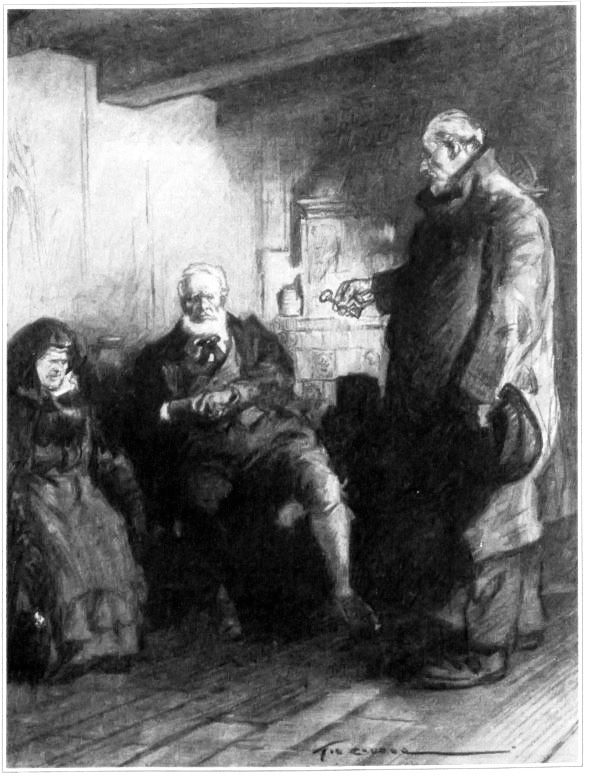
The General Beppo Volpi rode with his aide-de-camp down the mountain pass and talked comfortably of old times. The winter’s sun had gone down behind the mountains, and the winding road, still torn by the passage of heavy military traffic, was steeped in cold gray shadow. But the peaks of the Königsberg blazed. The general, wrapped in his wide cloak, pointed at them. Though he was an old man, he had good eyesight; and besides, he knew what he could not see.
“That was my dugout,” he said; “there, on the left where the peak is forked. Twice we lost it and twice we won it back. The last time it came to a hand-to-hand struggle and the place was like a charnel house, so full of dead you could hardly move. And the cold — I shall never forget the cold — never, never. Sometimes I felt like a dead man myself; my limbs wouldn’t move. These mountains, which look so beautiful to you, my dear Strazzi, and over which the tourists will soon be swarming, picking up souvenirs, became to us demons semi-human, monstrous torturers. We cursed them, for every foothold cost us blood and agony. But we held on. If it hadn’t been for the peace we’d have taken this damned little rats’ nest at the point of the bayonet.”
“Doubtless,” the aide murmured politely. “The peace came too soon. We could have taught them a lesson.”
“We shall teach it them yet,” the general said, smiling under his gray mustache.
The two men fell silent. The aide was thinking of Rome, whence he came and which would be enjoying its first festivities since the war. It was hard luck. The prospect of spending the next months in this miserable village made him feel more than ever cold and discouraged. But the general was remembering his youth.
“You Romans don’t understand,” he said presently, as though he had guessed his companion’s thoughts. “I was born in Sedena — Kleinstadt they called it — in Italia Irredenta. We were Italians, every man of us, and we dared not even speak our own tongue. They had their heels on our necks and there was nothing for it but to set our teeth and wait. No, you couldn’t possibly understand what it means to me.”
He was a very handsome old man, very upright, with the fine, aquiline features of his race. But the aide, glancing shyly at him, thought involuntarily of the peaks that were now cold and gray as corpses. There was something deathlike in the implacable figure riding beside him. All very well to play avenger and conqueror, but as for the young aide, he would rather have danced at the Quirinal. He glanced up, however, courteously following his superior’s eyes. Though he had been in the war himself, it was hard to believe that men had actually lived and fought on these sinister and threatening heights.
In the shadow of the mountains, but far back from the road, they passed a walled-in space. In the center was a huge, roughly built cross, and at its feet, nestling like sheep at the feet of a shepherd, were hundreds of little crosses. Very ghostlike they looked in the shrouding twilight. The big cross had not been planted strongly enough to withstand the winter’s storms, and was bowed to one side in an attitude of sorrowful and protecting tenderness.
“Yes,” the general murmured, “we made them pay all right. There were more than that, though. Once a whole company was swept away by an avalanche and were never found. It was like an act of God.”
A chill wind, pregnant with snow, blew down the pass, and the general’s cloak spread out about him like black wings. His companion shivered. It looked very lonely up there in the neglected cemetery lonely and bitterly cold. He could not help imagining the place at night with the snow heaped high over the dead. He had to remind himself that, anyhow, the dead are alone and cold.
Lanterns glimmered ahead of them. They moved hither and thither as though they were afraid and were trying to gain courage from one another. As the two men rode up one of the lanterns advanced alone. It was lifted, showing a man’s stern anxious face. He stood at the general’s knee and tried to speak firmly and with dignity. But his lips quivered.
“Eure Excellenz, I am the Bürgermeister of Windstättl, and in the name of the citizens I protest — ”
The general touched his horse with his spurs so that the startled animal bounded to one side and, the man with the lantern had to scramble into safety. The general spoke loudly so that everyone could hear. His voice was so hard and metallic that it seemed to rise to the very tops of the black and silently witnessing mountains.
“The name of this town is Falzaro. You are Italian citizens.” He bent down from his saddle. “And you, sir, are no longer Bürgermeister.”
He rode on. He carried himself magnificently, as though behind him watched a regiment of his dead comrades. But on the lighted outskirts of the town he looked back.
“They shot my father,” he remarked casually. “You understand — he would not speak their language.” And then he laughed — the aide would have supposed at some light, perhaps rather improper story, had he not seen the old man’s face.
III
They sat together at the long oak table, and though the sentry at the door seemed to take no notice of them, they spoke in undertones. There was the ex-Bürgermeister Johann Kirsch, his brother Georg, the Herr Doktor Menzel, who was very old and kept forgetting what they had come about, and five of the chief tradesmen in Windstättl. Once upon a time they had been prosperous men and had carried their heads high and spoken their minds with robust voices. Now they whispered and kept their eyes down, as though they were afraid of what they might see, or as though they were secretly, tragically ashamed.
The Council Room of the old Rathaus was as familiar to them as their own homes. On winter evenings they had sat under the noble age-blackened beams, shrouding themselves in thick tobacco smoke and arguing comfortably about the town’s affairs, whilst the medieval paintings of saints and horribly tortured martyrs looked down on them with a complacent serenity.
But the room had grown cold. It had a dank, melancholy atmosphere, as though someone had died and lay in invisible state. It smelled of death. The sentry, silent and immobile, might have been on guard at the door of a mortuary. From time to time the eight men glanced at him wonderingly. It was like a dream. Even the noises below in the street had a nightmarish, unfamiliar quality. At any moment they might wake up, blink their eyes and clap the embossed lids of their beer mugs with a great sigh of relief.
“I must have dozed off. I had a devilish queer dream too. I’ll tell you what it was — aber zuerst, nosh eins, meine Herren!”
And they would fill up and lift their mugs with a jovial “Prosit, Alterchen!” whilst the smoke would sink in a kindly veil about them, blotting out that sinister, incredible figure.
Gottfried Keller, the baker, sat back, throwing out his chest and speaking in a loud uncertain voice.
“Na, he certainly doesn’t mind keeping us waiting. But Italians are like that — unpunctual, no system. I remember one time — ”
“Take care!” his neighbor whispered. “Take care, can’t you?”
The sentry glanced around. “Speak Italian,” he ordered curtly, “or hold your tongues!”
They held their tongues for a while, making odd self-conscious grimaces like scolded children. Then they began to whisper again, watching the door out of the corners of their eyes.
“Of course, it can’t be true,” the old Bürgermeister muttered. “What right have they? Even savages commemorate their dead. Still, one doesn’t want to make trouble — ”
The door opened. The sentry saluted smartly. The deputation lumbered to their feet. General Beppo Volpi glanced from one to the other of them with a cold military keenness that was without feeling or human curiosity. Compared to their peasant bluntness, he was like a fine rapier. As he came up to the table he tossed his cloak back, showing the array of ribbons on his breast.
“Well?” he queried. “Well, gentlemen?”
They stammered. Each one of them made a little deprecatory sound, so that it was like a subdued hum. The ex-Bürgermeister began in German and then broke off and started again in rough Italian.
“If you please, it is like this: On Sunday we are to put up a memorial to our dead heroes. It had been arranged before you — ” he made a vague gesture like someone who has been mortally wounded and does not yet know what has happened to him “ — before Your Excellency — in fact before we knew of these changes — of what they had done to us up there. It was to have been a great celebration — a religious celebration, you understand. Our master craftsman has carved a shield which is to hang outside the Rathaus — ”
“The Palazzo Municipale,” General Volpi corrected, throwing down his thick military gloves.
“Ah, yes, of course.” The Bürgermeister ducked his head in docile acknowledgment. “A deputation is being sent from all the surrounding villages and the bishop is to pronounce his blessing from the Rathaus — from the Palazzo window.”
“I have already notified the bishop that the ceremony will not take place.”
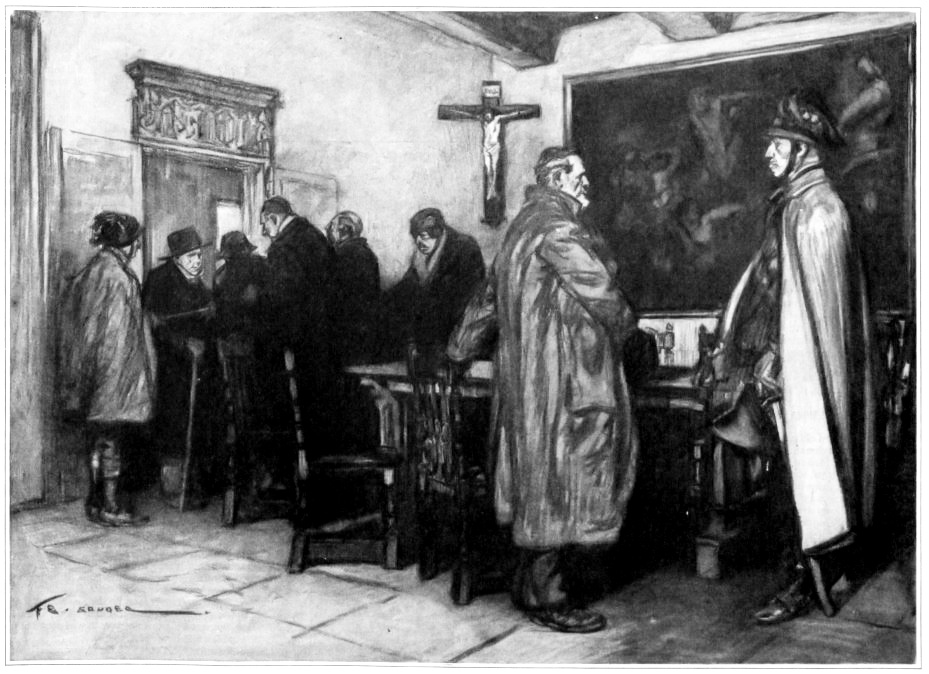
They looked at one another. Then it was true. The Bürgermeister began again. He was trying to speak firmly yet quietly, as he had done two nights before on the road. But the military figure, standing at the head of the table, locked in an attitude of static impatience, made him tremble.
“Excellenz, that is what we have heard. But we could not believe it. I would not have taken any notice, but I was afraid — I did not want any misunderstanding. After all, authority is authority. I, as Bürgermeister, understand that — ”
The soldier glanced at him — one sharp, ironical glance, and the speaker faltered. “I mean — I understand — my time of office — I did not want any conflict. I wished to work with you to keep the peace. Since nothing can help us, we wish to do our best. That is why we have come so that the matter should be clear.”
“It is clear.”
The Bürgermeister’s mouth opened. It stayed open and began to tremble oddly, like that of a child on the verge of tears. But the Herr Doktor Menzel nodded and rubbed his hands as though he were congratulating everybody on a satisfactory case. He was very old and hadn’t heard clearly.
“You see,” he chirped — “you see, I told you so. What an unnecessary fuss! In these days we are all civilized, decent people. I told you it would be all right.”
They tried to silence him, tugging him by the sleeve and whispering in his ear. They knew they ought not to have brought him, but he had been on the council for years and had done no harm. Therefore it had seemed cruel to leave him out. Besides, he was a gentleman, a university man, not a rough peasant like themselves, and the general would surely be impressed. But the general measured him with a restrained contempt.
“Perhaps it is time you people understood your position once and for all. By the treaty you have become subject to the Italian Government. Your suggestion that you should celebrate your resistance to our arms is therefore a piece of insolence that you would be wise not to repeat.”
“Excellenza — ”
The soldier brought his fist crashing on the table. “My father was shot by your people for less,” he said. “Now you can go.”
They shuffled their feet. They wanted to go. They were terrified — they hardly knew at what. Something about this iron old man broke them, so that if he had lifted his fist, resting clenched and hard as a block of stone on the table, they would have winced. But the Bürgermeister held his ground desperately.
“Excellenza, it is our dead we honor.”
“Ah, yes, the men who killed our men — my men up there on the Königsberg — my son, for that matter. Excellent! Evidently you have a sense of humor. . . . Now get out of here. You have had my answer. I am in full authority for the time being and you are under martial law. You know, I suppose, what that means.”
“Si, si, Excellenza.”
They ducked obsequiously. But the Bürgermeister had grown suddenly quite calm. It was as though he had come out of terrifying doubt and darkness into some place where he was not afraid because he knew that nothing mattered anymore.
“Forgive me, Excellenza, I don’t think you understand. Our sons died for the fatherland as yours did. It seems they were beaten, but they did their best. They gave all they had. There are no young men left in Windstättl, Excellenza — only us old people. I do not speak of my own sons — I will not speak of myself at all. I think perhaps it is of no great consequence what you and I decide or what happens to us two. In a very few years the dust will be over everything. But there are those in this town who will feel your order, Excellenza, as though it slew their children a second time. I am thinking of old Andreas Hofner and his wife. Excellenza, all their boys went — five in one year. We thought at first they would lose their minds. If they had not felt that their boys had died gloriously, their hearts would surely have broken. Even now they don’t understand and we dare not tell them. For a whole year Andreas has worked at his shield. It is a fine thing, Excellenza — even you would say so — a thing to touch the heart. He is a great craftsman, our Andreas. He carved the crucifix that stands at the head of the pass. Your Excellency must have seen it.”
The general motioned to the sentry. “Get these men out.”
“Excellenza, they are very old, sad people. I dare not tell them. Think — five sons in one year — even the emperor telegraphed. It is only a little thing to allow them — a wooden shield.”
The sentry came with his rifle crossed and began to push them along, hustling them with an emotionless insistence. They went like frightened sheep scrambling for the exit to their pen. But the Bürgermeister stood quietly at his place, his head bent meditatively, and when the sentry touched him he made a stern gesture so that the man involuntarily fell back from him. At the door he turned and bowed to the general, and the General Beppo Volpi, yielding to an instinct stronger than his purpose, touched his cap.
Outside, the deputation huddled together. It was very cold. An icy wind raced down the medieval little street. But it was not the wind that made their teeth chatter. They were unmanned and ashamed. They did not dare speak or look at one another.
It was market day. The street was full of peasants interlaced with carabinieri parading two and two like solemn twin dolls, and smart Italian officers with their caps at a rakish, victorious angle. Amidst so much movement and color, the deputation had a forlorn gray look like a group of prisoners who have been thrust out into the world and no longer know where to turn.
It was Gottfried Keller who said at last, “We must tell them. You will have to tell them, Herr Bürgermeister.”
“I am not Bürgermeister any more, Herr Keller, and I will not tell them.”
“Who will then?”
“God knows, I cannot.” He clenched his hands. “Let them find out for themselves what men are made of,” he added bitterly.
The Herr Doktor Menzel plucked at his sleeve. “Gentlemen, I will tell them. Who has more right to such a task? Didn’t I bring their five sons into the world?”
“Yes, that is true. Let the Herr Doktor tell them.”
They sighed their relief. No doubt it was true that he was a little mad, the Herr Doktor, but he was kind and had skillful hands. He would break Andreas Hofner’s heart and the heart of Maria his wife very, very gently.
IV
He had forgotten. He knew that he had forgotten. For two whole days he had known, and now he stood at the door of Andreas Hofner’s house, plucking his lips with trembling fingers and making little moaning sounds under his breath like someone in torment. It was terrible. He remembered how eager he had been. He had pushed himself forward, determined to show them all that he still counted for something; and they had trusted him, and for an hour or so he had gone about with his head up, feeling resolute and confident again. Then a kind of drowsy mist had settled on his brain and he had forgotten.
Of course he should have gone frankly to Johann Kirsch and told the truth. But he was too ashamed. Once upon a time he had been the cleverest man in Windstättl and people had looked up to him and asked his advice. Now they shook their heads and said, “He forgets, poor old fellow — he forgets everything.” And he could not bear it. He would rather have died than to have gone to them and said, “I have forgotten.”
Everything seemed to combine together to trouble him. The Sunday morning was so still — so very strangely still. It was as though everyone had deserted him. Except for the inevitable carabinieri, who paraded slowly backward and forward, looking about them with puzzled, doubtful eyes, the streets were empty. The windows of the houses had kept their shutters closed. Even the church bells were silent. There was an air of desolate mourning as though the little town covered its face with its hands and wept.
The Herr Doktor did not understand. Perhaps it was the threat of a storm that kept the people hidden. Certainly there was a queer gray light over the Königsberg, whose final peak stood up like a finger against the livid sky. Yes, there was snow coming. But the people of Windstättl were not afraid of snow. He shook his head and rapped timidly. Perhaps when he saw the Hofners everything would come back.
Maria Hofner opened the door to him. At first he was so astonished that he couldn’t speak. Why, she had been married in that dress! Queer that he should remember so vividly something that belonged to forty years back and couldn’t remember what people had said to him only two days ago. But there it was; he remembered every detail. The light embroidered bodice and full flowered skirt, the close-fitting beaded headdress, such as the Windstättl women had worn in the Herr Doktor’s youth, were more familiar to him than his own shrunken hands. But they made her unfamiliarly gnarled and small and twisted. The dress was so new, as though it had been laid out on the bride’s bed only yesterday, and she was so old. For one grisly moment the Herr Doktor thought that the whole of his life had been a dream and that at the touch of some evil magic Andreas Hofner’s pretty wife had withered in her bridal clothes.
He became more confused. He could see that her bright, birdlike eyes were peeping Past him anxiously, right down the street, seeking for someone.
“Na, na, Herr Doktor, it wasn’t you we expected. But nevermind. Come inside, and the others will be along presently.”
“Presently — presently,” the Herr Doktor murmured.
He followed her into the living room. There, too, something had happened — something solemn and touching. The room had been cluttered with life, with a turmoil and struggle of hard-won existence — the birth of children, their tears, their laughter, farewells, unspoken anxiety, crushing grief and stoic silences. Sometimes it had seemed to the old doktor that he could see the ghosts of all the room had witnessed — that the very walls had been impregnated with voices and unheard sighing.
But now the place was empty, swept and garnished as for the coming of some great event. The copper pots and pans gleamed on the walls. The oak table, drawn up in the corner under the crucifix, gleamed like a dark, empty mirror. The clock ticked solemnly. Life had been put away. It was like a church, austere and hushed. And set against the wall, facing the door, as if in welcome, was the carved shield of the Windstättl memorial.
Ah, yes, the memorial. The Herr Doktor remembered now — dimly. Of course. They were to hang the shield today on the wall of the Rathaus. They had been on a deputation to the Italian general about it and the Italian general had said — what had he said? The Herr Doktor groaned secretly. It was as though a gust of wind had blown to the door of his mind, and though he might fling himself against it pitifully, it would not yield. He had to stand outside, shivering and helpless.
But it couldn’t go on. He had to say something. He could see how puzzled they were. The old woman was watching him with her head a little on one side, and he imagined that there was a look on her wizened face as though she knew the thing he couldn’t remember and was afraid. And Andreas himself was watching — waiting for the solemn, tremendous thing to happen.
The Herr Doktor remembered him as a slim handsome young man, but he had grown stout and heavy, and the Tyrolean wedding dress didn’t fit him anymore. He might have been comic — an old man masquerading — but there was an earnest, touching dignity about him. The Herr Doktor had to turn away. He felt dazed and sick with his uncomprehending pity.
“Well, well, that’s fine — that’s fine,” he stammered. “A grand piece of work. Yes, indeed. You must be very proud, Andreas.”
“Are they coming — the others?” Andreas asked. “They were to have been here by now. I was getting anxious. I thought, ‘Suppose there should have been some mistake. Suppose those Italian scoundrels — ’ Why — why do you look like that, Herr Doktor?”
“It is nothing — nothing at all,” the Herr Doktor declared cheerfully. Somebody behind the closed door had whispered to him, but so faintly he couldn’t hear. He went across to the carved shield and ran his shaking hand over its polished surface. “Yes, most beautiful, most touching, as the Herr Bürgermeister said; a thing to move the hardest heart.”
“Did he say that?”
“Indeed he did. . . . Perhaps — perhaps in a moment I shall remember something more.”
“Ei, Kirsch is a good fellow,” Andreas Hofner murmured. He stood in an attitude of perplexity, his hand clenched in his thick, gray hair. “But why does he keep us waiting? The bishop is to give the blessing in half an hour. They are cutting it pretty fine, those fellows. And how quiet everything is. No one in the streets. I thought — ” He glanced about him confusedly, as though for a moment he doubted the reality even of his own surroundings. “I had thought somehow — ”
His wife shuffled over to him. She slipped her withered arm through his and fixed the Herr Doktor with her strange penetrating look that seemed to say, “Take care — take great care what you do to him.”
“Perhaps they sent the Herr Doktor with a message,” she suggested. “Perhaps all the people are waiting outside the Rathaus. Is that what you were to tell us, Herr Doktor?”
He nodded eagerly. He felt grateful to her. She couldn’t open the door, but she could make him see what was perhaps beyond it. And somehow old Andreas frightened him. He had the tense, strained look of someone balanced on the edge of a precipice who daren’t look down for fear of what he shall see.
“That’s it — that’s it exactly. The streets are so crowded — to tell you the truth I was all confused — I am not so young anymore — I had to fight my way through — ”
“And the band — is there a band playing?”
“All the time, all the time — the band from Eulensee. Fine fellows they are, playing for all they’re worth.”
“Do you hear them, Maria?”
“Yes, yes; now I can just hear them.”
She and the old doctor listened to the silence. Andreas Hofner sighed. His glance wandered to the clock, ticking solemnly among the shadows.
“We should be going,” he said restlessly. “I don’t understand. They were to have come for me. Four men from the Schutzverein were to have carried the shield.”
“Perhaps if the Herr Doktor could remember his message — ” she insisted. “ Perhaps he was sent to fetch us.” She said distinctly, under her breath, “Tell me! What is it? What is the matter? Why don’t they come?” But he could only stare back helplessly. How could he say to her, “I have forgotten”? And perhaps it was true. Perhaps he had come to fetch them. If only it had not been for that rising, breathless pity in him as though someone behind the closed door of his mind knew and wept.
“Yes, that’s just it. I was to fetch you. At the last moment things had to be changed. It was the Italian general. He said — things had to be changed. I can’t explain now. But we ought to go.” He drew out his watch. For two days, in his misery, he had forgotten to wind it, and he stared at its dead face with unseeing eyes. “Yes, yes, Andreas, we ought to go.”
The old man sighed again. “I had thought it would be different,” he said wistfully. He picked up the shield and set it heavily, sadly on his shoulders. “Open the door, Maria.”
The Herr Doktor went out behind them. The street was full of a gray, penetrating cold. Yes, snow was coming. He felt his knees giving way under him. Something was going to happen — something quite terrible. These two old people were walking straight to meet it and he ought to stop them. But if he said “Don’t go,” he would have to explain that he was a poor old man who had lost his wits, and he couldn’t bear it. The tears came into his eyes and he rubbed them back with his knuckles. It was pitiable to be so old.
“The windows are all closed,” Andreas Hofner said. “And there are no flags. Why are there no flags, Herr Doktor?” But he was so accustomed to not hearing he did not notice that they did not answer. Presently he asked again, “Can you hear the bands now, Maria?”
“Yes — yes, indeed. They are growing louder, Andreas.” But she fell back, plucking at the doktor’s sleeve. “What has happened? In the name of God, what is happening?”
He had to reassure her. “Nothing — nothing — I give you my word.” But it was of no good. He felt how his face lost its composure and broke up like the face of an unhappy child. He turned away from her. “I don’t know — I tell you I don’t know.”
Andreas Hofner’s house lay on the outskirts of the town, and they made their way through narrow twisting alleys toward the Kaiserstrasse, which was now the Corso Emmanuel. A wind was rising and came down from the mountains in short, cruel gusts that nearly carried them off their feet.
“Winter and death,” the Herr Doktor thought. “Winter and death.” He couldn’t think of anything else. Everything was old and dying — old Andreas there, bowed under his shield, and his little wife trotting at his heels — like a pathetic procession of things past and half forgotten. Even the two carabinieri stopped to look after them as though they, too, saw how queer and tragic they were — these three old people blown along by the wind.
But the street was empty.
A group of soldiers loitered in the archway of the Rathaus. They had been chattering with one another, but as they saw Andreas Hofner and his escort they fell silent and watched curiously. And as Andreas saw them he stopped short and set down his shield, and looked about him. He saw the emptiness and the silence and his face, flushed with exertion, went ashen.
He said briefly, sternly, “You have been lying to me. Everybody has been lying to me.”
“Andreas — ”
He shook her off. He said loudly to the listening soldiers, “I have come to set up the memorial to our dead heroes.”
He advanced upon them, carrying his shield in front of him like a menacing old warrior. A little under-officer came out of the archway. He smiled good-humoredly, showing his strong white teeth, and gave an order, and three of the soldiers advanced and took the shield out of Andreas Hofner’s hands. For a moment he seemed dazed, incapable of resistance. Perhaps he thought that after all they were to help him. Then he understood. With a shout of rage and anguish he fell upon them. But it was scarcely a struggle. He was old and there were so many. They actually laughed. Then it was all over. The street that for one moment had seemed on the verge of a violent, terrible awakening sank back into its frozen stupor. The eyes of the narrow steep-roofed houses closed tighter as though they would not see Andreas Hofner lying on the cobbles with his bleeding face on his wife’s old breast.
The Herr Doktor was like a scarecrow blown hither and thither by the wind. He wrung his hands and wept, for now the door had opened and he remembered.
V
They had let the stove go out. The stove was the heart of the house, and now it was dead and they didn’t even know. They didn’t feel the bitter cold. They sat at the bare table, stern and sorrowful, like people who have been invited to a feast and have been made mock of. Their wedding clothes and the bloody scar across the old man’s face and the glacial misery of the room made mock of them.
Andreas Hofner held his head up and stared sightlessly into the shadows and his wife watched him. Her hands were folded in her lap in an attitude of stoic patience as though she were waiting for him to come to the end of his thoughts. She was so still. Life had carved so many lines into her shrunken face that it had become as expressionless as a death mask. She might have been a little old Buddha sitting there, frozen into a static resignation. But her eyes glowed. They stared out from their deep hollows like indefatigable sentries from a ruined watchtower.
The Bürgermeister looked from one to the other of them. From the moment he had come in no one had spoken. Maria Hofner had opened the door to him without greeting and had gone back to her place as though to resume some grave act of contemplation. More than ever the place was like a church — but a church that had been desecrated and despoiled.
It was so cold that the Bürgermeister did not even turn down the collar of his coat. He stood there, looming huge and misshapen against the pale lamplight, and seemed afraid to speak. The wind had gone down, and outside and within the house was a muffled, deathly silence. Every movement — the creak of some old board, the stiff rustle of the Bürgermeister’s leather coat as he put his hand in his pocket, had the quality of some portentous footstep.
“That is all I have left,” he said. He laid something metallic on the table. “They would have taken it from me if they had known, but I had a fancy to keep it. I meant to take it with me where I am going, but it may be that you will know what to do. They have set your shield in the Council Chamber, Andreas, and in the summer the tourists will pay their lires to have a look at it. There are things one cannot bear, so I am going away. That is all I have to give you, my old friend.”
He waited a moment. Though he could not have heard it, the metal click of the key on the bare table had seemed to run through the old man like a shock of electricity. Then he fell back into his former sightless brooding. But the black eyes of Maria, his wife, fastened themselves on the Bürgermeister’s gift. She did not move. It was queer how fiercely alive and vital she seemed sitting there in her utter immobility. The Bürgermeister did not even give them his hand.
“Gott segne Euch,” he said. Opening the door, he stood for a moment looking back at them as though he were impressing some bitter memory on his mind. Then he was gone. A gust of wind swirled round the room and buffeted the untended lamp, whose flame, struggling pitifully for life, flickered and went out. But the darkness had a luminous quality of its own. It seeped through the window in a pale gray tide. In it the two motionless figures grew distinct — enlarged and even ominous.
Presently Maria Hofner leaned forward. She laid her hand over the key and fondled it and pressed it against her breast. She seemed to commune with it. She took it with her to the window and held it out into the strange uncertain light. Then she called, very softly and insistently, as though she were afraid of waking him too suddenly, “Andreas — Andreas.”
He came at once, heavily, like someone hypnotized, and stood beside her. From the window they looked straight across empty fields to the mountains and the cemetery and their dead sons. They could see nothing, and yet they waited as though at any moment they might see everything. A few flakes of snow that were advance guards of the coming storm fluttered down from the vague and shifting clouds. Slowly, dramatically, the moon rode into space and for one intense minute they saw the Königsberg, white and terribly magnified, blazing amidst a crown of stars.
Then moon and stars went out. The living peaks became ghosts. It was dark again. Andreas Hofner turned away. It seemed that he had come at last to the end of his thoughts — that he knew now what he should do.
“Light the lamp,” he ordered.
She obeyed. Though she was so bent and her fingers were twisted and swollen, she could be very nimble. The light flickered back to life, warming the bitter air with its sickly yellow. Their shadows rose up behind the two old people, and ran up and down the walls and ceiling in sly, grotesque mimicry. Andreas Hofner took his greatcoat from a cupboard, and a coil of rope. He drew his fur cap down over his ears, and the giant behind him lifted his hands too, as though in benediction.
“Give me the lantern.”
She was wrapping herself in her shawls. “I am coming with you, Andreas.”
“You cannot. You do not know where I am going.”
“I know, and I am very strong. I can help, I can carry the lantern. They were mine too, Andreas.”
He stared at her fixedly. She was close to him, and suddenly he put out his arm and drew her roughly against his breast. It was the first movement of tenderness he had made for many years. Even when Fritzchen had gone, he had only patted her shoulder. Their life had been so hard. And there was something terrible, devastating, in that breakdown of their stoicism. They did not know what to do. They did not know how to kiss each other. Their dry lips fumbled against each other’s cheeks. They clasped each other with stiff frantic arms. They began to cry, but they did not know how to cry. Their harsh uneven sobs seemed to tear them and the darkened room to pieces. All the sorrow that had been locked up in silence through the years had burst through the narrow breach of that first gesture. It seemed as though they could never stop — never let go. Only little by little, like a dying storm, they grew quiet, drawing away from each other, back into their stern customary loneliness. He patted her gently.
“Na, na, Alterchen.”
They did not speak again. Across the sleeping silence of the town they heard the Rathaus clock strike. Involuntarily, they stood still, counting the hours. Then Andreas Hofner turned out the light. She held open the door for him and followed him.
VI
It had not been a pleasant evening. From some indefinable cause a cloud had hung over the dinner — a sort of somber ill temper, a dissatisfaction that had nearly ended in a quarrel. If it had not been for young Strozzi, who was a model of tactful persuasiveness, something really unfortunate might have happened. Oddly enough, the general himself had been unable to intervene. He had felt the storm gathering and had let go his customary iron hold over the younger men and gone with the tide. Not that he had made a sign. But within himself he had been a seething caldron of anger, irritability, sheer inexplicable unhappiness.
They had been celebrating the battle by which the regiment had finally regained the heights of the Königsberg — a dramatic celebration. It did not often fall to the luck of men to commemorate a victory months afterward under the very shadow of a height which they had won at such cost. The general himself had lost his son that night, and when they stood drinking to the memory of their dead they turned to him, standing stiff and inflexible at the head of the table, and drank to him.
They had drunk too much perhaps. Or perhaps already they had begun to chafe at the monotony of their garrison life. Windstättl, that had once seemed so great a prize, had dwindled to a sad little town, full of sad people who looked at you with uncomprehending hostility. At any rate it was Gabriel Vinzenzo, a scatterbrained lieutenant, who had said suddenly and loudly so that everyone had to hear him, “They say that old fellow lost five sons up there.”
Everyone knew of whom he spoke. The officers’ mess was held in the inn facing the Rathaus and most of the men present had witnessed the scene from the windows. It had been a good joke at the time. Some of them had been outraged at the insolent attempt, but the majority had laughed. What a ridiculous spectacle they had made — the three shabby little old people with their trumpery wooden shield, trying to defy the whole Italian Army. But now no one laughed. A heated argument started — or rather it was no argument, for everyone but young Vinzenzo said the same thing, but so passionately that men who were in agreement felt a sudden overwhelming dislike of one another. And Vinzenzo had been intolerably drunk.
He had said over and over again, stuttering and stammering, “Well, why — why shouldn’t they have their d-d-damned memorial? They’re dead, aren’t they? I’d have hung it up with my own hands.”
Strozzi had led this younger comrade away in the nick of time.
But after that the celebration went to pieces. And now the general stood alone on the steps of the Gasthaus and gave himself over to a bitter anger. He had wanted to have Vinzenzo arrested. It had only been because of the scandal — because, too, Vinzenzo had been his son’s friend and had been with him when he died — that he had held back the order. But tomorrow he would take disciplinary measures. He would make Vinzenzo smart for his folly, for the evening’s wretched debacle. Vinzenzo had insulted the dead. He had thrown a question at their glory, at their rights as victors.
It was as though, in his drunkenness, he had seen no difference between one dead man and another. If things like that were tolerated in the very stronghold of national honor, the crumbling of the whole splendid edifice was foredoomed. He would make an example — a stern, salutary example.
The resolution left him unappeased. He was restless — acutely, strangely unhappy. He was hot subject to emotion. When they had brought him the news of his son’s death, he had only nodded and gone on giving his orders. Men died and the lucky ones died fighting for a victorious cause. There had been nothing to regret. This impatience, this disquiet that he felt now was just a mood, passing, insignificant. It might mean that he was not so young anymore and that he was tired. It might mean that he had drunk too much himself, so that his mind had lost its normal serenity. It might mean, too, that there was something in all this talk of an afterlife and that tonight dead men were marching through the streets — battalions of them, silent, spectral hosts, blowing their voiceless bugles, screaming to meet other dead men — his dead — up there on the frozen heights and to enact again that last culminating struggle.
He gibed ironically at his own fancifulness. Yet he could not quite shake himself free from it. The street itself would not let him. It was empty and silent. Yet there was something happening. The ancient houses, their steep roofs pulled down over their shadowy eyes, were watching intently whatever it was passed between them. Through the pale, uncertain moonlight snowflakes fluttered down like the forerunners of an approaching army. Nothing else moved. And yet the life was there.
A red eye opened suddenly in the dead face of the Rathaus opposite. It seemed to rest on General Beppo Volpi, to fix him with a menacing yet anxious curiosity, as though the forces of invisible activity had discovered his alien presence and had sent someone to inquire, “Who is that man?” And for a moment he was actually afraid. He had ceased to be the victor standing on conquered soil, secure, warm, well-fed, with power to send men who defied him to their death. He was alone, in hostile territory, amidst a ghostly hostile people. And up there a signal had been given.
It was an illusion. His alert strong brain sprang to the rescue. He knew that the Rathaus guardian had left hours before. Under martial law, none of the townspeople were allowed abroad after dark, and it was past midnight. Whoever it was up there disobeyed his orders — defied him. He tightened his stern lips. Yes, there it was — defiance. A vague tormenting emotion that had pursued him all that day took definable shape. Everywhere defiance. These people, these houses — yes, the town itself — defied him, slipped through his fingers, derided his mastery. He might make laws, might enforce them, but there was something he could not do. And it was intolerable. It reduced victory to an abject absurdity. It turned the loss and suffering of that last hideous night into meaninglessness. He would make an end to it. He owed his dead no less. He would make an example as swift, as remorseless, as a stroke of lightning. Then there would be peace. There would be an end to this unrest. He himself would be reassured. He felt cruelty rise to his lips in a glacial tide.
The eye closed. The face of the Rathaus became again blank and enigmatic. The houses up and down the street that had seemed to stand on tiptoe in their agony of suspense now sank back into their former dark watchfulness. The snow fell more rapidly, trying to cover over what had happened, to muffle the grind of a rusty lock, the moaning of old hinges. But the general had both heard and seen. Opposite him, the Rathaus door had opened onto a deeper gulf of shadow from which two figures emerged, staining the whiteness of the street. They stood quite still. They seemed to be looking about them anxiously, not speaking. In the faltering moonlight that filtered through the thin slow-moving clouds they looked like two gnomes creeping out of a deserted medieval city. The man was bowed and misshapen by some burden.
The general caught back an exclamation. So that was it! The Windstättl memorial and that old man — that old fury of a woman.
It would have been easy to call out the guard. He did not do so. This, in some curious way, was his affair. It was like a personal challenge. He would make an example. He would teach these people a lesson with his own hands.
How absurd — how childish they were! He could have laughed. Did they really think they could steal like that with impunity? How forlorn and lost they seemed, standing there, already veiled with snow — two crazy old people.
They began to move now. They must have felt that Providence was watching over them to dare to walk through the streets like that. The old man went first, heavily, and the woman followed him with short hobbling steps. The houses seemed to bend forward, throwing their protective shadow over them.
The general waited. There was ironic calculation in his patience. He did not want to stop them now. Let them drink deep of their mad hope. It would be more satisfying to his mood to hunt them out of their hovel, drive them back with his revolver in their ribs, force them to replace the shield with their own hands. He wanted — he needed the satisfaction of that personal domination. Then the soldiers could take them prisoners. Tomorrow they would be tried and shot out of hand. There could be no other end.
He threw his cloak over his shoulder and stepped out of the Gasthaus doorway.
It was as though everyone in the world were dead but himself and those two. He could see them clearly, for there was a queer light abroad. From minute to minute a full moon slid out from amidst the tattered clouds; but it was the snow itself, burning with a dead white fire, which gave to familiar objects their magnified and distorted shapes. The quiet was absolute. Everything that moved — the clouds, the moon, the snow — moved without sound. Even the general’s own footsteps were lost in that profundity of silence. It became difficult to realize himself, to shake off the impression that he had become a shadow without footfall. He had to think, to call up memories in order to make sure of his own identity, and even his thoughts lost their clearness and became vague and wandering.
The snow was like a white pall.
They went on steadily. He tried to remember where these people lived. Somewhere on the outskirts, he had been told. But they had already passed the outskirts. The last straggling houses lay behind them like a heap of tumbled blackly shining rocks in the valley. Now they were far out on the high road that wound up to the summit of the pass, unsheltered from the bitter breath of the mountains, three insignificant specks of movement in that vast luminous whiteness.
The general drew his breath painfully. His heavily booted feet sank deep in the soft snow. It was difficult to keep up. How strong that old woman must be! They said that she had had five sons — five. The general’s wife had died in childbirth. Five times that bowed, twisted body had been torn by the same pangs and nothing remained to her but her tottering self and that absurd trophy behind which she stumbled, as though by her crazy persistence she could give significance to these five lost and wasted lives. How futile! Here in this emptiness, this remorseless cold, how grotesquely futile! Even as he kept pace with them, his limbs aching with the effort, he became aware of a futility in himself — in his anger, in his stern purpose. He seemed to have shriveled, to have withered at the heart.
There was the crucifix which he had ridden past only a few days before. In his hard military pride he had scarcely glanced at it. It stood up pitifully against the ghostly skyline, a desolate symbol of human suffering. He leaned against it for support, his hand clutched on the nailed feet. He was tired, wretched, aware of danger. He wanted to turn back. Already the snow was wrapping itself about him in a smothering sheet of cold. Better to go back, give orders, send out a patrol, arrest these two. That was his obvious, reasonable duty. He saw now that he had been mad to set out on such an adventure, and it was madness to go on. He stood there, shivering, his teeth clenched, the cloak freezing in stiff white folds about him. Deep in his heart was the knowledge that there was no turning back. From the moment he had left the shelter of the Gasthaus something had happened. The reins of his destiny had been taken from him. He had been caught in the net of a great invisible event.
The town had gone down in darkness. There was nothing left but the snow and a tiny point of light ahead. They had lit a lantern. It moved on steadily, bearing to the right, away from the high road up the steep flanks of the Königsberg. Suddenly he understood. They were going to the cemetery. Yes, he remembered now. It lay far back from the road, under the heights which had witnessed that last hand-to-hand struggle — a field sown with crosses. There they would set their memorial and tomorrow his soldiers would fetch it away; they themselves would pay for their temerity with what remained of their old lives. He would make an example. He had to. Otherwise, for what had the dead suffered? What was the meaning of victory? For what had he lived? It was hard to remember. He was cold and tired and confused. Victory, revenge, honor. Just words. He had used them so often that they came of their own accord to the rescue. But to his numbed brain they had become almost meaningless.
The snow deepened. They were off the path now, bearing toward the eastern flank where was the one possible ascent. They had left the cemetery behind them. The general had halted there for a moment, breathless, exhausted, sheltering himself under its crumbling wall. He no longer understood. He had been so sure. The strange light that came and went had filtered through the falling veil of snow and showed him the huddled crosses whose heads barely rose above the white mounting tide. The central cross had had a curiously human look like a shepherd with despairing arms outstretched over his lost flock. The five sons lay there under the snow. But they had gone on. They had not even paused. He could see the lantern light rising — rising steadily as though it were a fallen star beating its way back.
The general shouted. He shouted to them in German, but his voice froze in his mouth. He started on again, stumbling, falling, groaning. They were climbing now. Between the boulders over which his feet slipped dangerously were snowdrifts that engulfed him to his knees. And once the ground gave way altogether. He broke straight through into a thick glacial river that rose swiftly from his waist to his armpits. He ceased to struggle. He knew what had happened. He had blundered into the old trench that ran diagonally up to the summit of the mountain. It was snow-filled to its brim, a deathtrap now as before.
Something queer happened to him. Time was wiped out — the fat rich years of victorious peace. He was fighting again, he was shouting orders, stumbling along those terrible haunted warrens that they had carved out of the face of the rock. But he was alone. Everyone but himself — enemies and comrades — had become shadows who watched him from a distance with an aloof pity. He could feel them. They were just beyond the enshrouding cloud. Their guns were stacked. They bivouacked together in their white silence. He alone carried on the struggle — he and that old pair climbing to their death.
A coil of barbed wire plucked at his arm. He caught hold of it. He was beyond pain. Somehow he dragged himself on to the lip of the trench and stood bent and trembling, torn by an anguish of exhaustion. His heart was breaking itself against his breast. But he could not turn back. It was too late. The thoughts of power and retribution had forsaken him. He was an old man, the last of his kind, lost in a world of ghosts. The things that had been sacred to him and for which the ghosts themselves had died had become unreal in this vast loneliness. It was like a final loss — a last, crushing bereavement. He felt the tears freezing on his cheeks.
The light brightened. A shred of cloud was torn aside and he saw Andreas Hofner and his wife. He was so near to them now that he could hear their voices. Andreas Hofner’s wife lay huddled on the snow. Andreas Hofner stood by her, patient and motionless. And now the old man looked like a martyr, bowed under his cross.
VII
“Andreas, the lantern has gone out.”
“No, it is still burning.”
“I cannot see it.”
“The snow blinds one.”
“You must go on without me, Andreas. I am tired. I want to sleep.”
“It is only a little way,” he said. He gave her his hand. They were so frozen they could not feel each other. “I shall need you,” he said.
So she went on. They had to climb now. There were places where he had to kick footholds for himself and her in the frozen snow, and sometimes he went on ahead and she had to lift the shield to him when he had reached a place of safety. Sometimes darkness engulfed them and their voices were like the voices of disembodied spirits. And once they lay down side by side as though they were already dead, and he had to rouse her, shaking her by the shoulder.
She had begun to talk to herself; or rather, she talked to baby Andreas, who, it seemed, walked beside her and comforted her. Baby Andreas had been something of a mother’s darling, not very strong, and he had clung to her long after the other children had become sturdily independent. Now it was her turn to cling to him. He put his arm under hers and reassured her and she told him how it had all happened.
“Denkmal, Kleinche, they wouldn’t even let us put up a memorial to you — the memorial that your father carved for you with his own hands. And so we are going to hang it where no one will ever find it — just where you died — up there on the Königsberg.”
And Andreas said, “That’s fine, Mutterle. We shall see it when we march past at nightfall. The regiment will be so proud.”
Talking like that, they came to the highest peak of all. Andreas Hofner set down his burden. But even so, he couldn’t stand upright anymore. By the pale yellow light of the lantern he made fast his rope to a jutting point of rock. He worked slowly, for his hands were stiff and almost insensible, and when he had finished, the Windstättl memorial was already buried. The snow had risen to Maria Hofner’s knees. She looked half her size — a little old gnome — and she was still talking to baby Andreas, so that, through the scurrying snow and the glacial wind that came like a blast of death from the ranges of invisible mountains beyond, he could scarcely make her hear.
“There is a ledge thirty feet below. It will be safe there. They will never find it. But I’ll not come back, Maria. My hands are all frozen and you couldn’t — you’re not strong enough. I shall stay there quietly. It doesn’t matter. I am an old man. Go back if you can. But you will never tell anyone — not even the priest when you are dying — where I have gone.”
“Baby Andreas says he will go with you,” she said, smiling.
He made the shield fast to his shoulders. He knelt for a moment on the verge of the precipice, calculating his distance, steadying himself.
“When the rope goes slack throw it after me,” he ordered. “There must be no trace, you understand.”
She nodded. All their farewells were made. They had passed beyond the reach of human grief. He tightened his broken, bleeding hands on the rope and turned stiffly over with his face to the rock.
“Andreas! Andreas!”
He had passed over the verge, far out of reach of that thin voice. Only the General Beppo Volpi heard her. He had tried to run the few yards of the smooth treacherously sloping summit, but his legs had given way under him and he had fallen. He reached her as the unhitched rope slipped from her hand and flashed over the snow and out of sight like a writhing maddened serpent. He followed it almost to the edge of the precipice and crouched down and shouted, but there was no answer.
The old woman said quietly, without astonishment, “He cannot hear you.”
He turned to her, crying out in a bitter protest, “What have you done?” and she answered with the same tranquility, “We have hung our memorial to our dead children.”
He drew himself back into safety. The wind caught the folds of his cape so that it spread out in wide black wings over them both.
She lifted her lantern to his face. The light glittered on his medals. Her own face was calm and satisfied.
“You are the Italian general?” she asked.
“Yes.”
“And you have brought up all your soldiers, but it is too late. You will never, never find them. They are safe.”
The man he had been would have mocked at her defiance. But he was silent. The snow swirled noiselessly between them. He was thinking of the old man crouched against the face of the precipice, waiting patiently for the end. He thought of the things that men do to one another, and the bitter cold crept up his limbs to his very heart. He put out his hand, clutching her.
“We must get away from here — get back. Do you understand? If they found you here they might find him, and it would be all for nothing.”
She was quite passive. She let him drag her up the dangerous slope into the relative shelter of the rocks. But he knew that she could not go far. She did not want to. There was no reason. It was finished. She had climbed to a high place where she overlooked the whole of life, and now she was ready to turn her face to the dark. And he too, shorn of everything — the pride of arms, the pride of victory, the pride of vengeance — to what should he return?
“I want to sleep,” she muttered. “I want to sleep, baby Andreas.”
He got her halfway down the first ascent, then she collapsed. She knelt in the deep snow — a vague, undecipherable bundle — and for a moment he stood beside her, his hand still clasped in hers. His thoughts were strange, wandering, but quite peaceful. He thought of all the way they had to go and knew that it was not possible — not even for himself. He was old. He was tired out. He had never really recovered from those months of inhuman suffering. But it was not only that. He could not leave her. Strange, incredible event. He too was to die for a lost cause — for a cause not even his, the memorial hanging there forever beyond human vision was for him, too; for fools, for brave, defeated men.
He bent over her. “I want you to believe,” he said — “I want you to believe that I am glad, Mutterchen.”
He spoke in German and she pressed his hand. She had heard without understanding, and when she spoke it was to baby Andreas. She seemed to think he was baby Andreas, and he knelt beside her and gathered her close to him. Beneath the shawls he could feel her very bones, like the skeleton of a starved bird, dying in the snow.
He woke once for a moment, just as dawn broke. The storm must have ceased some hours before, for they were covered with a gentle layer of snow no thicker than a white sheet. He lay with his face to the east, and lifting himself a little on his elbow, he could see how the invisible sun called in the stars, one after another, and woke the deathlike livid mountains to a burning resurrection. He was happy, without pain, without regret. He was content not to return. If he had gone back he would have had to betray the dead. He would have become again a soldier with a duty to perform and strange faiths to live by, and all these things had become meaningless. He was already one of those shadows who looked on men and on the ways of men with that grave remembering pity.
The light brightened. The clear sky beyond the mountains began to shine with colors. It was as though a cleansed, forgiven world stretched itself awake, laughing with the joy of returning life. The tears came into the general’s eyes, but they were the weak tears of an aged happiness. He thought of the Windstättl memorial that, beneath the highest peak, looked down upon the valley. Already it would be hidden by the snow. Time would efface its inscription. The winter’s storm would blot out the face of the dead here and the blazing summer’s sun rot the wood to dust that the wind would carry to the ends of the earth. No one would ever see the Windstättl memorial — only the dead as they filed past at twilight, and the stars.
It seemed to the general that across the morning stillness a bugle sounded, afar off, echoing among the heights.
“Cease fire! Cease fire!”
He tried to turn over. But the old woman lay stiffly with her head upon his breast and he did not want to wake her. He made an effort to cover her more closely with his cloak. But his strength failed him. He forgot what he was trying to do.
He too had fallen asleep.
75 Years Ago This Week: Defending The Right to Criticize in Times of Crisis
While the Post fully supported America’s war efforts after Pearl Harbor, it reserved the right to be critical of the administration.
Popular support for the war was very strong in December of 1941, and few Americans were publicly opposing it. But the Post had published several editorials that attacked how the Roosevelt administration was managing war finances and information about the conflict.
Because of this criticism, several readers were asking what gave the Post any right “to criticize the Administration, after having said it was the duty of all Americans to support their Government in war, whether they had been for it or against it before the fact.” The Post responded:
“To these we say, in the first place, that the Administration is not the Government—not yet. For all we know, the American Government may still be at war when this Administration is gone. We say to them, secondly, that loyalty to one’s Government in war is an American duty, and freedom to criticize one’s Government, even in war, is an American right.
“We have not surrendered that right—the right to criticize the Administration’s conduct of the war, the right to tell the truth as we believe it about the war, which is, after all, the people’s war because they will have to fight and pay for it; nor the right to say what we think about what is happening at the same time to the principles of free, representative, constitutional government, not necessarily on account of the war.
“If we have not that right, if every American citizen has not that right, what are we fighting for?”
The editorial ends with an admonishment that if we planned to confer FDR’s four freedoms upon other nations, we shouldn’t forget that they first belonged to us.
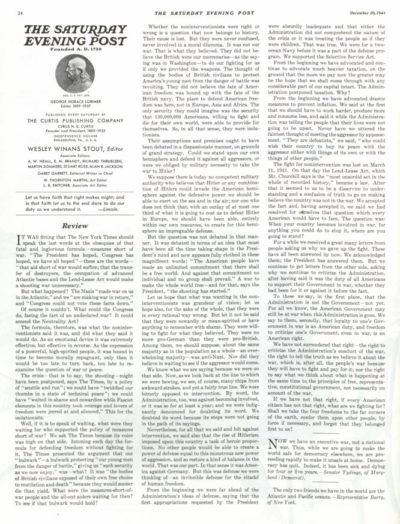
Before Pearl Harbor: America’s Responsibility
This feature is included in Pearl Harbor: 75th Anniversary Special, a print publication highlighting articles, picture galleries, and editorials that appeared in The Saturday Evening Post before, during, and after December 7, 1941. This special edition is available for sale at shoptthepost.com.
The views presented in the Post reflected, and frequently guided, American opinion. As war was declared in Europe in 1939, the Post was ambivalent about intervention. But that perspective began to evolve over the next two years in the face of Japanese and German aggression.
Must America Be the World’s Policeman?
Destiny has an errand here and we are about to keep an appointment with her. We do not know for sure what the business is. We do know it is important and that it behooves us now to steady our minds and think for ourselves.
The event of incomparable human significance, one to which war itself is subordinate, is that the star of world supremacy has passed from the old to the new world. The thought of world supremacy passing from Europe to America was one the European mind could not entertain. It happened and was not believed. American power determined the outcome of the World War, which England and her allies had otherwise lost. Still it was not believed.
Now the World War has been resumed. Again we shall have to decide what to do with our power. The decision we make may alter the history of the world for a thousand years. Twenty-two years ago we were saying to ourselves, and believing, that we had engaged in a war to end war. It sounds ironic now. Nevertheless, it is one of the romantic facts to be written down in history that we had no other purpose. We were defeated. We were defeated because it was not our war. It was Europe’s war, and the peace that was written was a European peace, laying down the lines for the next war.
Neither is the present war our war. We had no spoon in the caldron. Yet what are we saying about it? We hope we shall not be drawn into it. But we should not now be saying of the European war either that we hope to stay out of it or that we are fearful of being drawn into it. Instead, we should know beforehand, and with certainty, under what conditions we would go to war at all. It would have to be our own war, not Europe’s. It would have to be one wherein we were sure who at the end should write the peace, that it might be the American peace, unlike any peace that had been made before.
—“America,” Editorial, October 7, 1939
At What Point Do We Go to War?
How should a great nation go to war, if it goes? The answer is unhesitating. A great nation should go to war in a proud, forthright manner, saying what it does and why it does it, keeping faith at the same time with both its own laws and the laws of the world.
What have the American people and the American government been saying in their moral indictment of the aggressor? They have been saying that the aggressor makes war without declaring war, that he breaks the faith of treaties, that he tramples down the inconvenient law of the world — and this, of course, is intolerable.
But for all its power of moral judgment, how, in fact, does this great, proud nation of ours get into the European war against Hitler? How ready we are to see what is taking place in the world. A moral debacle of frightful proportions. All law between nations breaking down. No treaty worth the paper that has helplessly received the writing except there is on both sides of it equal gun power.
—“On Going to War,” Editorial, October 19, 1940
Reality Check
It would be wonderful if we could defend our own world, save Great Britain, overcome the principle of evil in Europe, rescue China from the Asiatic aggressor, and be at the same time achieving for ourselves a more abundant life. In good American humor we should then erect a monument to Hitler for having obliged us to do it. But we think we are more likely to arrive soon at the peak of our self-limited exertions and come awake on the hard bed of reality with a terrific shock.
—“The Escape Phantasy,” Editorial, January 11, 1941
Are We Dreaming?
By an evolution of American foreign policy, national defense has come to mean defense of democracy and freedom “everywhere in the world.” Thus we find ourselves running two defense programs at once — one of our own and one for all the other people who resist the aggressor. We undertake to be freedom’s arsenal. But to suppose that in a world aflame on both sides of us we can protect our own house and put out the fire — that we can make America the inexhaustible arsenal of democracy, save ourselves, save freedom everywhere in the world, destroy the principle of aggression, and at the same time raise the American way of life to new levels of comfort and well-being, is dream stuff.
—“Dream Power,” Editorial, February 8, 1941
What’s in It for Us?
It is time to realize that this country has assumed an unlimited responsibility for the outcome of the war. We have arrived at that responsibility with no material condition, no bargain, no stipulation beforehand — at least none that the American people are aware of — and, so far as we are informed, with no realistic political forethought.
Is it permitted to ask what America will get back? Do you suppose the liberated democracies of Europe in their gratitude will buy the American agricultural surplus instead of South American grain and meat and cotton at lower prices? Or can you imagine that Europe would say that the rich American people, by providing the only weapons — if that were all — had tried to buy the right to dominate the peace? What if Europe should resent our moral imperialism? And if Europe did that, what could we do about it? Demand our weapons back? Or ask to be paid for them in cash?
We are being neither realistic nor rational. No other people in the world would behave in this manner, or could survive if they did. The world we now undertake to save is one we have imagined. It does not really exist. But for all we have said, and beyond any reason, the spirit of crusade is a noble possession.
—“The New Apocalypse,” Editorial, March 22, 1941
No ‘Splendid Isolation’
Looking back is to say farewell. Misgivings are forbidden, but let us not on that account be mistaken about what has happened. It is not a new chapter of American history that now opens. It is a new book with a new theme. The story that began with the Declaration of Independence is finished.
We have broken with our past. We have thrown away our New World, our splendid isolation, our geographical advantage of three to one against all aggressors, our separate political religion. There is no longer a New World, nor an Old World, but now one world in which the American people have been cast for a part they will have to learn as they go along.
There is no longer a Monroe Doctrine. In place of it there is an American Internationalism. We do not yet know what that means.
From now on there is for us no foreign war. Any war anywhere in the world is our war, provided only there is an aggressor to be destroyed, a democracy to be saved, or an area of freedom to be defended.
We are suddenly staring at the fact that we had assumed ultimate and unlimited liability — moral, physical, and financial — for the outcome of war on three continents, for the survival of the British Empire, and for the utter destruction of Hitler. Anything less or else would be the first American defeat.
—“Toward the Unknown,” Editorial, March 29, 1941
Forward at Any Cost
We have received a great many letters asking us why we gave up the fight to keep the country out of the war.
Our answer is to say to them that a time comes when every American must somehow resolve one simple question: If for anything you could do about it, your country nevertheless becomes involved in war, where are you going to stand?
Many keep saying that time has not come. The clock has not struck. The fatal words have not been uttered in the form of a resolution by Congress. But the American government has proclaimed that Hitler must be destroyed. It has solemnly pledged itself before the world to employ its total resources to bring that result to pass. It has proclaimed that there can be and shall be no peace with Hitler. It has announced that a negotiated peace would be a defeat for democracy and freedom and the American way of life. It has proclaimed that the American way of life cannot exist in the same planet with the German thing. One or the other must die. Trying, therefore, to maintain the fiction that this country is not in the war against Hitler is like running from an earthquake.
We shall have to make up our minds to go on and on at any cost, to reconquer Europe and destroy Hitler there, even with American manpower — or turn back; and if we turn back we shall be remembered forever as the Falstaff nation of the world, boasting of a power it did really possess, boasting of how it would put it forth against the aggressor, and then changing its mind when the night came.
But the peril we speak of does not lie in making the wrong choice. It is there whatever we choose to do. We cannot now escape.
Everyone must be aware of what it will mean to go on. Do we see what it will mean to go back? The peril in that case is no less, may be even greater.
In going on we face the possibility of defeat, whether we can imagine it or not. But to go back is to face the possibility of national death. That is the reality as we see it; that is the reality we accept. The alternative had been to create here on this hemisphere the impregnable asylum of freedom and let tyranny in Europe destroy itself, as tyranny always has done and is bound to do again.
—“The Peril,” Editorial, May 24, 1941
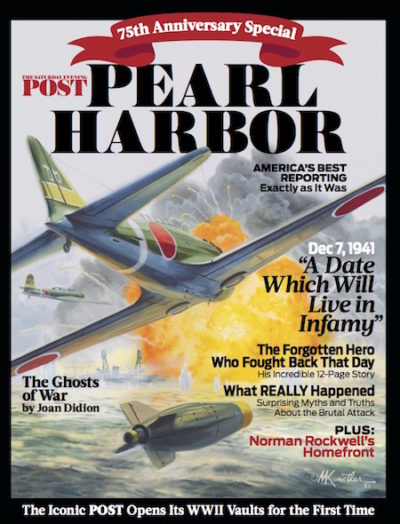
Not So Neutral: America’s War Efforts before Pearl Harbor
Seventy-five years ago, Americans were watching their country heading into a war without declaring war. In 1939, the Neutrality Acts that prohibited the U.S. from supplying arms, ammunition, or financial aid to belligerent countries were replaced by the Lend-Lease agreement, which enabled the U.S. to loan, or give, armaments to Great Britain.
America had become the supply line that enabled Great Britain to resist Hitler, sending billions of dollars of aid in weapons, ships, and other vital needs — hardly the actions of a neutral country.
Yet we were not at war.
The U.S. had also reached an agreement with the government of Greenland to build bases and station troops there to extend America’s protection of Lend-Lease ships. American soldiers were, technically, within a few miles of the war zone.
Yet we were not at war.
In 1940, America had more than a million American men in uniform and being trained in Army camps. Congress approved funding for a 70 percent increase in America’s combat fleet, enough to create a “two-ocean” navy.
Yet we were not at war.
President Roosevelt saw the inevitable threat from the Axis powers but didn’t have enough public support for an official declaration of war. Nonetheless, as Demaree Bess points out in “Put Up or Shut Up” — published just two weeks before the attack on Pearl Harbor — the U.S. had been deeply involved in the war for a while, and it was time for Americans to stop pretending otherwise.
Put Up Or Shut Up
By Demaree Bess
Excerpted from an article originally published Nov. 22, 1941
My work in Europe was to cover the war there as a reporter for The Saturday Evening Post. I stress that word reporter because there are not too many of us left. Some of the foremost American newspaper and magazine writers have been transformed by events, or by their personal convictions, into propagandists. It is not for me to criticize them: a man who becomes converted to any cause is privileged to propagandize on its behalf.
Nevertheless, I suspect that the American people today could use more reporting and less propaganda. The function of a propagandist is to present his cause in the best possible light, while the function of a reporter is to get the facts. In search of the facts, I have covered both sides of this war as thoroughly as it was possible for me to do. I have visited both England and Germany during each of the three war years: 1939, 1940, and 1941. I watched the German army enter Paris, and since that time I have visited practically every country on the continent.
I mention these experiences because they are my credentials. Whatever information I possess has not been obtained by remote control from “secret sources” or mysterious documents or “confidential reports” to Hitler or Churchill. The only facts in my possession are those which I have observed with my own eyes or obtained from men on the spot whose judgment I trust. The only bias of which I am conscious is a pro-American bias. It is on this basis that I venture to point out how the war stands in its third winter, and how we Americans stand in relation to it.
The first and foremost fact about the war in Europe, so far as Americans are concerned, is that we are definitely in it. It is only in the United States that any doubts still continue on this matter. Every European, whether he is German or British or neutral, understands well enough that we have adopted the European war as our own, and Europeans are bewildered by evidence that some of us still shirk looking this plain fact in the face.
We Americans can appreciate our position most clearly if we accept, without further equivocation, the fact that no matter how gray this war may be, we have got ourselves into it, for better or for worse. As Hugh Johnson recently pointed out, we have even sent the first unit of our expeditionary force across the ocean to Iceland, where our soldiers are serving in cooperation with the British command.
We have taken too many belligerent actions against Germany to be able, as some of our isolationists still propose, to tell the Nazis, “Let’s forget everything; all we want now is to mind our own business.” No nation can make war its business, as we have done, without being forced to face the consequences of victory or defeat.
Some of our political leaders have repeatedly assured us that we can win the war without actually fighting it. That assurance sounded like a fairy tale when it was first advanced, and it sounds even more fabulous to anyone who, like myself, has just returned from the battlegrounds.
Every move which we have made thus far in this war has served merely to enable other nations to continue to fight on the defensive. It doesn’t seem to be generally known in this country that we have sent most of our warplanes and munitions to the Near East, and not to the British Isles. We have arranged to fly our own planes across the center of Africa, and to send our own munition ships around South Africa into the Red Sea.
But this sort of thing cannot go on forever. The British have accomplished everything which they hoped to do. They have consolidated their defenses in the British Isles, and they have managed to hold and even to extend their defensive positions in the Near East. They have played a waiting game, because they could not do anything else. What were they waiting for? They were waiting for us.
The time is now rapidly approaching when we Americans will have to put up or shut up. That is not an expression of personal opinion or a piece of propaganda; it is a cold fact. This European war, with all its infinite complications and appalling prospects, has been dumped into our laps. We are confronted now with a fact which should have been apparent to us from the outset — that no nation can get itself into a war, as we have done, without expecting to fight that war.
So where does that leave us? It still leaves us the most fortunate people in the world. We are fortunate, in the first place, because the war is not going to ruin us, no matter how it comes out. Whatever our nightmare mongers may tell us, no power or combination of powers can emerge from this cataclysmic conflict in any position to destroy the United States.
We are fortunate, in the second place, because we are the only people who still have a clear voice in shaping our own destiny. All the peoples of Europe already have had their destinies shaped for them, either by their own decisions or by circumstances beyond their control.
We still can choose, but our choice is not so wide as it was in 1939, or even in 1940. Since that time we have got into the European war, and this fact cannot be exorcised by any political hocus-pocus. Our choice today is confined within narrower limits.
From both Germany and Britain the same question will soon be directed to us: “What are you Americans going to do now?” And because of our own actions, we are now restricted to only two possible answers.
We can reply, “We are going to do just what we have been doing, edging bit by bit into the war without getting fully into it.” If that is to be our answer, then we must accept the probability that the war in Europe will end at best in stalemate and at worst in German victory. And since we have openly challenged the Germans, a German victory would mean a humiliating defeat for us.
The only other answer we can make now is, “We are going into an all-out shooting war against Germany.” If that is to be our answer, we must realize that American soldiers probably will go into action first in Africa and Asia, in those Near Eastern regions where American reinforcements will be most urgently required.
If we make this maximum choice, we should understand the price we will have to pay. The cost will be incalculable in both lives and treasure. And we shall have accepted the burdens of Europe, not for a year or a few years, but for generations.
Read the complete article, “Put Up or Shut Up.”
Put Up Or Shut Up
Originally published Nov. 22, 1941
Last summer while I was in London, one of our best-known American interventionists arrived there to make a personal inspection tour of the British Isles. Being highly regarded as a sincere and valuable propagandist for the British cause, this American was granted the opportunity to talk at length with Churchill and other cabinet ministers, as well as with chiefs of the British armed forces. From all these conversations the distinguished caller emerged in a puzzled state of mind, and therefore consulted another American, a friend of mine who has lived in London for several years.
“There is one thing I haven’t been able to find out from anybody,” explained the visitor.” Probably it is a deep military secret, but you enjoy the confidence of so many high officials here that you may know the answer. What is Britain’s grand strategy for winning this war?”
“Britain’s grand strategy,” replied my friend, “is to let the United States figure out how to win this war. The bitter truth is that there are not enough Britons in the world to beat the German army on the continent of Europe, and Britons know it.”
This grim fact is well recognized in England, and by this time it should be recognized also in this country, for the United States government has been sending a steady procession of military and technical experts to Britain to study the question of how Britain proposes to win the war. I talked with several of our investigators while in London, and learned that they all had arrived at the same conclusion. As one of these men explained to me, “The British haven’t had time even to think about how to win the war. They have had their hands full to keep from losing it.”
Another American military expert commented upon how many British staff officers express admiration for Gen. Robert E. Lee, the Confederate general who fought a defensive campaign for four years during our Civil War. They admire General Lee because they, too, have had to fight a defensive war. They have fought that defensive war marvelously, but defensive wars never lead to final victory.
This is an unpalatable fact, a fact which some our political leaders are afraid even to hint at. These statesmen talk constantly about democracy, but when it comes to a showdown, their actions suggest that they do not trust the judgment of the majority of the people, and such trust is the very essence democracy.
Denied access to the facts, our democratic debates on American foreign policy have become as remote from reality as the medieval discussion about how many angels can stand on the point of a needle. To an American who has come home after four continuous years in war-racked Europe, as I have just done, it seems almost as if our debaters had followed Alice into Wonderland.
My work in Europe was to cover the war there as a reporter for The Saturday Evening Post. I stress that word reporter because there are not too many of us left. Some of the foremost American newspaper and magazine writers have been transformed by events, or by their personal convictions, into propagandists. It is not for me to criticize them: a man who becomes converted to any cause is privileged to propagandize on its behalf.
Nevertheless, I suspect that the American people today could use more reporting and less propaganda. The function of a propagandist is to present his cause in the best possible light, while the function of a reporter is to get the facts. In search of the facts, I have covered both sides of this war as thoroughly as it was possible for me to do. I have visited both England and Germany during each of the three war years: 1939, 1940, and 1941. I watched the German army enter Paris, and since that time I have visited practically every country on the continent — the occupied countries and the satellite countries and the neutral countries. I have seen what post-Blitzkrieg Europe looks like, from Finland to Turkey, from Norway to Portugal, and from Poland to the British Isles.
I mention these experiences because they are my credentials. Whatever information I possess has not been obtained by remote control from “secret sources” or mysterious documents or “confidential reports” to Hitler or Churchill. The only facts in my possession are those which I have observed with my own eyes, or obtained from men on the spot whose judgment I trust. The only bias of which I am conscious is a pro-American bias. It is on this basis that I venture to point out how the war stands in its third winter, and how we Americans stand in relation to it.
The first and foremost fact about the war in Europe, so far as Americans are concerned, is that we are definitely in it. It is only in the United States that any doubts still continue on this matter. Every European, whether he is German or British or neutral, understands well enough that we have adopted the European war as our own, and Europeans are bewildered by evidence that some of us still shirk looking this plain fact in the face.
British Logic
To pretend that we are not in the war, merely because our Congress has made no formal declaration, is like refusing to recognize death until one has read a funeral notice. Japan and China have been fighting each other since September 19, 1931, and neither country has declared war yet. Nor did Germany and Russia bother to declare the war which broke out between them on June 22, 1941. We Americans already have gone deeper into the European war than France and Britain did up to the moment when the German Blitzkrieg hit them in May 1940. There was more “business as usual” in both those countries in the spring of 1940 than there is in this country today.
The second fact is that we got into a war which, before we got into it, was a one-sided war. The Germans were more than a match for all their other opponents, and, if we had stayed out, the Germans would have won hands down. In June 1940, when the German army cracked France wide open and drove British forces back across the English Channel, I saw for myself that the Germans were convinced that the war was virtually over, and that they had won it.
Most of the French people thought so, too, and so did most of the people in other occupied countries which I visited in the months which followed. All of Europe at that time was dazed by the extent of German conquest, and these stunned people were resignedly preparing to adjust themselves to a Europe dominated by Germany.
The third fact is that the British people, and the British people alone, stood between the Germans and complete conquest of Europe in those months which followed June 1940. At that time the Germans had no other serious opposition. Our country was not yet in the war, and Soviet Russia still was “co-operating” with Germany.
During those months the British people stood alone against the Germans: 40,000,000 people on some islands against 80,000,000 Germans with the greatest army in the world and in absolute control of the continent of Europe. Yet the British people dared to defy Germany and to refuse the peace which was offered to them. The Germans expected the British to accept peace then. Many Germans kept repeating to me, with ludicrous indignation, “The English are not logical!” But this is not the first time that Germans have failed to understand the British.
As subsequent events proved, British statesmen were entirely logical and knew exactly what they were doing. They understood how one-sided the struggle was then, and that they could not possibly hope to win the war by their own unaided efforts. They recognized that their one chance to stave off German victory was to fight a defensive war until the United States got into it. They also were too well informed about American opinion not to be aware of the risks they ran in depending upon us to come into the war.
But what alternative did they have? Their only alternative was a deal with Germany which would transform Great Britain into a second or third rate power. They had to choose between blood and tears or inferiority, and they chose the blood and tears.
And that brings us to the fourth fact, which I stated at the beginning of this article. As matters stand now, Britain is too weak to win this war. When British statesmen decided in June 1940 to fight on against Germany, they did not believe for one moment that all we Americans needed to do was to provide the tools and that they could then beat Germany singlehanded. Whatever statements they made to that effect were designed to tide over a bad period in their own country and in this country. There is ample evidence in England that British statesmen always have known, and still know, that they cannot beat Germany — barring the improbable and the unforeseeable — without tremendous outside support. They received a large measure of such support when Hitler attacked Soviet Russia. But no British leaders believed this would be enough.
The British have fought a defensive war because they have not had the means to do anything else. British inability to take the offensive was made abundantly clear when Hitler gave them their chance by throwing the major part of his forces into Russia. After the Russian war started, there was such popular clamor in England for “a war against Germany on two fronts” that the idea of some kind of invasion of the continent was seriously considered. However, the British general staff reported last July that such a diversion could lead only to “another Dunkirk.” British strategists had little confidence in the ability of Russian armies to hold out indefinitely against the Germans, and they had to consider the defense of the Near East as well as the British Isles. Most of the million and more soldiers in the British Isles had not been trained for offensive warfare; they had been trained to protect their own country from invasion.
The Nazi Strength
It is understandable that all of Germany’s enemies should look wistfully for signs that Germany is cracking under the terrific strains of total war. It would be very fine indeed for us all if the Germans would crack under the combined effect of British bombing, naval blockades, the war in Russia, and disaffection among the masses of hostile peoples in conquered countries. But everything I have seen in Europe convinces me that we are deluding ourselves by pinning our hopes upon any such outcome of the war. Every military expert I consulted in Europe concurred in the opinion that Germany will not be decisively beaten until her opponents are able to take the offensive against her armies. And Germany’s opponents in Europe simply do not possess enough soldiers to undertake such an offensive on the necessary scale.
However unpleasant these facts about the war in Europe may be, I am enough of a democrat to believe that the American people can take them. It seems to me that there is real peril to this country in concealing or playing down the real facts. There is peril also in attempts to picture the war in Europe as a simple study in black and white, with everything good on one side and everything bad on the other. There has been altogether too much of that kind of oversimplification in the past, which is one reason the American people are so confused today.
The truth is that the war in Europe is not black and white but a dirty gray. It is not a war between democracies and dictatorships, because some of the worst despotisms in Europe are now counted among Britain’s allies; and one of the few genuine democracies in Europe — Finland — has fought alongside Germany. I last visited Finland in January of this year and reported at the time that the Finns would do just what they have done, if ever they got the chance. The Finns did not fight against democracy; they fought against a totalitarian power which ravaged their country in 1940. And that same totalitarian power, Soviet Russia, had to fight later for its life against Germany, with the active encouragement of Britain and the United States.
Does that mean our government made a mistake in supporting Soviet Russia? Of course it doesn’t mean that. Such support of Russia, under existing circumstances, was coldly realistic. Since we have got ourselves into this war, we are compelled by the logic of war to support anybody who fights our chosen enemy. But it is not necessary to drag in such red herrings as religious freedom in militantly atheistic Russia to cover up our awkward predicament. Neither do we have to fool ourselves that, so far as Europe is concerned, this is a crusade for the four freedoms. It is one of the most confused civil wars in Europe’s long history, and is certain to result in the savage aftermath of all such civil wars.
We Americans can appreciate our position most clearly if we accept, without further equivocation, the fact that no matter how gray this war may be, we have got ourselves into it, for better or for worse. As Hugh Johnson recently pointed out, we have even sent the first unit of our expeditionary force across the ocean to Iceland, where our soldiers are serving in cooperation with the British command.
We have taken too many belligerent actions against Germany to be able, as some of our isolationists still propose, to tell the Nazis, “Let’s forget everything; all we want now is to mind our own business.” No nation can make war its business, as we have done, without being forced to face the consequences of victory or defeat. Our only choice today is which outcome we prefer and, such being the case, it may naturally be assumed that we want to win. How are we going to accomplish this?
When we ask ourselves that question, we find ourselves once more back in Wonderland. Some of our political leaders have repeatedly assured us that we can win the war without actually fighting it. That assurance sounded like a fairy tale when it was first advanced, and it sounds even more fabulous to anyone who, like myself, has just returned from the battlegrounds.
I was in London at the time of the Roosevelt-Churchill meeting. It is difficult to exaggerate the disappointment among all sections of the British people which resulted from that conference. When the British first heard rumors of the meeting, they were delighted. The British people have long regarded President Roosevelt as their champion in this country. When they learned that our president had arranged to meet Mr. Churchill, they said, “ Now Roosevelt has figured out some way to bring the United States completely into the war.”
When the so-called Atlantic Charter finally was announced, some Britons almost burst into tears. They were sick and tired of words; they were hoping for nothing less than all-out action from us. And when President Roosevelt told newspapermen, upon his return to home shores, that he did not believe the meeting had brought us closer to a fighting war, then the British cup of woe overflowed. That is the only occasion when I ever have heard Mr. Roosevelt criticized by Englishmen.
According to a credible report circulated at that time in London, the British prime minister returned from his meeting with Roosevelt more depressed than he has been for some time. He was startled to discover, in conversations with our president, that Roosevelt still hoped that the war could be won without American troops. Churchill knew that some Americans still clung to this hope, but he had not imagined that President Roosevelt was among them.
If that report was true, it is possible that our president has changed his mind by this time. Perhaps Mr. Churchill gave him convincing facts to support the view which is held by almost all the best-informed men in Europe — the view that Britain can never hope to fight any kind of war except a defensive war unless the American people back her up with armies as well as with armaments.
Every move which we have made thus far in this war has served merely to enable other nations to continue to fight on the defensive. That is just as true of the Russians as it is of the British and as it was of the French. And meanwhile the Germans succeeded in entrenching themselves upon the continent of Europe as never before in history. They have transformed that continent into a German empire, and they are prepared to strike with the utmost ruthlessness — as recent events in Czechoslovakia and Yugoslavia proved — at any attempts to challenge their rule. They have so thoroughly ringed the European continent with steel that they have convinced a large number of Europeans that they cannot be beaten. This explains why so many Europeans have decided that the best thing they can do for themselves and their countries is to get in as charter members of Germany’s “new order.”
The recent disorders in Europe inspired the usual false optimism in this country. Yet it should be obvious that mass civil revolts under present conditions are suicidal.
That is well understood by the émigré governments in London. President Benes and Foreign Minister Masaryk, of Czechoslovakia, broadcast appeals from London to their homeland beseeching patriots there to bide their time rather than lose their lives in a premature, fruitless move against Germany. The Polish, Norwegian, and other governments in exile also have tried to restrain their hotheaded countrymen from wasting potential strength in hopeless revolts.
Slav Solidarity
Whence, then, came the inspiration for recent disorders? They were almost certainly directed from Soviet Russia, which desperately needed diversions. The Russians prepared underground organizations for years in every European country, and Stalin relied upon the support of thousands of fanatical followers. Moreover, Russia’s sympathizers were not limited to these organized communists. They included many non-communist Slavs who make up most of the population of Czechoslovakia, Yugoslavia, Bulgaria, and Poland.
In London last September, I attended a diplomatic luncheon at which I sat next to one of the ministers in the Czech government there. In the course of our conversation, I said to him, “As I understand it, about ten percent of the Czech people were members of the Communist Party before the Munich conference. Is that correct?”
He replied, “I don’t know what percentage of our people were communists. But I do know that they were nearly all pro-Russian, and they still are. It is Russia we rely upon to smash Germany far more than we rely upon the British.”
I consider that a typical expression of Slav sentiment in Europe. I have heard similar statements from Poles and Serbs. Due to the nature of this war, European Slays are more stirred by pan-Slav feeling than they have been conscious of for generations. The German Nazis, with their racial theories of Slav inferiority, have driven the Slav peoples passionately together.
The Germans are well aware of this growing Slav solidarity. Hitler has warned the Germans that if they lose the war, the Slavs will break up their country into insignificant fragments and will massacre them and their families. That is very effective propaganda for Germans, because they have guilty consciences. Since they have treated Slavs so brutally, they understand that they can expect no mercy from Slavs. And the Germans are told there is little which Britons or Americans could do to restrain the Slavs, however much they might desire to do so. Because Germans believe this, they are all the more determined to win the war. That is one of the many factors which militates against revolt inside Germany against the Nazis.
Why Hitler Turned on Russia
In as much as European Slavs relied so fervently upon Mother Russia, defeats in Russia were bound to have a disastrous effect upon morale in all Slav countries. Even before the war began, in the summer of 1939, Czech patriots in Prague assured me earnestly that Russia, and Russia alone, could save them from the German rule to which France and Britain had surrendered them. It is significant that recent disorders in Europe were confined largely to countries where pro-Russian sentiment was strongest. Hitler calculated that if he could knock Russia out of the war in Europe, then his most fanatical opponents in conquered countries would be reduced to apathy and despair. That is one reason he wanted to smash Russian armies with maximum speed.
But his chief reason for attacking Russia was that Britain’s defensive strategy had proved so successful. For that reason the German High Command decided that it was necessary to take the offensive against Britain in a new theater of war — the Near East. As a preliminary to such a campaign, the Russian threat had to be removed. It was not essential to annihilate Russia’s armies, as some military observers have suggested, but merely to break them up so thoroughly that they could be immobilized with a comparatively small portion of Hitler’s forces.
When Hitler took on Russia, he did not have to worry about his western front. During the long, peaceful winter of 1940–41, as I traveled all over Europe, I watched German soldiers and French and other prisoners of war transforming the European continent into a fortress — building coast defenses from the northern tip of Norway to the southernmost ports of France; dotting the countries of Western Europe with skillfully camouflaged aerodromes; constructing a network of motor highways to enable Hitler to rush his mechanized divisions to any part of the European coast where invasion might be attempted. The Germans were expending an enormous amount of effort to safeguard themselves from invasion, just as the British were doing in their own islands across the English Channel. And later, during the Balkan campaign in the spring of 1941, I watched Hitler consolidating his defensive position in Southeastern Europe.
There has been a widespread belief that the Russian war was a German gamble, the evidence of desperation. But it is now apparent that the German high Command chose this move as the safer of two courses. If the Germans had struck last summer into Turkey, Syria, Palestine, and Egypt, then they would have been gambling upon the chance that Russia would continue to “cooperate.” But when they hit Russia first, they did so in the belief that they were playing safe. They did not feel that they were risking war on two fronts, because they calculated correctly that the British were incapable of creating an offensive front, either in the Near East or in Europe.
Last summer I met a neutral military observer from the Near East. He said, “The British Empire should thank heaven for Russia. If Hitler hadn’t been afraid of Russia, he would have gone straight into the Near East after his Balkan campaign. And if he had done so then, there was nothing there which could have stopped him. It would have been Greece and Crete all over again. The British didn’t have the necessary warplanes or tanks or guns.”
The Near East Front
There has been so much fanfare in the United States about the Battle of Britain and the Battle of the Atlantic that the Near East may have looked to us like a sideshow. But it hasn’t looked like a sideshow either to the British or German general staffs, or to farsighted strategists in this country. Britain’s position there is better now, but it is better only because the Russian war has provided time to pour in British soldiers and American materials. It doesn’t seem to be generally known in this country that we have sent most of our warplanes and munitions to the Near East, and not to the British Isles. We have arranged to fly our own planes across the center of Africa, and to send our own munition ships around South Africa into the Red Sea. It is easier to send them from here than it is from the British Isles.
During Germany’s invasion of Russia, the British also have been concentrating their most vigorous efforts upon reinforcing their armies all through the Near East, in anticipation of a German offensive there this winter. The British government has been criticized, both in its own country and over here, for holding back too much while Russia fought. But it has been the same old story with Britain from the beginning of the war. The British have survived only because they have held back enough to resist the next blow, and the next blow in this case pointed straight toward the Near East.
The Waiting Lion
But this sort of thing cannot go on forever. The British have accomplished everything which they hoped to do. They have consolidated their defenses in the British Isles, and they have managed to hold and even to extend their defensive positions in the Near East. They have played a waiting game, because they could not do anything else. What were they waiting for? They were waiting for us.
The time is now rapidly approaching when we Americans will have to put up or shut up. That is not an expression of personal opinion or a piece of propaganda; it is a cold fact. This European war, with all its infinite complications and appalling prospects, has been dumped into our laps. We are confronted now with a fact which should have been apparent to us from the outset — that no nation can get itself into a war, as we have done, without expecting to fight that war.
There was a time when Americans could afford to follow the foreign policy summarized by Tyler Dennett in the epigram, “When we are asked to put up or shut up, we do neither.” Some of us apparently thought we could still do that. But events have proved that these Americans were mistaken. Now, since we have refused to shut up about the war in Europe, we have been compelled to put up one thing after another. And the time is at hand when we shall have to choose between putting up everything we possess, or shutting up completely so far as an effective voice in European affairs is concerned.
So where does that leave us? It still leaves us the most fortunate people in the world. We are fortunate, in the first place, because the war is not going to ruin us, no matter how it comes out. Whatever our nightmare mongers may tell us, no power or combination of powers can emerge from this cataclysmic conflict in any position to destroy the United States.
We are fortunate, in the second place, because we are the only people who still have a clear voice in shaping our own destiny. All the peoples of Europe already have had their destinies shaped for them, either by their own decisions or by circumstances beyond their control.
We still can choose, but our choice is not so wide as it was in 1939, or even in 1940. Since that time we have got into the European war, and this fact cannot be exorcised by any political hocus-pocus. Our choice today is confined within narrower limits.
From both Germany and Britain the same question will soon be directed to us: “What are you Americans going to do now?” And because of our own actions, we are now restricted to only two possible answers.
We can reply, “We are going to do just what we have been doing, edging bit by bit into the war without getting fully into it.” If that is to be our answer, then we must accept the probability that the war in Europe will end at best in stalemate and at worst in German victory. And since we have openly challenged the Germans, a German victory would mean a humiliating defeat for us. The former German consul general in New Orleans, who bluntly told us that Germans will never forget that we sided against them in this war, was speaking the plain truth.
The only other answer we can make now is, “We are going into an all-out shooting war against Germany.” If that is to be our answer, we must realize that American soldiers probably will go into action first in Africa and Asia, in those Near Eastern regions where American reinforcements will be most urgently required.
And then, if we are determined to win this war, our soldiers eventually will have to join in an assault upon the entrenched German empire in Europe. Because the German High Command has so arranged its grand strategy that if the time ever comes when their armies must make a last stand, then the decisive battle will be fought on this battleground of their own choosing.
If we make this maximum choice, we should understand the price we will have to pay. The cost will be incalculable in both lives and treasure. And we shall have accepted the burdens of Europe, not for a year or a few years, but for generations.
H.G. Wells’ Predictions of War
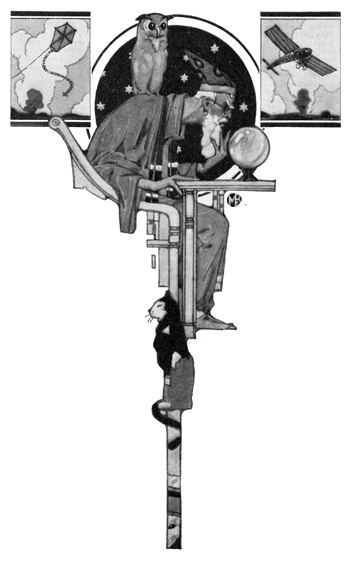
“Prophecy may vary between being an intellectual amusement and a serious occupation; serious not only in its intentions, but in its consequences,” H.G. Wells wrote in 1916. “For it is the lot of prophets who frighten or disappoint to be stoned. But for some of us moderns, who have been touched with the spirit of science, prophesying is almost a habit of mind. … The scientific training develops the idea that whatever is going to happen is really here now — if only one could see it. And when one is taken by surprise the tendency is not to say with the untrained man, ‘Now, who’d ha’ thought it?’ but ‘Now, what was it we overlooked?’”
This was how Wells began his forecast of the remaining days and aftermath of the world’s first great war. The article was part of a 10-part series titled “What Is Coming?,” which appeared in The Saturday Evening Post in 1916.
The author had already established a reputation for prediction, based on books like The Time Machine (1895) and The War of the Worlds (1898). And he seemed a good fit to predict the outcome of World War I.
But in 1916 when the series was released, the war was far from over. After the article below (the second in the series) was published, the line of battle that stretched from the Swiss border to the English Channel would move no more than a few miles in the following 35 months. Though Wells did not predict how long the war would last, he was proved right about its ultimate conclusion: The end of the war would be “no longer about victories or conquest but about securing … the best chances of rapid economic recuperation and social reconstruction.”
What Is Coming: The End of the War
By H. G. Wells
Originally published on January 15, 1916
The prophet who emerges with the most honor from this war is [Ivan Stanislavovich] Bloch. It must be fifteen or sixteen years ago since this gifted Russian made his forecast of the future. Perhaps it is more, for the French translation was certainly in existence before the Boer War. His case was that war between fairly equal antagonists must end in a deadlock because of the continually increasing defensive efficiency of entrenched infantry. This would give the defensive an advantage over the most brilliant strategy and over considerably superior numbers that would completely discourage all aggression. He concluded that war was played out.
His book was very carefully studied in Germany. As a humble follower of Bloch I did not realize this, and that failure led me into some unfortunate prophesying at the outbreak of the war. I judged Germany by the Kaiser, and by the Kaiser-worship which I saw in Berlin. I thought that he was a theatrical person who would dream of vast attacks and tremendous cavalry charges, and that he would lead Germany to be smashed against the allied defensive in the West, and to be smashed so thoroughly that the war would be over. I did not properly appreciate the more studious and more thorough Germany that was to fight behind the Kaiser and thrust him aside, the Germany we English fight now, the Ostwald-Krupp Germany of 1915. That Germany, one may now perceive, had read and thought over and thought out the Bloch problem. There was also a translation of Bloch into French. In English a portion of his book was translated for the general reader and published with a preface by the late Mr. W.T. Stead. It does not seem to have reached our military authorities, nor was it published here with an instructive intention. As an imaginative work it would have been considered worthless and impracticable.
Getting Military Science Up to Date
But it is manifest now that if the Belgian and French frontiers had been properly prepared — as they should have been prepared when the Germans built their strategic railways — with trenches and gun emplacements and secondary and tertiary lines, the Germans would never have got fifty miles into either France or Belgium. They would have been held at Liege and in the Ardennes. Five hundred thousand men would have held them indefinitely. But the Allies had never worked out trench warfare; they were unready for it, the Germans knew of their unreadiness, and upon this unreadiness it is quite clear they calculated. They did not reckon, it is now clear that they were right in not reckoning, the Allies as contemporary soldiers. They were going to fight a 1900 army with a 1914 army, and their whole opening scheme was based on the conviction that the Allies would not entrench. Somebody in those marvelous maxims from the Dark Ages that seem to form the chief reading of our military experts said that the army that entrenches is a defeated army. The silly dictum was repeated and repeated after the Battle of the Marne. It shows just where our military science had reached in 1914 — namely, to a level a year before Bloch wrote. So the Allies retreated. For long weeks the Allies retreated out of the west of Belgium, out of the north of France, and for rather over a month there was a loose, mobile war — as if Bloch had never existed. The Germans were not fighting the 1914 pattern of war, they were fighting the 1899 pattern of war, in which direct attack, outflanking, and so on were still supposed to be possible; they were fighting confident in their overwhelming numbers, in their prepared surprise, in the unthought-out methods of their opponents. In the Victorian war that ended in the middle of September they delivered their blow, they overreached, they were successfully counterattacked on the Marne, and then abruptly — almost unfairly it seemed to our sportsmanlike conceptions — they shifted to the game played according to the very latest rules of 1914. The war did not come up to date until the Battle of the Aisne. With that the second act of the great drama began.
I do not believe that the Germans ever thought it would come up to date so soon. I believe they thought that they would hustle the French out of Paris, come right up to the Channel at Calais before the end of 1914, and then entrench, produce the submarine attack and the Zeppelins, working from Calais as a base, and that they would end the war before the spring of 1915 — with the Allies still a good fifteen years behindhand. I believe the Battle of the Marne was the decisive battle of the war, in that it shattered this plan, and that the rest of the 1914 fighting was Germany’s attempt to reconstruct their broken scheme in the face of an enemy who was continually getting more and more nearly up to date with the fighting. By December, Bloch, who had seemed utterly discredited in August, was justified up to the hilt. The world was entrenched at his feet. By May the lagging military science of the British had so far overtaken events as to realize that shrapnel was no longer so important as high explosive, and within a year the significance of machine guns, a significance thoroughly ventilated by imaginative writers fifteen years before, was being grasped by our conservative but by no means inadaptable leaders.
The war since that first attempt, admirably planned and altogether justifiable — from a military point of view, I mean — of Germany to “rush” a victory has consisted almost entirely of failures on both sides either to get round or through or over the situation foretold by Bloch. There has been only one marked success — the German success in Poland due to the failure of the Russian munitions. Then for a time the war in the East was mobile and precarious while the Russians retreated to their present positions, and the Germans pursued and tried to surround them. That was a lapse into the pre-Bloch style. Now the Russians are again entrenched, their supplies are restored, the Germans have a lengthened line of supplies, and Bloch is back upon his pedestal so far as the Eastern theater goes. Bloch has been equally justified in the Anglo-French attempt to get round through Gallipoli.
The forces of the India Office have pushed their way through unprepared country to Bagdad, but from the point of view of the main war that is too remote to be considered either getting through or getting round; and so, too, the losses of the German colonies and the East African war are scarcely to be reckoned with in the main war. They have no determining value. There remains the Balkan struggle. But the Balkan struggle is something else; it is something new. It must be treated separately. It is a war of treacheries and brags and appearances. It is not a part of, it is a sequence to, the deadlock war of 1915.
But before dealing with this new development it is necessary to consider certain general aspects of the deadlock war. It is manifest that the Germans hoped to secure an effective victory in this war before they ran up against Bloch. But, reckoning with Bloch as they certainly did, they hoped that even in the event of the war getting to earth it would still be possible to produce novelties that would sufficiently neutralize Bloch to secure a victorious peace. With unexpectedly powerful artillery suddenly concentrated, with high explosives, with asphyxiating gas, with a well-organized system of grenade-throwing and mining, with attacks of flaming gas, and above all with a vast munition-making plant to keep them going, they had a very reasonable chance of hacking their way through.
The Teutonic Air Path
Against these prepared novelties the Allies have had to improvise, and on the whole the improvisation has kept pace with the demands made upon it. They have brought their military science up to date, and today the disparity in science and equipment between the antagonists has greatly diminished. There has been no escaping Bloch, after all, and the deadlock, if no sudden peace occurs, can end now in only one thing — the exhaustion in various degrees of all the combatants and the succumbing of the most exhausted. The idea of a conclusive end of the traditional pattern to this war, of a triumphal entry into London, Paris, Berlin or Moscow, is to be dismissed altogether from our calculations. The end of this war will be a matter of negotiation between practically immobilized and extremely shattered antagonists.
There is, of course, one aspect of the Bloch deadlock that the Germans at least have contemplated. If it is not possible to get through or round, it may still be possible to get over. There is the air path. This idea has certainly taken hold of the French mind, but France has been too busy and is temperamentally too economical to risk large expenditures upon what is necessarily an experiment. The British are too conservative and skeptical to be the pioneers in any such enterprise. The Russians have been too poor in the necessary resources of mechanics and material. The Germans alone have made any sustained attempt to strike through the air at their enemies beyond the war zone. Their Zeppelin raids upon England have shown a steadily increasing efficiency, and it is highly probable that they will be repeated on a much larger scale before the war is over. Quite possibly, too, the Germans are developing an accessory force of large aeroplanes to cooperate in such an attack. The long coasts of Britain, the impossibility of their being fully equipped throughout their extent, except at a prohibitive cost of men and material, to resist invaders, expose the whole length of the island to considerable risk and annoyance from such an expedition. But it is doubtful if the utmost damage an air raid is likely to inflict upon England would count materially in the exhaustion process, and the moral effect of these raids has been, and is likely to be, to stiffen the British resolution to fight this war through to the conclusive ending of any such possibilities. The best chance for the aircraft was at the beginning of the war, when a surprise development might have had astounding results. That chance has gone by. Nor is there anything on or under the sea that seems likely now to produce decisive results. We return from these considerations to a strengthened acceptance of Bloch.
The essential question for the prophet remains, therefore, the question of which group of Powers will exhaust itself most rapidly. And, following on from that, comes the question of how the successive stages of exhaustion will manifest themselves in the combatant nations. The problems of this war, as of all war, end as they begin in national psychology.
But it will be urged that this is reckoning without the Balkans. I submit that the German thrust through Serbia is really no part of the war that has ended in the deadlock of 1915. Here there is no way round or through to any vital center of Germany’s antagonists. It turns nothing; it opens no path to Paris, London or Petrograd. It is a long, long way from the Danube to either Egypt or Bagdad, and there and there — Bloch is waiting. I do not think the Germans have any intention of so generous an extension of their responsibilities. The Balkan complication is no solution of the deadlock problem.
A whole series of new problems are opened up directly as we turn to this most troubled region — problems of the value of kingship, of nationality, of the destiny of such cities as Constantinople, which from their very beginning have never had any sort of nationality at all; of the destiny of countries such as Albania, where a tangle of intense tribal nationality is distributed in spots and patches, or Dalmatia, where one extremely self-conscious nation and language is present in the towns and another in the surrounding country, or Asia Minor, where no definite, national boundaries, no religious, linguistic or social homogeneities, have ever arisen since the Roman legions beat them down. But all these questions can really be deferred or set aside in our present discussion. Whatever surprises or changes this last phase of that blood-clotted melodrama, the Eastern Empire, may involve, they will not alter the essential fact of the great war, they will but assist and hasten on the essential conclusion of the great war, that the Central Powers and their pledged antagonists are in a deadlock, unable to reach a decision, and steadily, day by day, hour by hour, losing men, destroying material, spending credit, approaching something unprecedented, unknown, that we try to express to ourselves by the word exhaustion.
The Rigors of a War of Attrition
Just how the people who use the word so freely are prepared to define it is a matter for speculation. The idea seems to be a phase in which the production of equipped forces ceases through the using up of men or material or both. If the exhaustion is fairly mutual it need not be decisive for a long time. It may mean simply an ebb of vigor on both sides, unusual hardship, a general social and economic disorganization and grading down. The fact that a great killing off of men is implicit in the process, and that the survivors will be largely under discipline, militates against the idea that the end may come suddenly through a vigorous revolutionary outbreak. Exhaustion is likely to be a very long and very thorough process extending over years. A “war of attrition” may last into 1918 or 1919, and may bring us to conditions of strain and deprivation still only very vaguely imagined. What happens in the Turkish Empire or India or America or elsewhere may accelerate or retard or extend the area of the process, but is quite unlikely to end it.
Let us ask now which of the combatants are likely to undergo exhaustion most rapidly, and, what is of equal or greater importance, which is likely to feel it first and most. No doubt there is a bias in my mind, but it seems to me that the odds are on the whole against the Central Powers. Their peculiar virtue, their tremendously complete organization which enabled them to put so large a proportion of their total resources into their first onslaught and to make so great and rapid a recovery in the spring of 1915, leaves them with less to draw upon now. Out of a smaller fortune they have spent a larger sum. They are blockaded to a very considerable extent, and against them fight not merely the resources of the Allies, but, thanks to the complete British victory in the sea struggle, the purchasable resources of all the world. Conceivably they will draw upon the resources of their Balkan allies, but the extent to which they can do that may very easily be overestimated. There is a limit to the power for treason of these supposititious German monarchs that British folly has permitted to possess these Balkan thrones, and none of the Balkan peoples is likely to witness the complete looting of its country in the German interest by a German court with enthusiasm.
Germany will have to pay on the nail for most of her Balkan help. She will have to put more into the Balkans than she takes out. And compared with the world behind the Allies the Turkish Empire is a country of mountains, desert and undeveloped lands. To develop these regions into a source of supplies under the strains and shortages of wartime will be an immense and dangerous undertaking for Germany. She may open mines she may never work, build railways that others will enjoy, sow harvests for alien reaping. And for all these tasks she must send men. Men?
At present, so far as any judgment is possible, Germany is feeling the pinch of the war much more even than France, which is habitually parsimonious, and Russia, which is hardy and insensitive. Great Britain has really only begun to feel the stress. She has probably suffered economically no more than Holland or Switzerland, and Italy and Japan have certainly suffered less. All these countries are full of men, of gear, of salable futures. In every part of the globe Great Britain has colossal investments. She has still to apply the great principle of conscription, not only to her sons but to the property of her overseas investors and of her landed proprietors. She has not even looked yet at the German financial expedients of a year ago. She moves reluctantly but surely toward such a thoroughness of mobilization. There need be no doubt that she will completely socialize herself, completely reorganize her whole social and economic structure, sooner than lose this war. She will do it clumsily and ungracefully, with much internal bickering, but not so slowly as a logical mind might anticipate.
Germany then, I reckon, will become exhausted first among all the combatants. I think, too, that she will as a nation feel and be aware of what is happening to her sooner than any other of the nations that are sharing in this process of depletion. In 1914 the Germans were reaping the harvest of forty years of economic development and business enterprise. Property and plenty were new experiences, and a generation had grown up in whose world a sense of expansion and progress was normal. There existed no tradition of the great hardship of war, such as the French possessed, to steel their minds. They came into this war more buoyantly and confidently than any other people. Neither great victories nor defeats have been theirs, but only a slow vast transition from joyful effort to hardship, loss and loss and loss of substance, the dwindling of great hopes, the realization of ebb in the triumphant tide of national welfare. They are under stresses now as harsh as the stresses of France.
The First Heralds of Peace
We know little of the psychology of this new Germany that has come into being since 1871, but it is doubtful if it will accept defeat and still more doubtful how it can evade some ending to the war that will admit the failure of all its great hopes of Paris subjugated, London humbled, Russia suppliant, Belgium conquered. Such an ending will be a day of reckoning that German imperialism will postpone until the last hope of some breach among the Allies, some saving miracle in the old Eastern Empire, some dramatically snatched victory at the eleventh hour, is gone. Nor can the Pledged Allies consent to a peace that does not involve the evacuation and compensation of Belgium and Serbia, and at least the autonomy of the lost provinces of France. Those are the ends of the main war. Europe will go down through stage after stage of impoverishment and exhaustion until these ends are attained or made forever impossible.
But these things form only the main outlines of a story with a vast amount of collateral interest. It is to these collateral issues that the amateur in prophecy must give his attention. It is here that the German will be induced by his government to see his compensations. He will be consoled for the restoration of Serbia by prospect of future conflicts between Italian and Jugoslav that will let him in again to the Adriatic. His attention will be directed to his newer, closer association with Bulgaria and Turkey. In those countries he may yet repeat the miracle of Hungary. He will hope also to retain his fleet, and no peace, he will be reminded, can rob him of his hard-earned technical superiority in the air. The German Air Fleet of 1930 may yet be something as predominant as the British Navy of 1915. Had he not better wait for that? When such ideas as these become popular in the German press we may begin to talk of peace, for these will be its necessary heralds. The concluding phase of a process of general exhaustion must almost inevitably be a game of bluff. Neither side will admit its extremity. Neither side, therefore, will make any direct proposals to its antagonists nor any open advances to a neutral. But there will be much inspired peace talk through neutral media, and the consultations of the anti-German allies will become more intimate and detailed. Suggestions will “leak out” remarkably from both sides, to journalists and neutral go-betweens. The Eastern and Western Allies will probably begin quite soon to discuss a Zoilverein and the coordination of their military and naval organizations in the days that are to follow the war. A general idea of the possible rearrangement of the European states after the war will grow up in the common European and American mind; public men on either side will indicate concordance with this general idea, and some neutral power will invite representatives to an informal discussion of these possibilities. Probably, therefore, the peace negotiations will take the extraordinary form of two simultaneous conferences: one, of the Pledged Allies, sitting probably in Paris or London; and the other, of representatives of all the combatants, meeting in some neutral country — probably Holland will be the most convenient — while the war will still be going on. The Dutch conference will be in immediate contact by telephone and telegraph with the Allied conference and with Berlin.
The broad conditions of a possible peace will begin to get stated toward the end of 1916, and a certain lassitude will creep over the operations in the field. The process of exhaustion will probably have reached such a point by that time that it will be a primary fact in the consciousness of common citizens of every belligerent country. The common life of all Europe will have become — miserable. Conclusive blows will have receded out of the imagination of the contending powers. The war will have reached its fourth and last stage as a war. The war of the great attack will have given place to the war of the military deadlock; the war of the deadlock will have gone on, with a gradual shifting of the interest to the war of treasons and diplomacies in the Eastern Mediterranean; and now the last phase will be developing into predominance, in which each nation will be most concerned, no longer about victories or conquest but about securing for itself the best chances of rapid economic recuperation and social reconstruction. The commercial treaties, the arrangements for future associated action, made by the great Allies among themselves will appear more and more important to them, and the mere question of boundaries less and less. It will dawn upon Europe that she has already dissipated the resources that have enabled her to levy the tribute paid for her investments in every quarter of the earth, and that neither the Germans nor their antagonists will be able for many years to go on with those projects for world exploitation which lay at the root of the great war. Very jaded and anemic nations will sit about the table on which the new map of Europe will be drawn. Each of the diplomatists will come to that business with a certain preoccupation. Each will be thinking of his country as one thinks of a patient of doubtful patience and temper who is coming out of the drugged stupor of a crucial, ill-conceived and unnecessary operation. Each will be thinking of Labor, wounded and perplexed, returning to the disorganized factories from which Capital has fled.
Vietnam Vets: ‘Why We Chose to Serve’
It’s not unusual for vets in uniform to be stopped by strangers and told how much their service is valued, especially around Veterans Day. But Americans weren’t always grateful to the men and women who served in the military. In the late 1960s and early ’70s, some treated Vietnam veterans with indifference or even blatant hostility.
The country had been generally supportive of the Vietnam War in its early days. An October 1965 Post survey found 65 percent of Americans ready to extend the Vietnam War another four to five years. And 59 percent were willing to escalate it, “even if it means bombing Hanoi and Red China.” But enthusiasm faded as the country learned the harsh realities of the fighting. In time, some Americans extended their resentment of the war to the men who were fighting it. The war became an uncomfortable fact, and its veterans were given scant recognition for their service.
Below, five Vietnam veterans share thoughts about service to country, the public’s reaction to their service, and how it shaped their thoughts on war today.
Charles Boland, Corporal, USMC
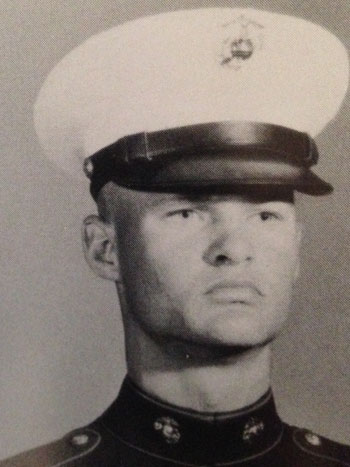
Making a choice: “I knew the chances were quite high that I’d be drafted, and I always wanted to be a Marine. … There is no other service with its history of the esprit de corps. When you enlist in the Marines, you’re changed forever.”
Public reactions: “I was wounded, evacuated, and sent home. … I remember being confronted by a woman. She asked me how I’d been hurt. When I told her I’d been wounded in Vietnam, she said, ‘I wish you’d been killed.’ Until then, I hadn’t been confronted by hatred.
“People walk up to you now and say, ‘Thanks for your service.’ But some vets get mad when they hear this. They tell me they get the feeling what’s really being said is ‘thank you for serving so I didn’t have to.’”
Serving the country: “Just paying your taxes is like buying a substitute to take your place in the Civil War. … I think there should a greater sense of service to country … in the Peace Corps, in communities, assisting other people, volunteering at VA hospitals to free up the staff, not just in the military.”
Reflecting on the war: “Too many people are willing to go to war at the drop of the hat. They’re not really willing to look at what’s going on.”

Dave Beyerlein, Infantry Sergeant, USMC
Making a choice: “I joined in March of 1966 with a buddy in Portland. The Marines grew me up and gave me respect for authority.”
Public reactions: “There was no respect for time spent and sacrifices made. We caught a lot of crap from people. At least one person called me a baby killer.
“It took decades for America’s thinking to come around so people could recognize that we [veterans] were just slobs who got caught in the war. Problem is, it took a lifetime to for that to happen.”
Serving the country: “I believe everyone should spend two years in service to our country. If you’re just along for a free ride, you don’t understand what you’re getting for free. It doesn’t have to be the military; it can be any service. But it gives you ownership. It will give you a different perspective and you’ll value your citizenship more.”
Reflecting on the war: “I’m so antiwar now it’s crazy. The war we were in was totally worthless. It was what, 58,000 dead? And now Vietnam’s one of our trading partners, and they’re still communist.”
Randolph Schiffer, First Lieutenant, USMC, Commander, USN Reserves
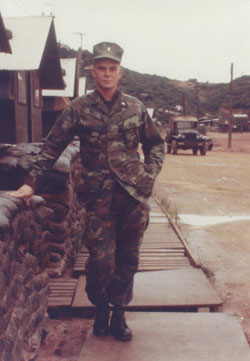
Making a choice: “For young men in America in the 1960s, the Vietnam War was the central issue. … I wanted to face this issue squarely. … I [joined the Marines] to make a statement to myself about duty, honor, and loyalty to country.”
Public reactions: “I was accepted at three top-tier medical schools before I went, but when I returned two of those three refused to reaccept me, as did seven others to which I applied. The sentiment in the medical schools was exemplified by the admissions committee feedback given to me in person by Harvard. ‘We’re not taking you because you’re a Vietnam veteran,’ they said. When I asked what specifically it was about the veteran part, they said, ‘We just don’t think a Vietnam veteran could do the work at Harvard Medical School.’
“There has been a complete inversion in Americans’ attitude toward veterans. People who return from the Mideast war can’t walk into a room without hearing ‘thanks for your service.’ I didn’t hear that when I came back in 1972.
“I believe what we’re seeing here is the national guilt and shame about the way they treated people like me in the 1960s. … Now I get admiration for my service, but it was a long road to getting it.”
Reflecting on the war: “Eisenhower said the most powerful military force is an aroused democracy. We don’t have that now. … The wealthy, powerful, and white, in many cases, are saying ‘I don’t want to serve in military.’ We have a professional military. It’s smaller and better paid, but not diverse enough to be representative of the country.”
Ted Decker, Corporal E4, USMC
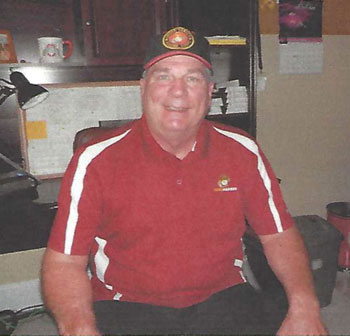
Making a choice: “I’d decided that, if I was going to serve, I’d serve as a Marine … all the while knowing there was a good chance I was going to Vietnam. … I take great pride in it [my service]. But military life is not for everyone. We, as a nation, have to respect people who do that. It’s a hard life.”
Public reactions: “Back then, vets were looked on with disdain. Vets today are treated with more respect. I think we paid for it.”
Serving the country: “I had a chance to see different cultures, and I realized that ours is a great country. I didn’t appreciate the simple things until I had to do without them. … I think every young man or woman should spend at least a year in service, in some form, whether in the Peace Corps or some such organization.”
Reflecting on the war: “After the death and atrocities I’ve seen, I wonder why God spared me. I came close to death so many times. But when I look at my son and three grandsons, I know.
“I don’t think we should ever forget Vietnam. What that war did was make us a nation that’s afraid to act until it’s too late. We keep waiting and hoping things will get better.”
Andres Vaart, Captain, USMC
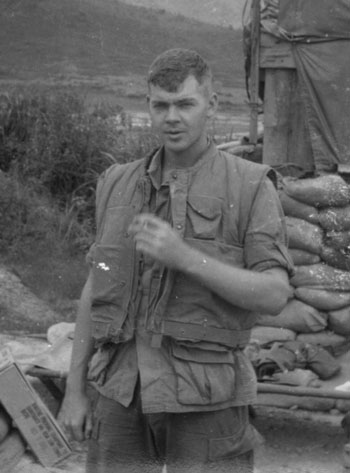
Making a choice: “I was an immigrant [from Estonia]. My mother and I were fortunate enough to get to the U.S. in 1950. I felt strongly that military service was the right thing, knowing what it was like to be occupied by Soviet Union. … I was interested in joining the Marines. I knew we’d be going to Vietnam, but I would be going into service to fight communism. It didn’t matter where.”
Serving the country: “To me, the idea of universal service to the nation is a very reasonable one, whether in the military or somewhere else.”
Reflecting on the war: “In those days, there was one big enemy. We got used to the big enemy we had to unify to oppose. Now I wonder if we got into that habit of thinking: We now leap to the idea of that one big thing, whether it’s the Chinese, Islam, or general terrorism.
“I sometimes wonder about the most powerful nation on earth being the most fearful nation. I think we should respond to challenges with something other than fear — rather a sense of acceptance and some confidence we know how to deal with problems.”
Is World War I Relevant?
“Is anything about World War I even relevant today?”
I’ve often been asked that question since I began this blog last fall. I’ve asked it myself. Is there anything we can learn from 100-year-old wartime experiences?
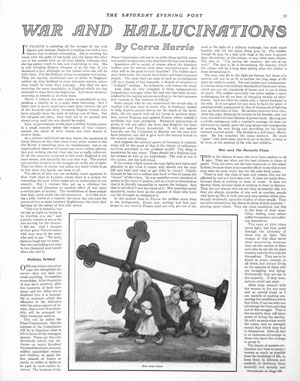
After reading “War and Hallucinations,” by Corra Harris, I can now answer with an assured yes. Because Harris, though writing 100 years ago, describes the challenge we still face in coming to terms with war and terror.
Back in 1915, American newspapers continued to publish atrocity stories from Europe. The German army was accused of mass executions, rape, and slaughtering children. Journalists couldn’t confirm or deny the reports coming out of Europe, but that didn’t prevent American newspapers from repeating the stories.
Harris didn’t believe the horror stories. Rather than recount them again, she gave her opinion of where they came from, and why so many people believed them. The war, she wrote, had caused the people of Belgium, France, and England to lose some of their sanity:
From the day I entered the war zone till this one upon which I take my departure from it I have been aware of a certain psychic condition, difficult to describe yet so powerful that no one can escape its influence … as if all thought had lost its shape, and reason was no longer reasonable. As if all men and all women were somnambulists walking in a black dream.
They speak with calmness of things so horrible that one is amazed that they do not shriek and wring their hands. And one is still more amazed at having the power to listen with calmness. We see terrible sights, we hear of them, we think of nothing else, and yet we do not go mad. For where everybody is mad no one is.
The French newspapers had carried the news of thousands being killed at the front, and an unstoppable German army was marching on Paris. Fear overpowered reason. The citizens’ anxieties were fed by the terrifying stories — “hallucinations” Harris called them — from refugees arriving in the cities.
Harris described Lille refugees traveling for days, defenseless and hungry, with artillery fire from both sides exploding around them. They knew the Germans were right behind them, and they weren’t permitted to stop in towns along the way. They might collapse in exhaustion in a ditch for a few hours’ sleep, but they’d awake at a strange sound or a suspicious form in the darkness. And as they resumed their march, they picked up bits of conversation from other refugees to weave them into their own fearful imaginings.
When they finally came upon relief workers, they recounted their journeys with a vividness that reflected their terror more than their reality. “The awful thing about war for the helpless,” she wrote, was that war “is what they fear, intensified by the horrible things they have heard.”
It wasn’t just refugees. Harris remembered soldiers claiming to have seen 10,000 men killed every day in one battle. The rivers near Calais, they said, were clogged with the bodies of dead Germans. Calmer observers coming on the scene after the fighting found nothing to justify these claims. These “hallucinations” were the attempts of Frenchmen, who had led routine, peaceful lives before the war, to describe the spectacular horrors of what they’d seen.
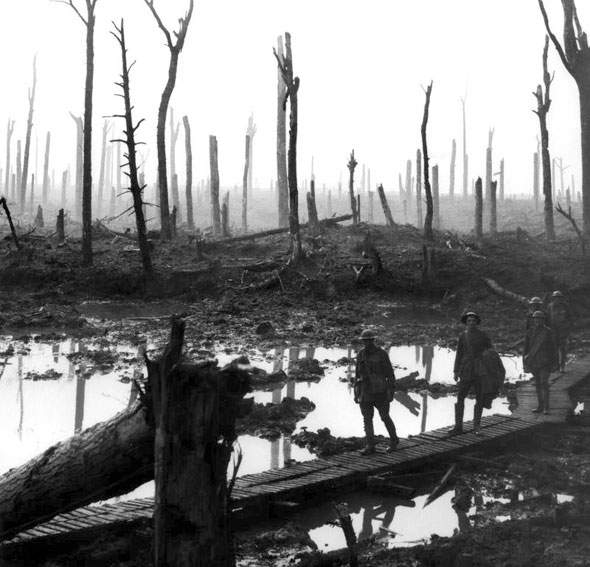
(Wikimedia Commons)
“When 70,000 Indian troops landed at Marseilles it was incredible,” Harris added. “The sight fired the imagination, so we heard that a force of 800,000 Japanese were already on their way to join the Allied Armies. Only 800,000! You get the contagion for using big numbers from reading the papers and from listening to the average man talk. Figures, which in normal times are supposed not to lie, have become the medium of fiction in this war.”
This exaggerated language was another sign of the derangement from war, Harris wrote. “Language is … designed to convey the commonplace meanings of life.” But the Europeans were experiencing such atrocities that their minds were “completely divorced from reality, because reality itself surpasses the power of even imagination to conceive.” And language became “the war currency of a bankrupt nation. It has no value. All the lies that words can frame are floating in this atmosphere. The truth itself is the greatest fabrication of all, because it belies all we have called truth.”
Today, it’s difficult to keep a sense of proportion when we think of 9/11, the Boston Marathon bombing, or the grisly murders of captives in the Middle East. We calmly discuss these events, and even try joking about them, as if to laugh off our worries. But the uncertainty and anxiety remain because the limits of the-worst-that-could-happen have been pushed far back. Faceless enemies and random attacks have eroded our sense of what to expect, or whom to trust. When reason can’t make sense of our world, dread and fear can take over.
As Harris noted in 1915, “Every ideal by which men aspired and lived is changed. Nothing is familiar and no man is sane — because imagination rules.”
Step into 1915 with a peek at these pages from The Saturday Evening Post February 13, 1915 issue.
The Great War’s Forgotten Allies
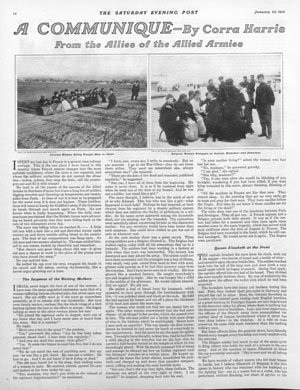
London and Paris seemed like separate worlds to Post reporter Corra Harris in early 1915. The French capitol was a somber city of limping soldiers, military funerals, and shop window displays where haute couture had been replaced by mourning suits. Across the English Channel, London still looked bright and prosperous. Spirits were generally high since highly censored news kept Londoners from knowing much about the reality of the war.
Both Allied capitols had one feature in common, according to Harris. Each was neglecting their soldiers’ families.
When war began, the French and British had rallied to provide food, clothing, and medical supplies for their soldiers. But little help was available for French soldiers’ wives and children. In France, many soldiers’ families were left behind on farms that could no longer be worked. Their fields were now taken up with trenches, shell holes, and “graves so shallow that to dig at all is to uncover the dead,” Harris wrote in “A Communiqué from the Allies of the Allied Armies” (The Saturday Evening Post, January 23, 1915).
Of France’s rural communities Harris wrote:
There is no money, scarcely any stock with which to cultivate the remainder. All the horses fit for work have been taken by the French or stolen by the Germans. And many of the peasants in Northern France are in danger of freezing to death, even if they have food, for every blanket, quilt, sheet and mattress has been taken from them, even the straw from which they might make beds. …
War is not the worst thing these people face. Pestilence, that poisoned breath of death, is far more terrible. Lille is closed now like a tomb filled with corruption. No one may enter it, and those who remain there cannot escape. Every hospital and every house is overflowing with victims of the fever scourge.
It is impossible to exaggerate the ravages of disease in many of these towns bombarded by the Germans. There were 1,300 cases of typhoid fever in Senlis and the neighboring villages during the month of October. The germs of every disorder fill the air. … They poison all the milk. To touch one’s lips with bread in these places is to invite death.
The women consider themselves fortunate to escape these horrors by coming to Paris. For Paris is still clean. The water is pure. The great Rothschild depots supply milk which is not tainted. There is still bread enough. …
The war orphans suffered the worst, Harris wrote. War might turn men into “cannon fodder, but it changed children into “gutter straw.”
One of the last things I saw in France was a dozen Red Cross orderlies and nurses having their breakfast in a comfortable hotel. Just inside the door of this room three children stood regarding them with hungry eyes. They were in rags. Their faces were emaciated and they were trembling with cold. They were orphans. Their father had been killed in Alsace-Lorraine. They were not begging; they had not learned how yet. They were just learning how to be hungry, and patient.
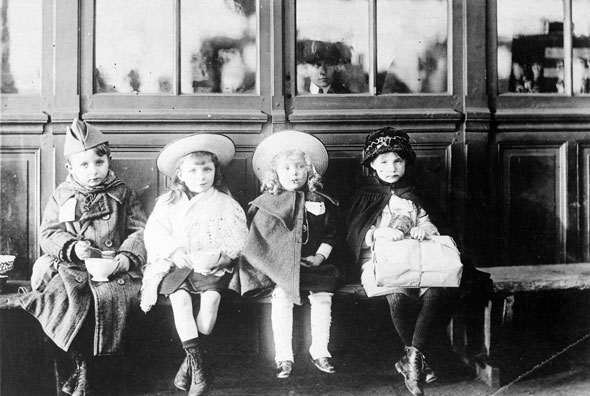
(Wikimedia Commons)
In London, Harris found members of the British ruling class still preoccupied with class privileges and dress codes. Members of Parliament were debating whether to deprive the poor children in workhouses of their Christmas morning egg to teach them a lesson about the hardships of war. And they discussed what pensions they should give to soldiers’ widows. One member declared that the officers’ widows should receive enough of a pension that they wouldn’t have to enter the work force. In Harris’ account, Prime Minister Asquith seemed to agree:
He was willing that the officers’ widows should be kept out of the labor market, but he thought there were objections to making a common soldier’s widow independent.
What he meant was that all the working classes ought to work for their living. Still, if anyone has earned the right of choice in her mode of living as is conferred by a pension that will maintain her, it is surely the woman who has made the greatest sacrifice that the state can ask, whether she is the widow of an officer or of a private!
Many women in British society were signing up to nurse wounded soldiers. But what these soldiers really needed were doctors and trained nurses, Harris wrote.
“[The aristocratic lady] would serve better if she spent herself and her money caring for the poor women and children in England who are more and more neglected as the war goes on. … For every wounded soldier there are perhaps 50 women and children suffering for the necessities of life. The war office does not protect them. There is no commissary department to provide them with food or clothes, no surgeons or doctors or nurses to attend them in sickness.
Meanwhile, members of the ruling class were complaining that social standards were slipping in wartime.
It seems that the men are not so particular about putting on their evening clothes when they dine. Lady Somebody has entered a solemn protest in [The London Times] calling attention to this. She adds, referring to a certain fashionable café, that it “looks like an American restaurant at the dinner hour because the men are so awfully dressed!”
The subject of dress codes launched Ms. Harris into a rather heated rant about women’s fashions and effeminate men.
It does give one a start to see at the next table an officer of a Highland regiment, clad in a khaki coat and terrifyingly short kilts, with his legs bare very far up and very far down. But, when you put your whole reasonable mind upon it, why should not a man show his mighty legs in a room filled with women who are exposing their shoulders behind down nearly to the waistline?
Besides, that Highlander looks more the part of what a man should be here now than the perfumed English Lord Dandy at the next table, with his receding chin, his womanish hands, and his pink face that has never been exposed to the disgusting grime of powder smoke.
A woman must hate war; but my idea is that if a nation makes up its mind to fight it should have conscription for the gentlemen dandies, and it should hold in reserve these better, bare-legged, long-chinned men for the sake of preserving the breed in the next generation.
Step into 1915 with a peek at these pages from The Saturday Evening Post January 23, 1915 issue.
On the Sidelines, Mussolini Awaits His Opportunity
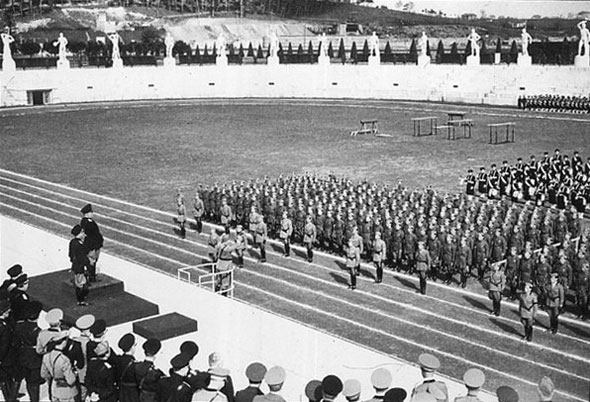
( via Wikimedia Commons)
You may have seen the photos of Benito Mussolini’s messy demise. The photos show the corpse of Italy’s ex-dictator, shot, beaten, and kicked, hanging upside down from the roof of a gas station. Seeing the brutality of his death, you get a sense of how fiercely the Italians hated the man who had dragged their country into a war that brought only poverty, disgrace, and death to their land.
Once Mussolini had enjoyed broad support in Italy. He presented himself as the savior of the country, promoting fascism as the solution for the country’s problems. He inspired young Italians to join forces, donning the black shirts of the fascist party members. He also inspired a young Austrian named Adolf Hitler, who looked up to Mussolini as a role model.
But Hitler was a fanatic. Mussolini was an opportunist. And nothing illustrated his opportunism better than his actions in 1939. In May of that year, he and Hitler signed an alliance in which they pledged to come to each other’s aid in the event of war.
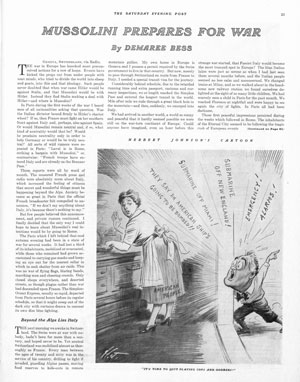
Furthermore, the agreement “stipulated that neither of the parties would take action within the next three years [to] cause war in the West,” wrote Post correspondent Demaree Bess. [Read the entire article “Mussolini Prepares for War” from the Nov. 18, 1939 issue of the Post here.] Mussolini needed that delay. His advisors had told him Italy wouldn’t be ready to launch a war before 1942.
Not surprisingly, Hitler ignored this clause in the agreement when, just four months later, he declared war on Poland. As his army launched its blitzkrieg, the world looked to his ally Mussolini. What would Il Duce (the Italians title for “the leader) do now?
Bess was hearing all sorts of wild rumors of possible alliances and confrontations—an alliance between France and Italy, war between France and Italy, even an attack from Germany. “I finally decided that the only way I could hope to learn about Mussolini’s real intentions would be by going to Rome,” he wrote.
Bess left a darkened, huddled Paris that anticipated German bombers at any moment. Traveling south, he found Italy sunny and peaceful. “As we walked about in the handsome new [Milan] railway station, we found ourselves delighted at the sight of so many little children. We had scarcely seen a child in Paris for the past month. We reached Florence at nightfall and were happy to see again the city of lights.”
The Italians were happy again with il Duce, then regarded as a man of peace. He was making no overt moves to drag Italy into Hitler’s crusade against France and England. “[Italy] seemed to be in a position to stay neutral as long as she liked — and to make money trading with the belligerents,” Bess wrote. Yet he became convinced that Mussolini had no intention of staying out of the war a moment longer than necessary. “He is standing on the side line now, watching how things go, but he isn’t idle. … He is preparing for war.”
Il Duce had set the country on the road to war many years earlier. “He has raised a whole generation of Italian youth in the faith that they should live dangerously, that pacifism is a vice,” Bess wrote. And now, though Italy was still neutral, Mussolini’s government was starting to ration food for civilians and stockpile it for the army.
Mussolini’s refusal to join Germany’s war prompted some to believe he was reconsidering his alliance with Hitler, which had always been “extremely unpopular with Italians,” Bess wrote. “Italians naturally dislike Germans. The two races don’t get along well together. Germans are impatient with the easygoing temperament of Italians and don’t conceal their impatience. Italians resent German assumptions of superiority merely because they are more efficient.”
For now, the Germans weren’t pressuring Italy to join their fight. In fact, Hitler found Italian neutrality useful. According to Bess, it allowed Mussolini to play a peacemaker who suggested there could be a “settlement of the war in the West, thus enabling Hitler to pose before his own people as a reasonable man who didn’t want to fight Britain and France.”
France and Great Britain were also satisfied with Italian neutrality, since it enabled them to maintain their control of the Mediterranean Sea without having to engage the Italian fleet.
Mussolini was under no pressure to commit Italy to the world war. “He foresaw that no pressure from either side could or would compel him to enter this war until he was ready to move,” Bess wrote. “Germany’s air force might destroy Italian cities, but what could Germany gain from that?”
Mussolini would remain neutral for as long as it was profitable. But Hitler’s swift victory over France led Mussolini to weigh the profits from war versus peace. If he remained out of the fight, his country might continue its gradual rise in prosperity. And he might take up the offer of trading concession in Africa that Great Britain and France would grant if Italy remained neutral.
But if Italy entered the fight, it might be able to share in Germany’s looting of conquered France. All he needed, Mussolini told his military chief, was to lose a few thousand Italian soldiers in the war to earn a share of the spoils at the victor’s table. And then Italy could simply seize whatever African colonies had belonged to the Allies.
Above all, Mussolini became trapped by his own bravado. Having posed as a modern-day Caesar, he needed to prove the might of his country’s forces.
On June 10, 1940, he committed Italy to the war. He sent his soldiers into France, prompting President Roosevelt to comment, “The hand that held the dagger has struck it into the back of its neighbor.”
The decision began a long, sharp decline in the fortunes of both Italy, and Mussolini, who suffered the consequences in Milan at the hands of an enraged mob.
Step into 1939 with a peek at these pages from The Saturday Evening Post 75 years ago:
The Great War: November 14, 1914
In the November 14, 1914, issue: Canada goes to war, Great Britain looks for a new theme song, and a journalist downplays the atrocities of a nation invaded.
Booked Through for the Empire
By Maude Redford Warren
Over in Canada, the war enjoyed just as much support as in England, according to Warren. She wrote about the men she saw in an Ottawa parade of Canadian recruits. Their faces, she wrote, clearly showed“love for the Empire, the loyal urge that makes even a cheap soul worth while and that books their bodies through to the end, whatever it be, so it be for the good of the empire.”
But it wasn’t all flag-waving and happy parade. The author spoke with an elderly woman who had been walking alongside the recruits, among [whom/them] was her grandson. The woman spoke of the price she had paid to uphold the British Empire, and all the wars that were supposed to be the last.
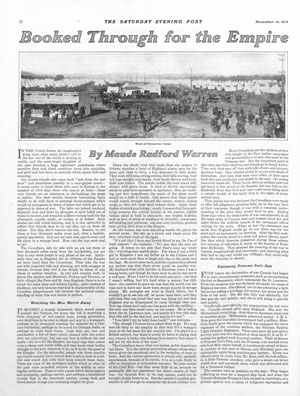
“‘It seems to me now that that’s been my whole life — watching men march away. For when I was a little girl in Kingston I saw my father go to the Crimea and I had no more sense than to laugh and clap at the music and the flags. He never came back, and the comfort they offered my mother was that there never would be another war.
“‘My husband went with Gordon to Khartoum when I was a young bride, and though he came back to me he was never a well man. When I had to do his work and mine — not that I wasn’t willing, but it’s hard when a woman has children — the comfort he gave me was that the world was too wise now to have any more wars, except maybe in savage places.
“‘My youngest son went to South Africa, but I wouldn’t go to see him off; he never came back, and they said then that one proof that war was dying out was that England was so ill-prepared to carry through that one.
“Now my eldest son’s only son has gone with the artillery — the only one that could carry on our name. He is sailing down the St. Lawrence now, and maybe it’s true this time that this will be the last war, and maybe it’s not.’
“‘You didn’t try to hold them back?’ one ventures.
“‘No, though I’d never have asked them to go. If a man sees his duty to his country in that way it’s a woman’s place to do her share for the country too. I’m glad I’m a British subject, but there is surely no harm in saying that any woman is lucky who belongs to a country that doesn’t ask her for the lives of her men.’”
Vox Populi
By Samuel G. Blythe

The Briton spirit was just as determined and confident as the German, Blythe reported.
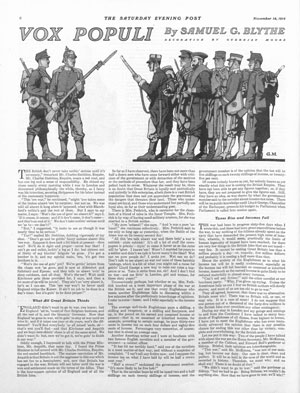
“There is no doubt that Great Britain is loyally and patriotically and unitedly in this enterprise, albeit there is a vast British population that does not yet appreciate the graveness of the dangers that threaten their land. Those who understand are loyal, and those who understand but partially are loyal also, so far as their understanding goes.
“‘This war,’ said [Home Secretary Reginald] McKenna, ‘was not of our seeking, but became our duty. Our case is clear, clean and perfect. It will be so held in the eyes of the world and so recorded in history. Therefore, we must win; and we shall win! There is no doubt of that.’
“‘We didn’t want to go to war,’ said the gardener at Sidcup, ‘but we had to go. Being Britons, we couldn’t do anything else. Now that we have gone to war, we’ll win!’
“Of all the men I talked to that Sunday afternoon there was not one who grumbled over the war, complained about it, bewailed his own hard luck — most of them had been hit one way or another — or expressed any but the most absolute conviction that Great Britain will win the war, and that the German Empire is to be eliminated. I did not find any whiners or any grumblers, or anything but a sort of stolid, philosophical view.”
One of the most discouraging war songs ever written appeared in Great Britain during these months. It was titled, “Your King and Country Need You!”
“This is sung nightly in every music hall and moving-picture show, and is more of a wail than an inciter to gallant deeds of arms.Here is the chorus, which is in slow march time, as the music says, and which the audience are invited to chant slowly with soloists:
“Oh, we don’t want to lose you, but we think you ought to go,
For your King and country both need you so.
We shall want you miss you; but with all our might and main,
We shall cheer you, thank you, kiss you, when you come back again.
“In order that the proprieties may be observed the author supplies a footnote, starred on the word kiss, which says: ‘When used by male voices substitute the word bless for kiss.’
Listen to “Your King and Country Need You!”, recorded by Helen Clark in 1914
Punitives Versus Primitives
By Irvin S. Cobb
Two weeks earlier, Cobb had brought up the topic of wartime atrocities: Germans slaughtering Belgians, and Belgians ambushing, poisoning, and torturing Germans. In this issue he reported on his investigation into the truth behind the rumors.
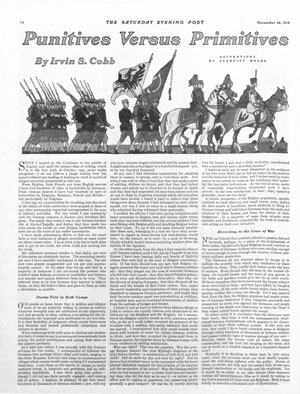
“From Belgian, from French, and from English sources I have had hundreds of tales of barbarities by Germans. From German sources I have had hundreds of tales of barbarities by Belgians, Russians, French and British — but particularly by Belgians. My deliberate personal opinion is that 80 percent of the stories are absolutely untrue.”
Cobb was, at the time of his writing, visiting the German side of the Western Front as a guest of the German army. For this reason, perhaps, he seems to have been quite sympathetic to their claims of innocence.
“I have found extended areas in Belgium through which hundreds of thousands of German soldiers had passed without signs of wanton damage of any sort — districts where the houses were all intact, the crops untrampled, and the fruit left hanging on the trees, and not so much as a window smashed or a haystack toppled over.”
He even seems to accept, with a regretful shrug, the Germans’ execution of a young Belgian woman. He heard the story from a German doctor in the border town of Aachen.
“During the investment and bombardment of the Liege defenses, a battery of German siege guns was mounted in the village of Dolhain. … From the accuracy with which shots from the Liege forts fell among them the Germans speedily became convinced that someone in the village was secretly communicating with the defending fortresses, telling the gunners there when a shell overshot the German lines or fell short. …
“A young girl, the daughter of a well-to-do citizen, was using a telephone that through some oversight the Germans had failed to destroy. From the window of her father’s house she watched the effect of the Belgian shells, and after each discharge she would call the fort in Liege and direct the batteries there how to aim the next time.
“For days she had been risking her life to do this service for her country. She was detected, tried by court-martial, convicted of violating the articles of warfare by giving aid to the enemy, and condemned to be shot. Next morning this girl, blindfolded and with her arms bound behind her, faced a firing squad. As I conceive it, no more heroic figure will be produced in this war than that Belgian girl, whose name the world may never know.
“‘I do not know how the American people will view the execution of military law on that brave young woman,’
said my informant. ‘I do know that the officers who tried her sorely regretted that, under their oaths to do their duty without being influenced by sentiment or by their natural sympathies, they sentenced her to death. They could do nothing else. She had been instrumental in causing the killing and wounding of many of our men. By the rules of war she had risked her life, and she lost it. Our troops … had no right and no power to spare the girl who, over the telephone, directed the fire of our enemies. But if I were a Belgian I would give my last cent to rear a monument to her memory.’”
Cobb never seems to think it outrageous that a young woman helping her country defend itself against an invading army should be executed as a spy or traitor. Yes, the monument idea was a nice touch, but it was a romantic gesture that saved no one’s life. There would be many more before the war ended.
Step into 1914 with a peek at these pages from The Saturday Evening Post 100 years ago.
The Great War: October 17, 1914
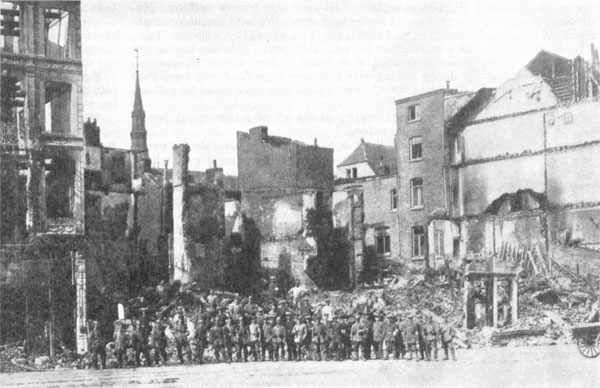
By this week 100 years ago, the war had stopped moving.
After just two months of fighting, the Western Front was locked in a stalemate. For the next four years, there would be no significant movement across a battle line that extended from neutral Switzerland to the coast of the North Sea.
No one had expected this in 1914. Germany had launched its campaign with a bold assault across Belgium. For weeks they pushed back every Allied army in front of them — the Belgian, the French, and the English. The plan called for the German armies to sweep down into France, surround the remaining Allies, and capture Paris.
It might have worked, but a fresh French assault on the right side of the German line caused a split to form between the German armies. The French and British troops rushed into the gap. The German advance halted, then fell back to the Aisne River.
Both sides realized the way ahead was completely blocked, but there was still a chance to move around the enemy. The Germans began rushing to slip around the left side of the British army, while the British tried to slip around the right flank of the Germans. Both armies began racing north, trying to outflank each other. But they only succeeded in extending the battle line all the way across Belgium to the coast.
For the next four years, the Western Front would change very little. (The Eastern Front, between Russia and the Central Powers, would change quite a bit.) At no point would any army be able to shift the front lines more than a few miles, though both sacrificed thousands of men to break the enemy’s line.
Sherman Said It; Looking for War in a Taxicab — and Finding It
By Irvin S. Cobb
Irvin Cobb grabbed a taxicab in Brussels and said, in essence, “Follow that war.” When the driver would go no father, Cobb and his companions continued on foot into a small Belgian town.
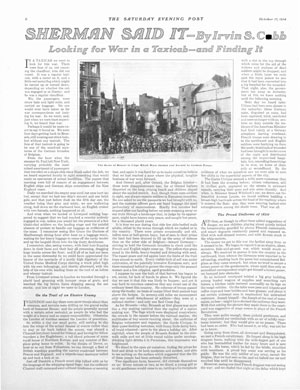
“A minute later … we had gone perhaps 50 feet beyond the mouth of this alley when two men, one on horseback and one on a bicycle, rode slowly and sedately out of another alley, parallel to the first one, and swung about with their backs to us. I imagine we had watched the newcomers for probably 50 seconds before it dawned on any of us that they wore gray helmets and gray coats, and carried arms — and were Germans! Precisely at that moment they both turned so that they faced us; and the man on horseback lifted a carbine from a holster and half swung it in our direction.
“Realization came to us that here we were, pocketed. There were armed Belgians in an alley behind us and armed Germans in the street before us; and we were nicely in between. If shooting started the enemies might miss each other, but they could not very well miss us. Two of our party found a courtyard and ran through it. The third wedged himself in a recess in a wall behind a town pump; and I made for the half-open door of a shop.
“Just as I reached it a woman on the inside slammed it in my face and locked it.
“Then a troop of uhlans [cavalry] came, with nodding lances, following close behind the guns; and at sight of them a few men and women, clustered at the door of a little wine shop calling itself the Belgian Lion, began to hiss and mutter, for among these people, as we knew already, the uhlans had a hard name.
“At that a noncommissioned officer — a big, broad man with a neck like a bullock and a red, broad, menacing face — turned in his saddle and dropped the muzzle of his black automatic revolver on them. They sucked their hisses back down their frightened gullets so swiftly that the exertion well-nigh choked them, and shrank flat against the wall; and, for all the sound that came from them until he had holstered his gun and trotted on, they might have been dead men and women.”
Liberty—a Statement of the British Case
By Arnold Bennett
Most First World War historians avoid placing responsibility for the conflict with any one government. In fact, historians are now so careful not to ascribe guilt to any country, it seems the war was nobody’s idea. It just happened, apparently.
During the war, though, there was none of this hesitation. Everybody knew who started the war — “the other side.” Here, Englishman Arnold Bennett, author of 30 novels, states in no uncertain terms that Germany and Austria were to blame. What the Post didn’t know when it printed Bennett’s article, was that he was working for the British War Propaganda Bureau.
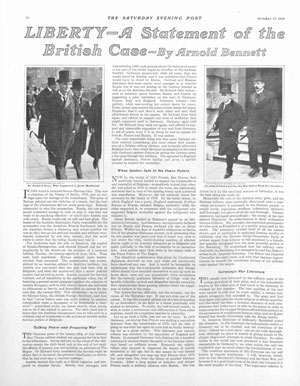
“The German military caste is thorough. On the one hand it organizes its transcendently efficient transport, if sends its armies into the field with both gravediggers and postmen, it breaks treaties, it spreads lies through the press, it lays floating mines, it levies indemnities, it forces foreign time to correspond to its own, and foreign news-papers to appear in the German language; and on the other hand it fires from the shelter of the white flag and the Red Cross flag, it kills wounded, even its own, and shoots its own drowning sailors in the water, it hides behind women and children, it tortures its captives, and when it gets really excited it destroys irreplaceable beauty. …
“If Germany triumphs, her ideal — the word is seldom off her lips — will envelop the earth, and every race will have to kneel and whimper to her: ‘Please may I exist?’ And slavery will be reborn; for under the German ideal every male citizen is a private soldier, and every private soldier is an abject slave — and the caste already owns 5 million of them. We have a silly, sentimental objection to being enslaved. We reckon liberty — the right of every individual to call his soul his own — as the most glorious end. It is for liberty we are fighting. We have lived in alarm, and liberty has been jeopardized too long.”
Hoping to make an ally out of the United States, Bennett was careful to mention a book that had recently surfaced, written by a member of the German army’s staff. In “Operations Upon the Sea”, Franz Frieherr von Edelsheim proposed an eventual assault on America.
“Von Edelsheim … begins by stating that Germany cannot meekly submit to ‘the attacks of the United States’ forever, and that she must ask herself how she can ‘impose her will.’ He proves that a combined action of army and navy will be required for this purpose, and that about four weeks after the commencement of hostilities German transports could begin to land large bodies of troops at different points simultaneously. Then, “by interrupting their communications, by destroying all buildings serving the state, commerce and defense, by taking away all material for war and transport, and lastly by levying heavy contributions, we should be able to inflict damage on the United States.” Thus in New York the new City Hall, the Metropolitan Museum and the Pennsylvania railway station, not to mention the Metropolitan Tower, would go the way of Louvain [a Belgian town where Germans burned, looted, and shot civilians], while New York business men would gather in Wall Street humbly to hand over the dollars amid the delightful strains of ‘The Watch on the Rhine.’ [A rousing German song from the 1850s, which asserted that the Rhine river must always remain German. It became an unofficial theme song for militant German nationalists during both world wars.]”
New Factors in War
By Samuel G. Blythe
In this report, Blythe observed several developing trends in the ancient art of war. Not only was the horse being replaced but soon airships would be bombing Paris and London. Even more ominous were the reports that France had developed a lethal gas for use on the battlefield. (The first poison gas attack on the Western Front was launched by the Germans in January 1915).
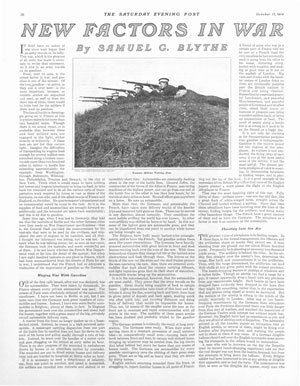
“It has been an axiom of war since wars began that an army travels on its belly. This war, which is the greatest of all wars, has made it necessary to revise that statement. As it now is, an army travels on its gasoline.
“Food, next to men, is the oldest factor in war, and gasoline is one of the newest. Of the two, gasoline—or petrol, as they call it over here — is the more important, because, as modern armies are organized and used, as well as from the sheer size of them, there would be little food for the soldiers if there were no gasoline.
“No staff officer goes anywhere on a horse. He uses an automobile. More than that, the Germans, and presumably the French, have taken auto delivery trucks of the heavier type and mounted field guns on them. These can be moved in any direction almost instantly. They constitute the most mobile artillery the world has ever known. In other wars artillery was shifted by horse or by hand. In this war some of the lighter guns are automobile guns, and they can be transferred from one point to another while horses are being brought up.
“I was told that a Frenchman had invented [a] identical gas that the imaginations of various novelists have invented for use in war fiction — a gas that is so frightful in its effect that when it is liberated all human beings and all living things within a large radius are instantly asphyxiated.
“I was told further that the French Government had the secret of the composition of this gas; that it had been proved out on sheep and cattle — that, at about the time I heard of it, a shell containing it was dropped two hundred feet from a flock of sheep, and that the sheep died instantly when the gas reached them.”
Step into 1914 with a peek at these pages from The Saturday Evening Post 100 years ago.

